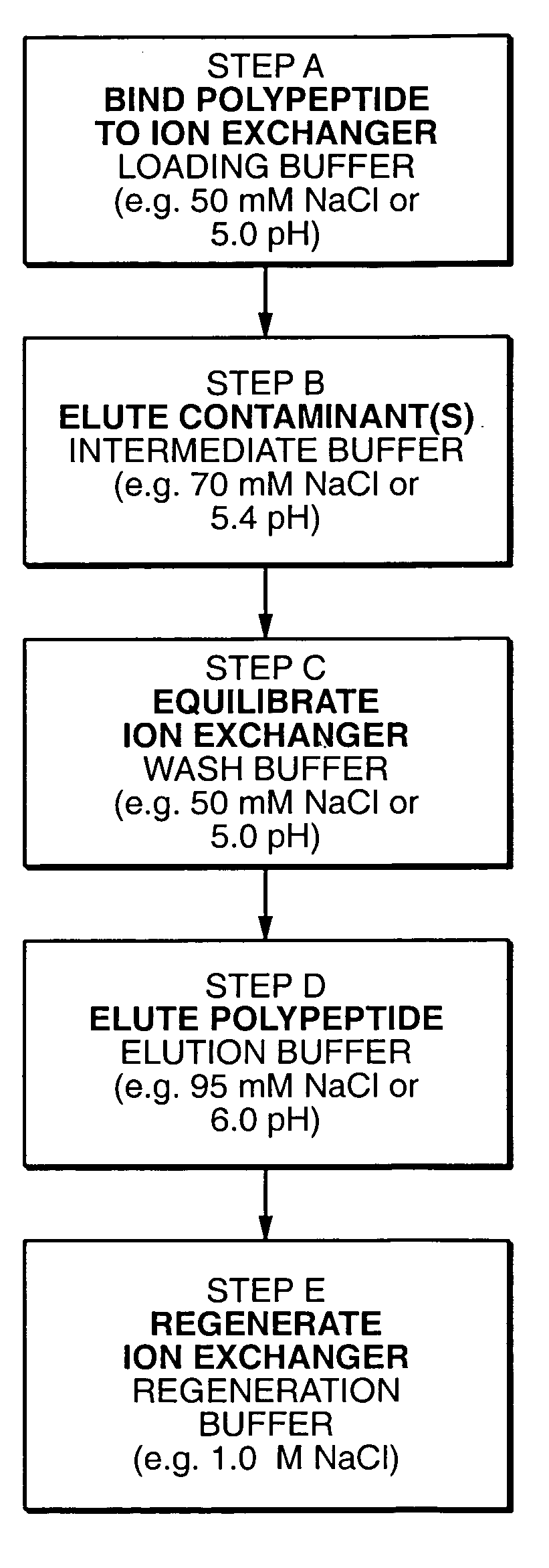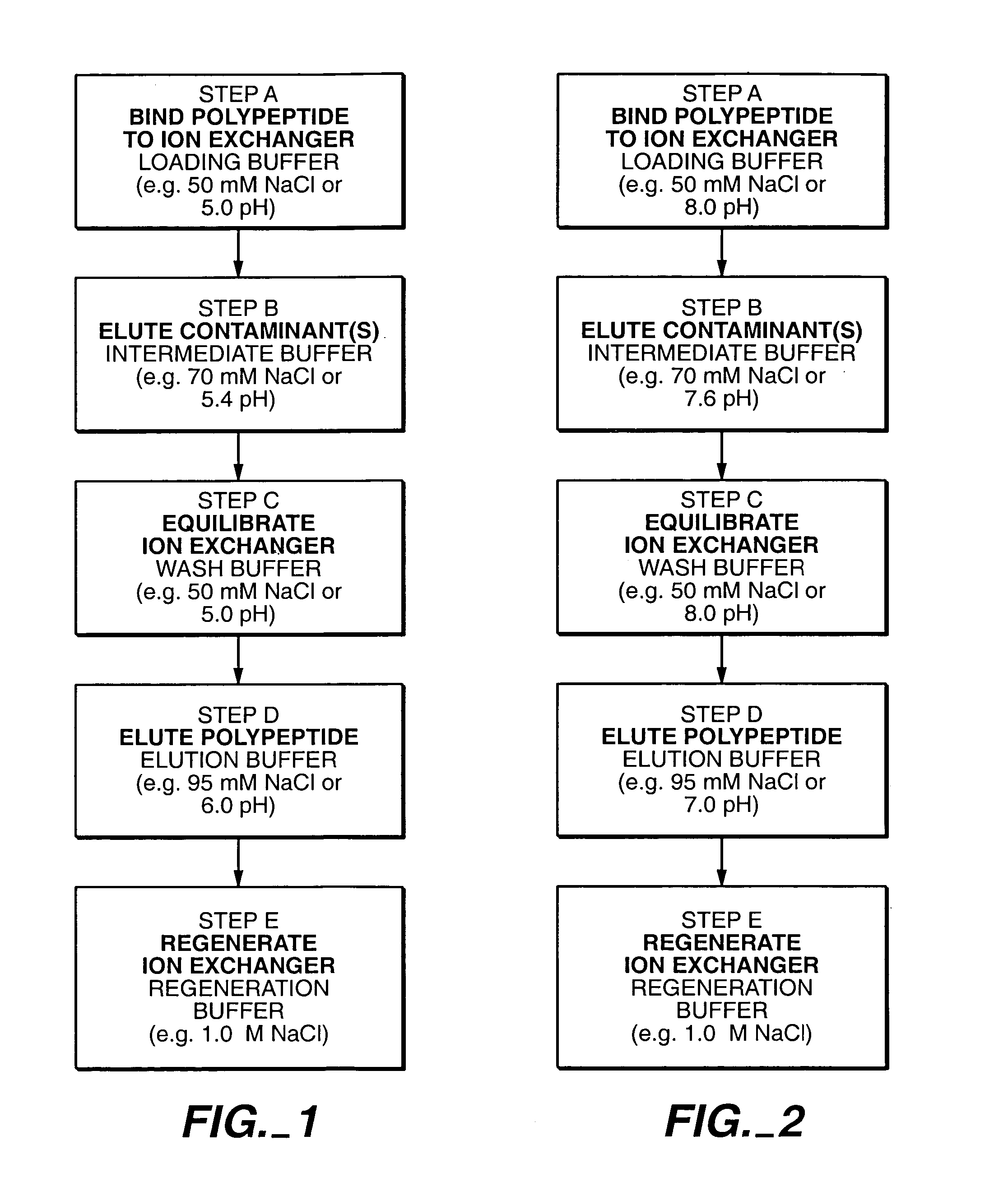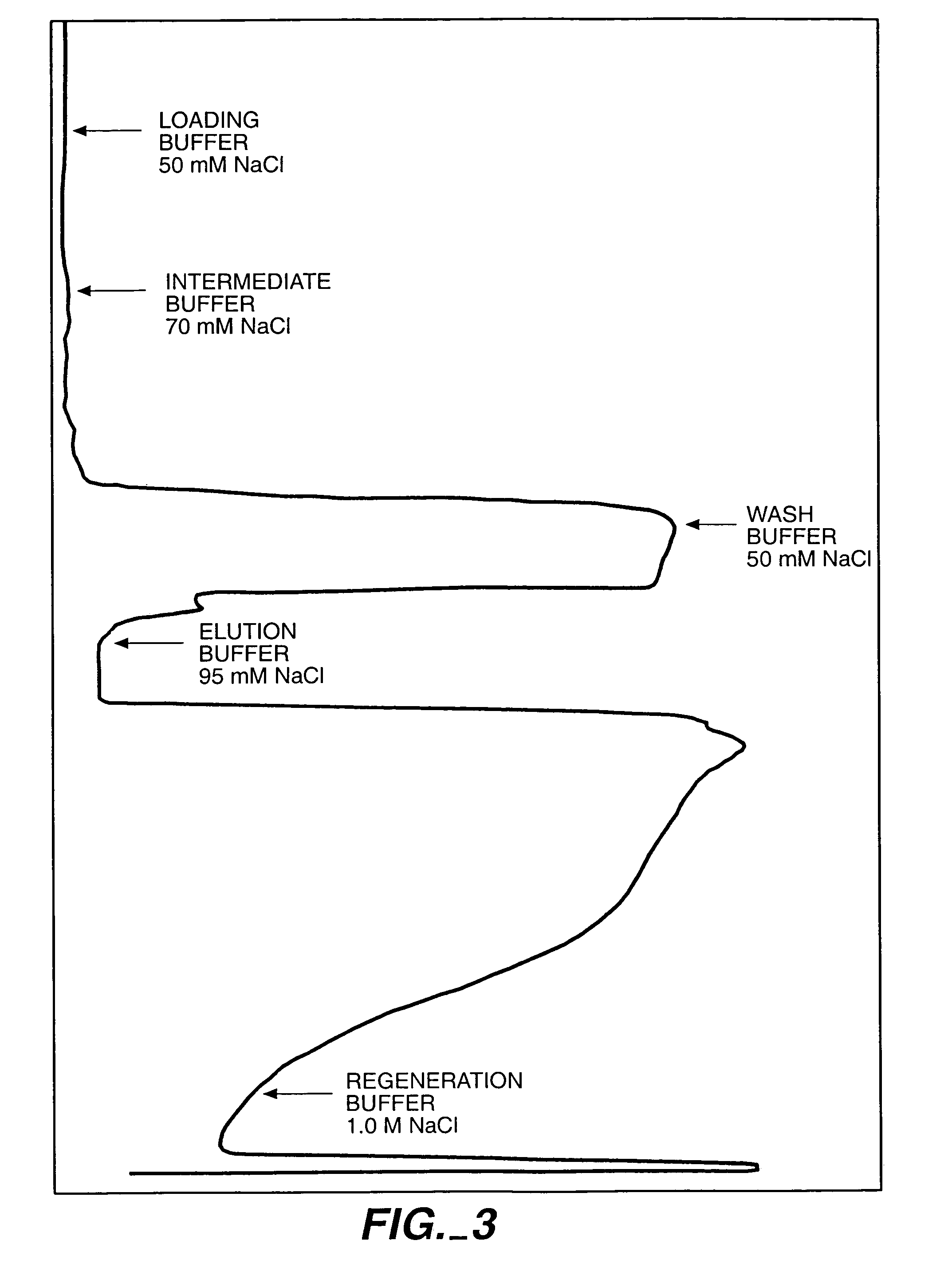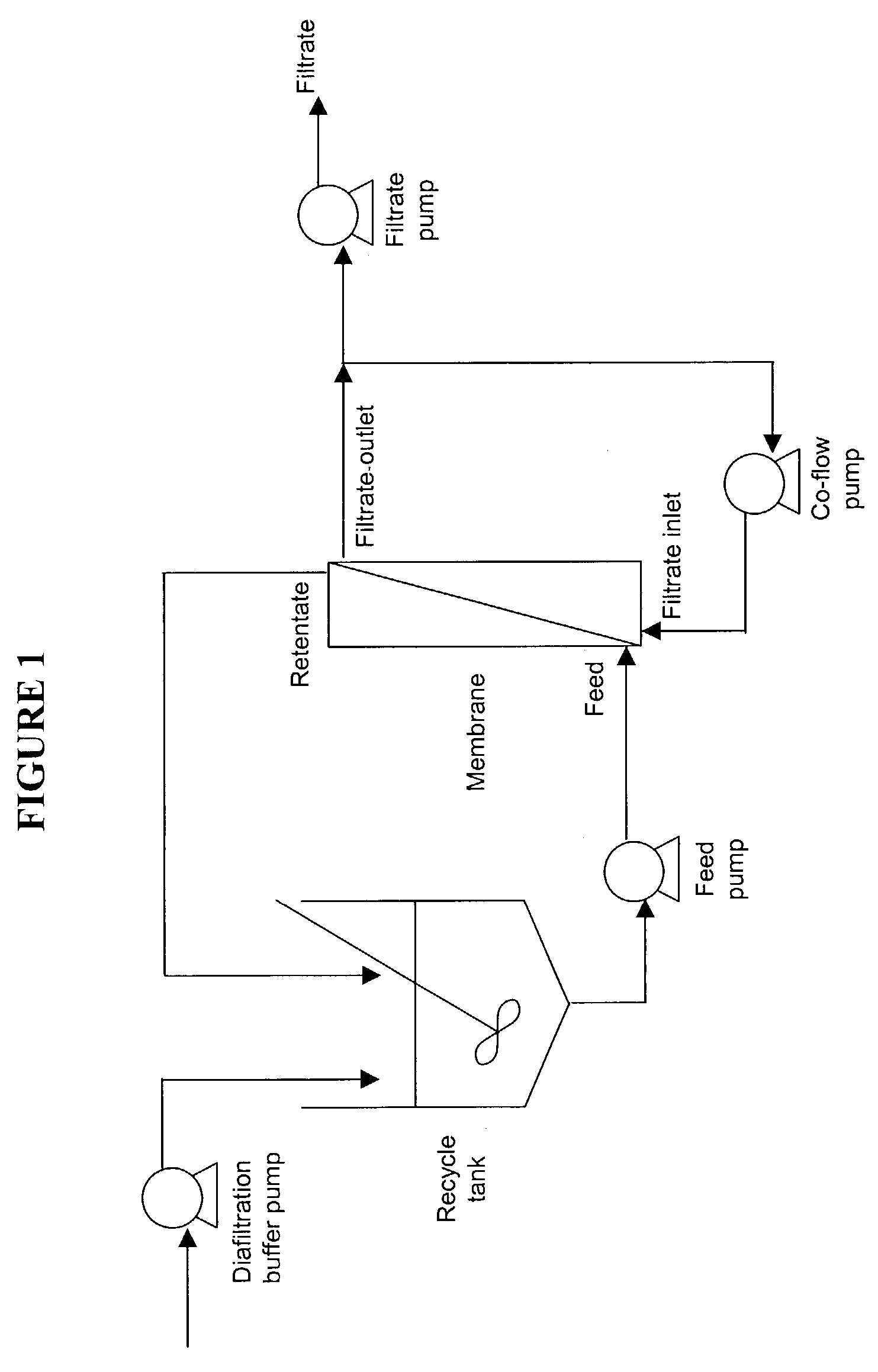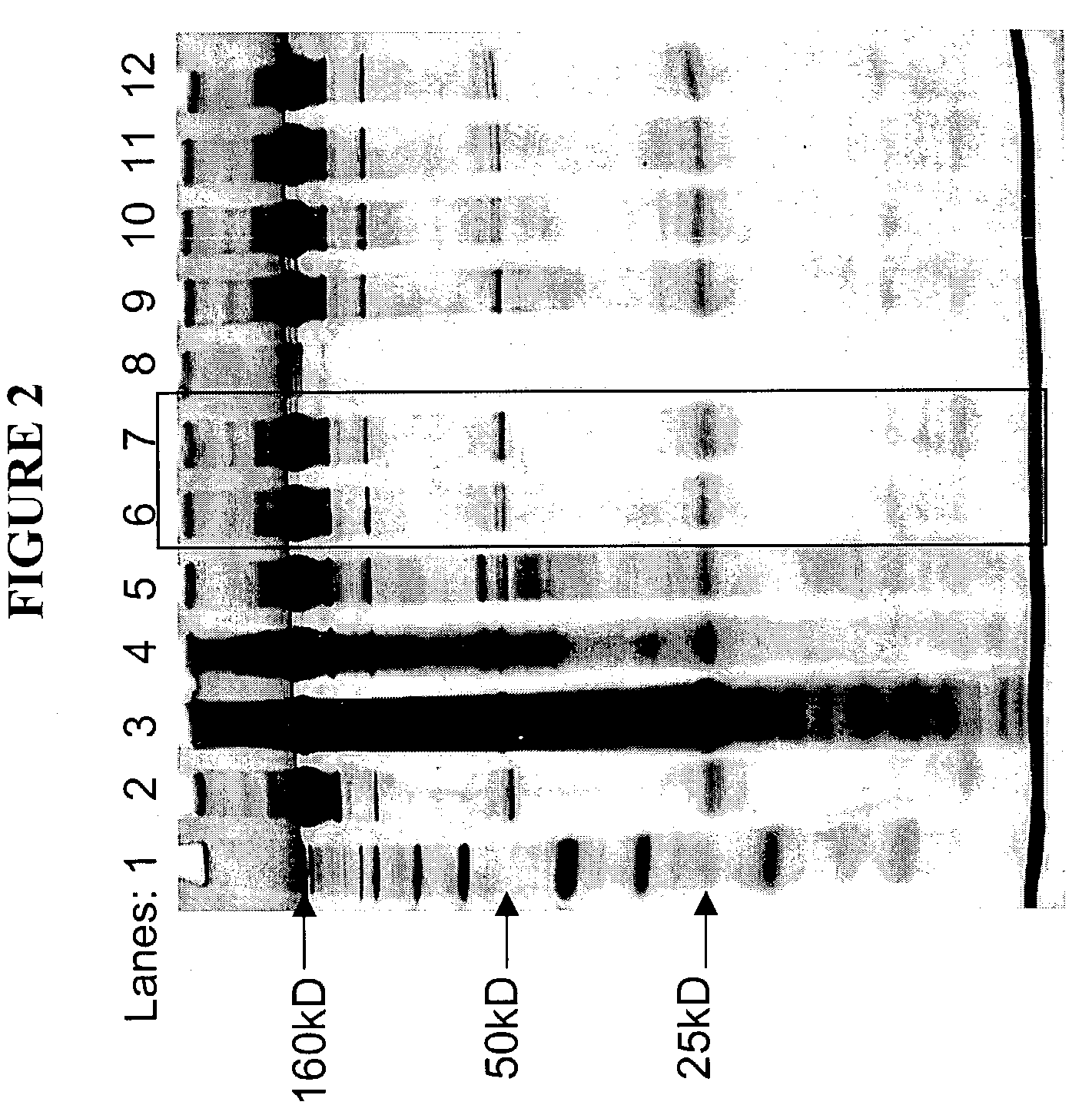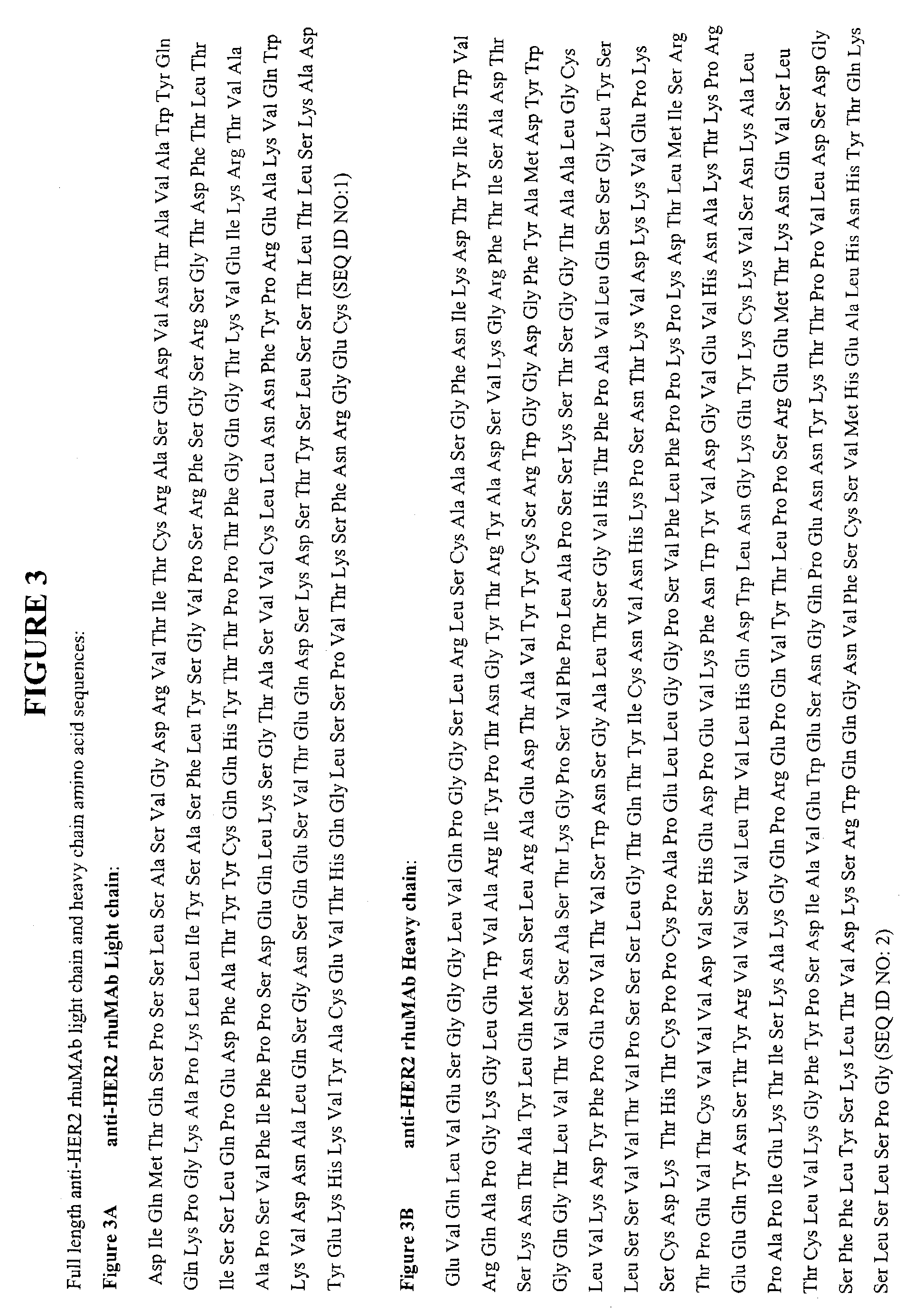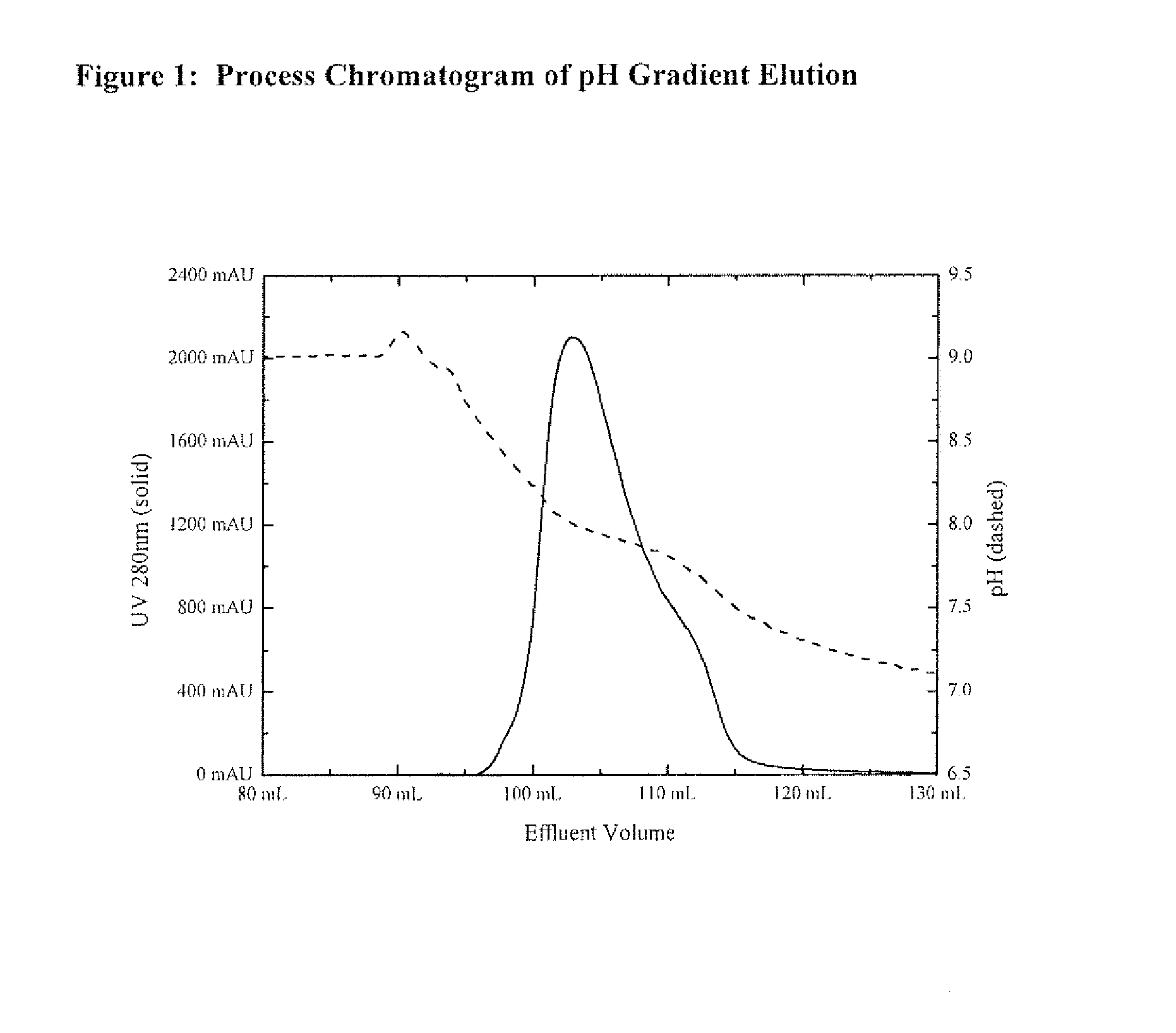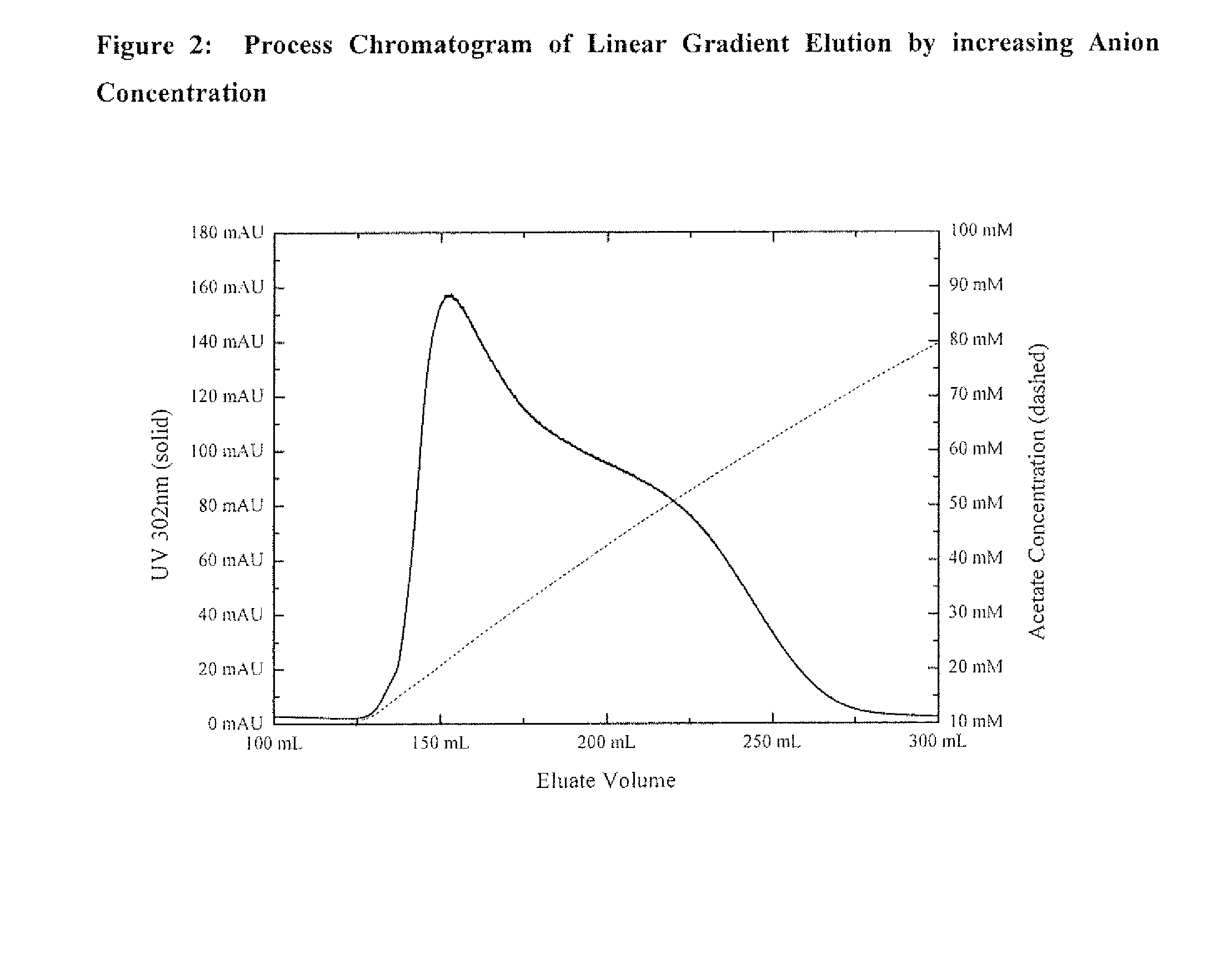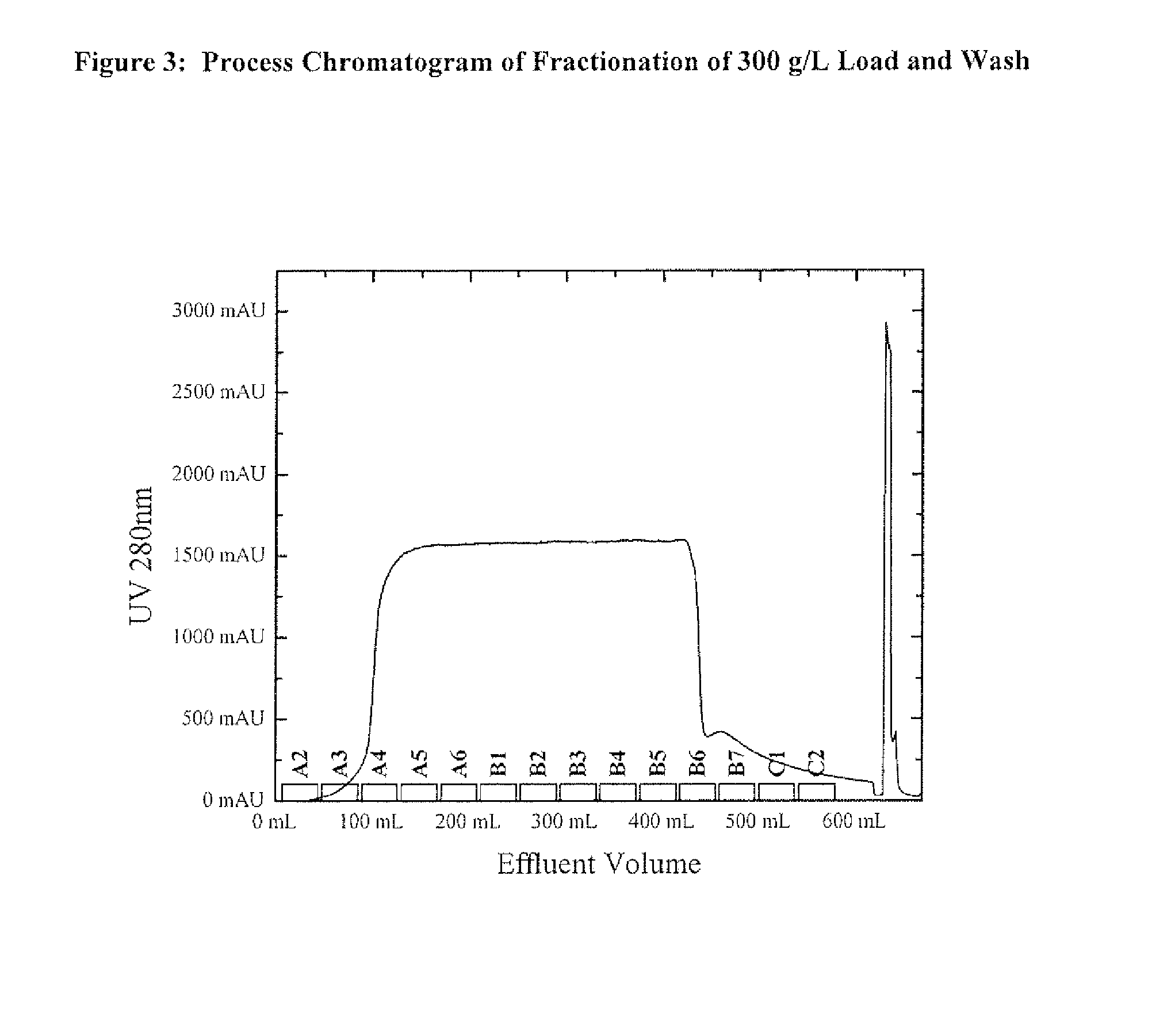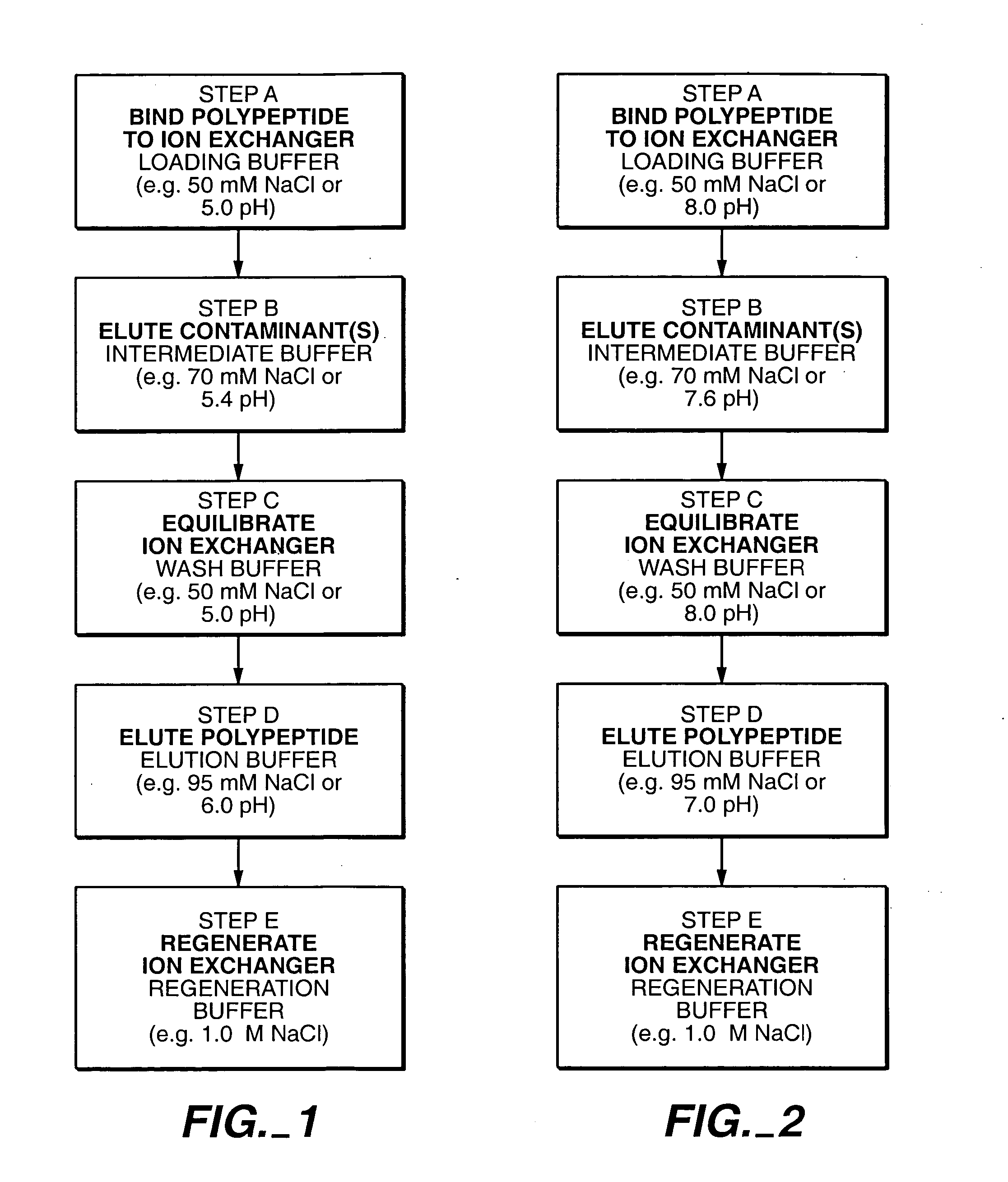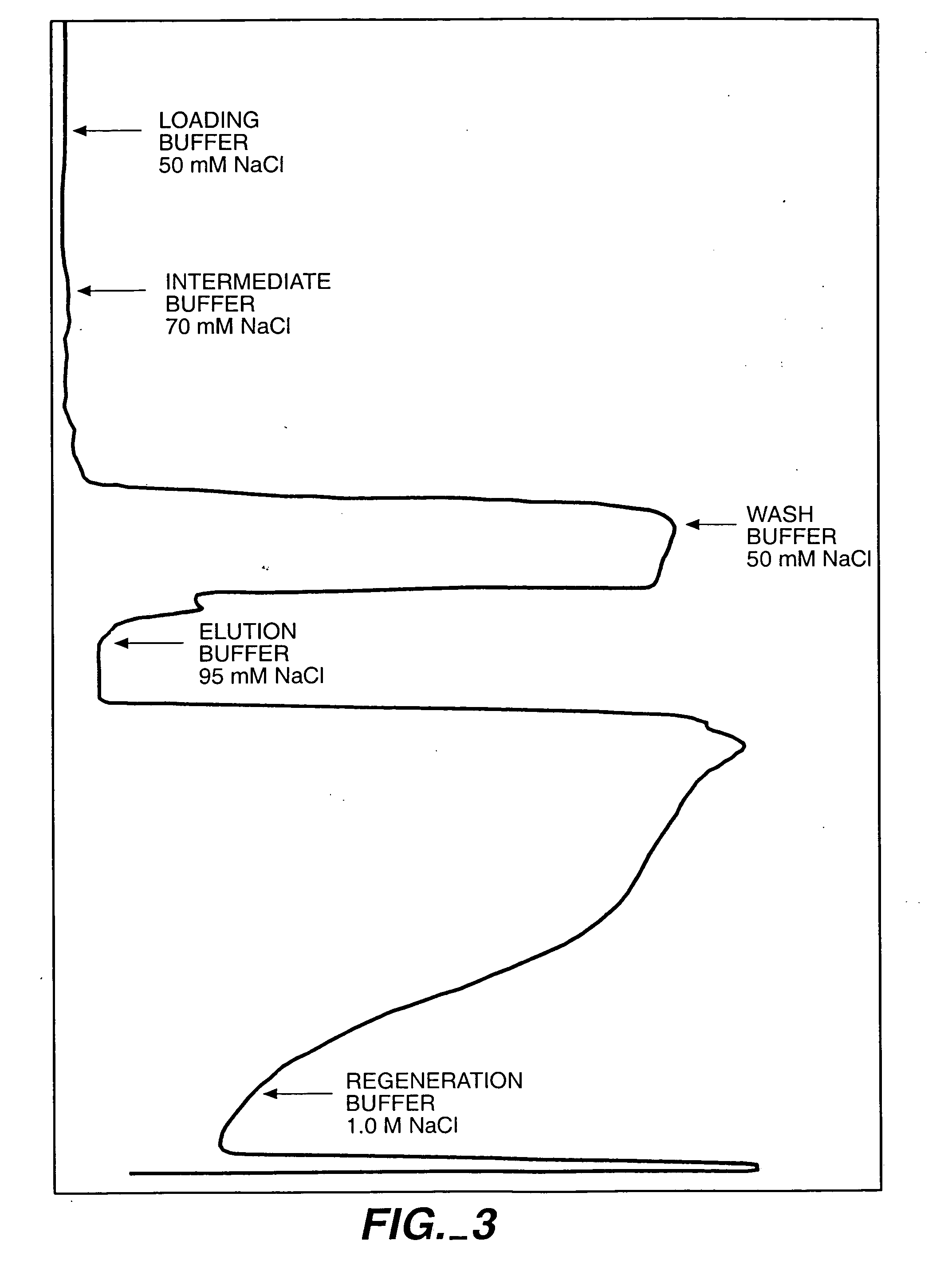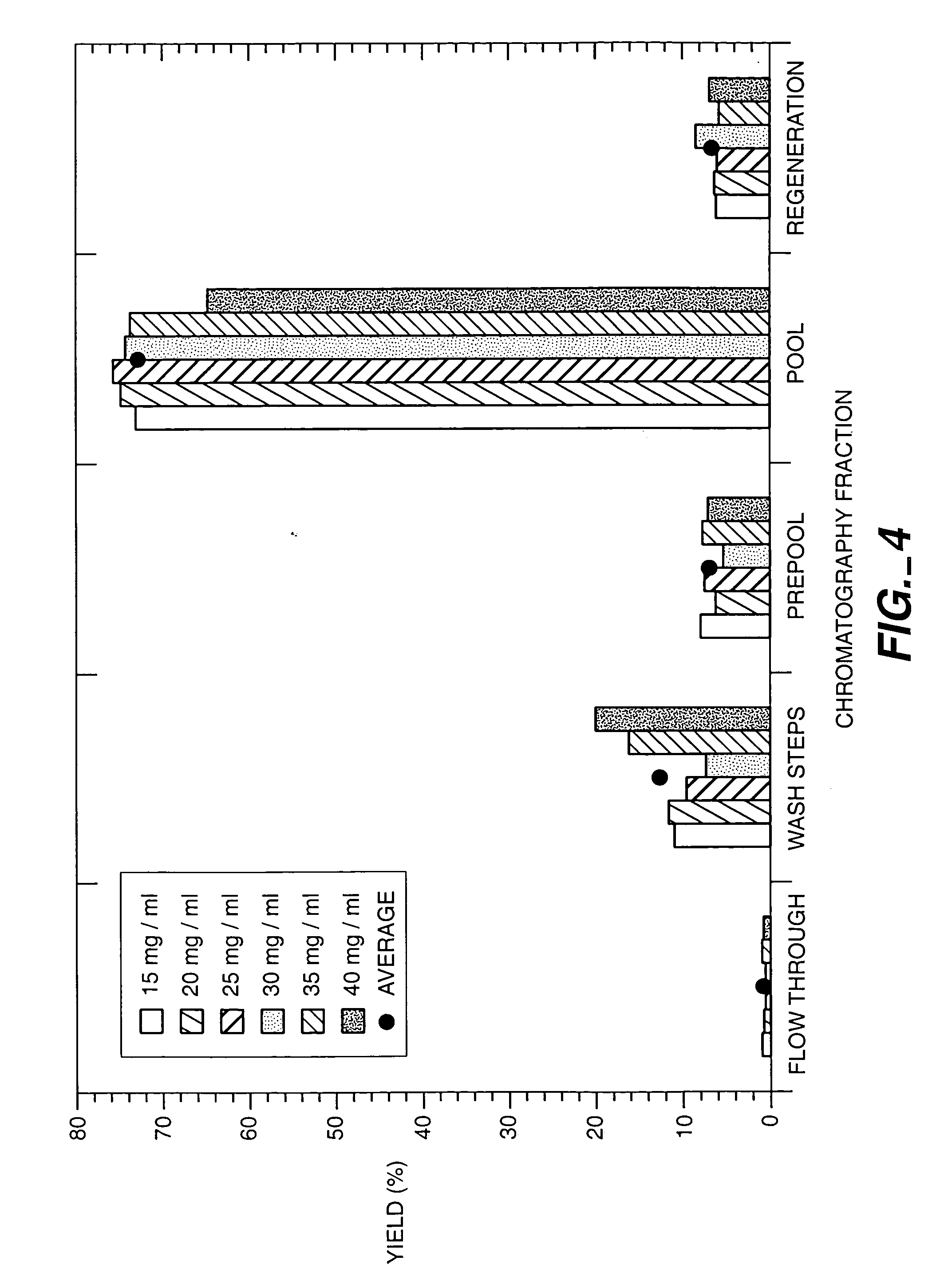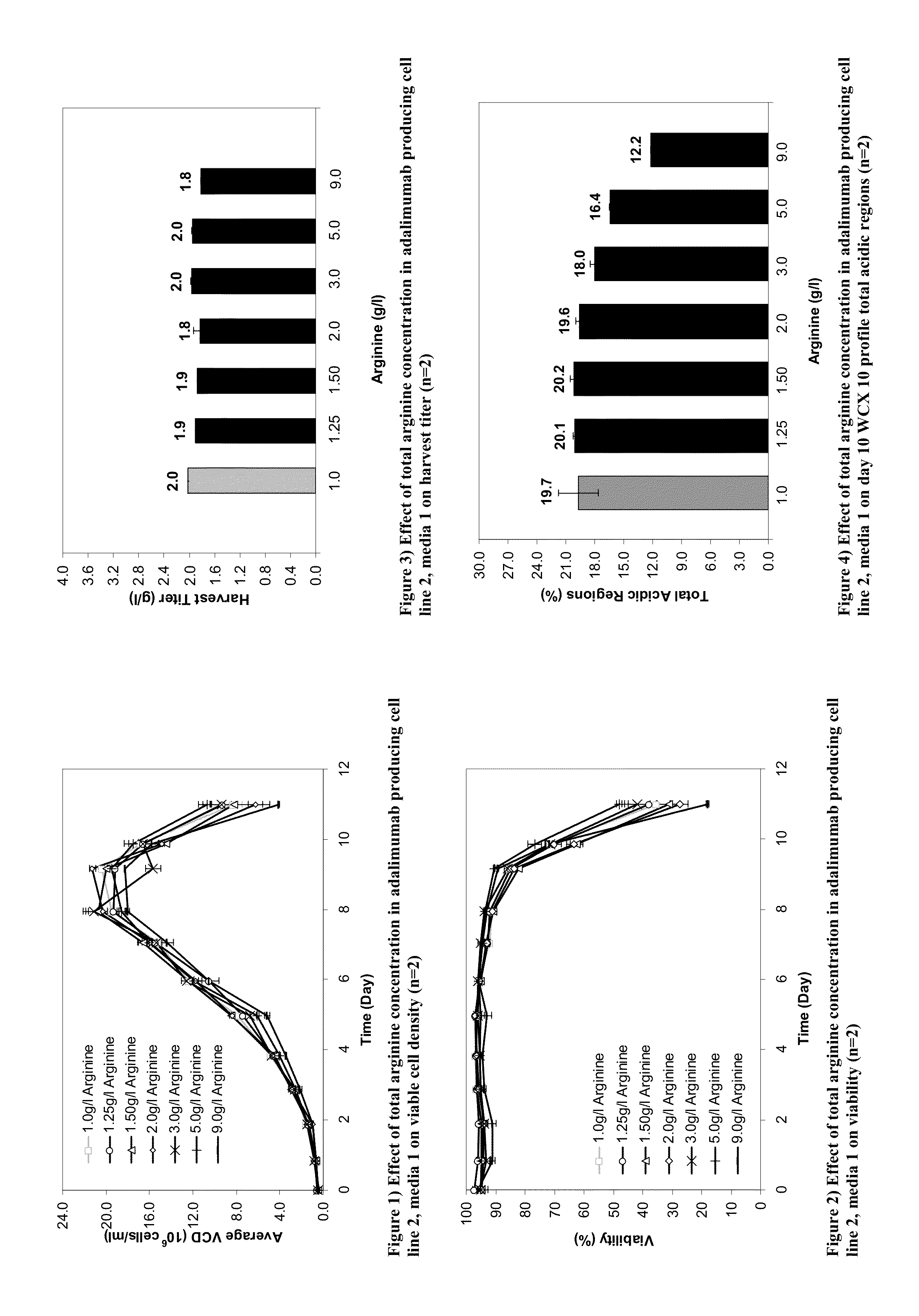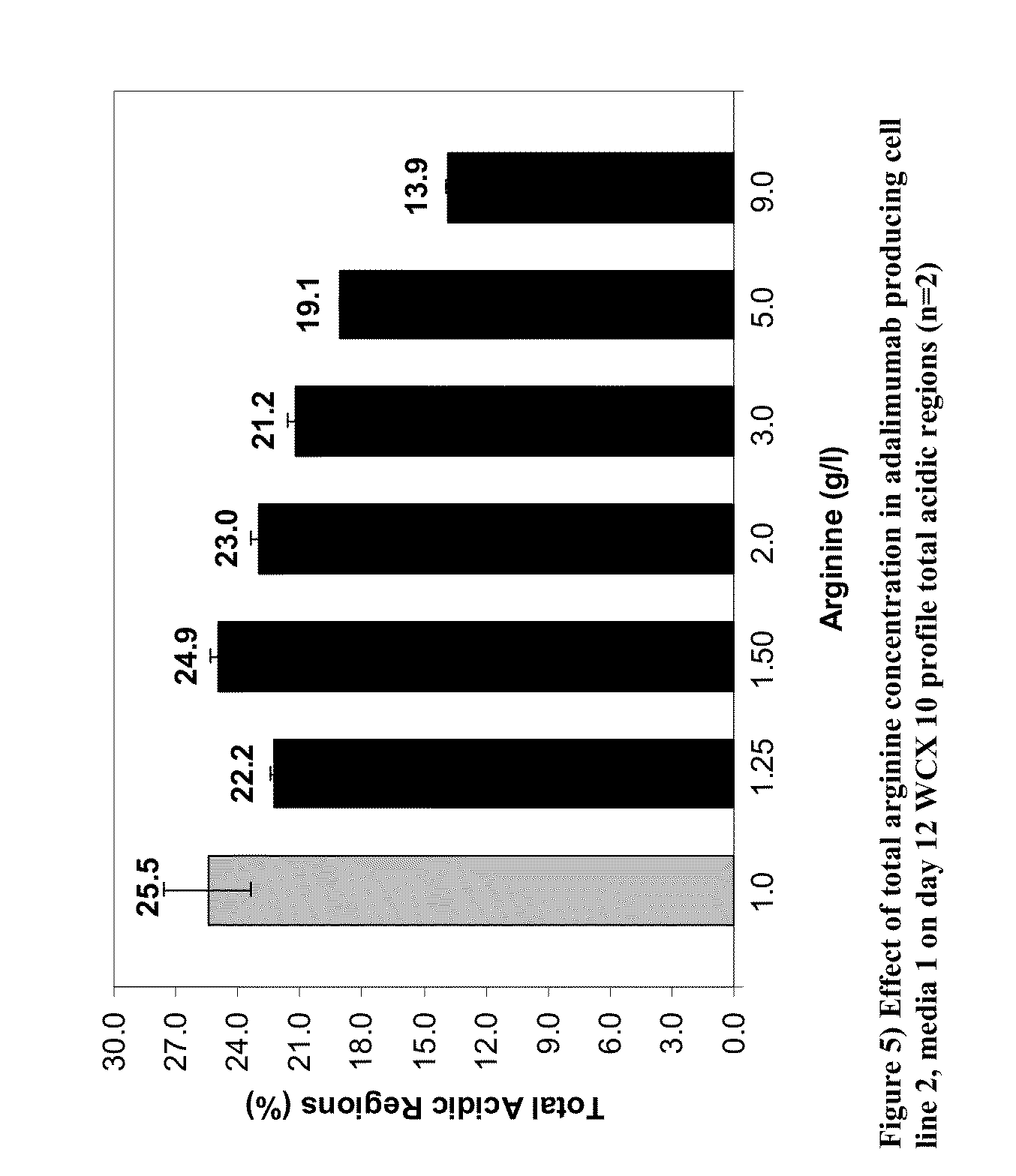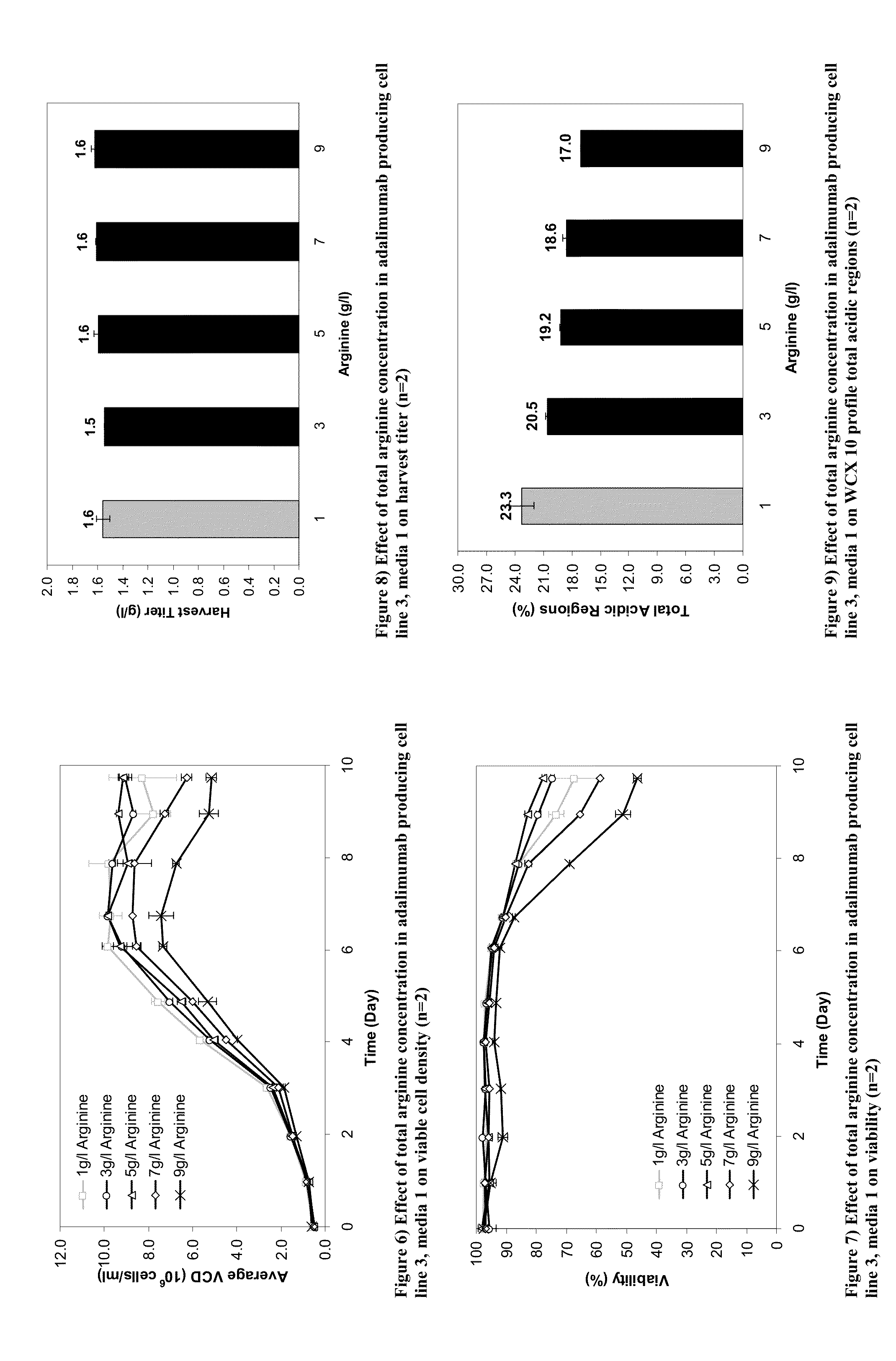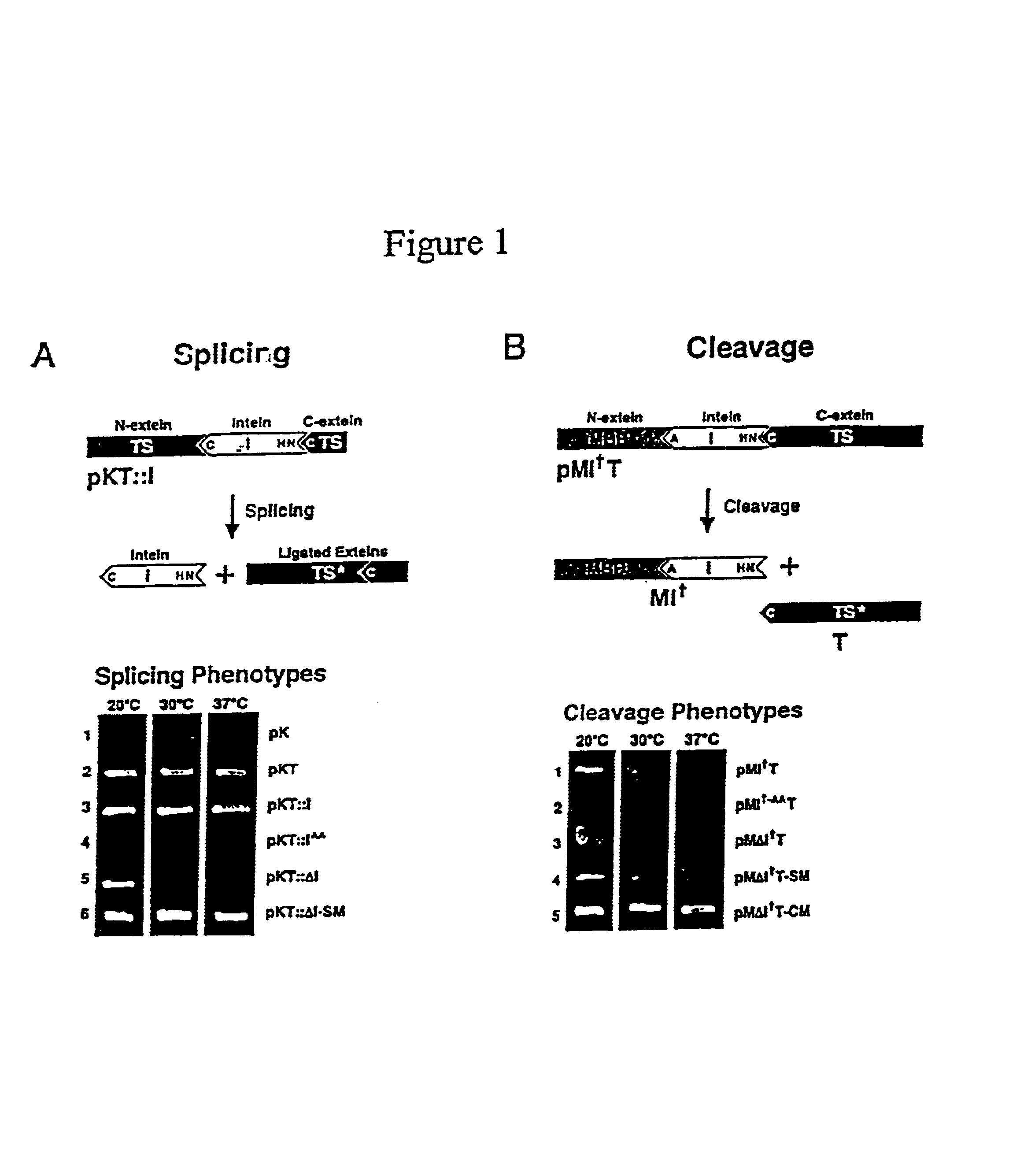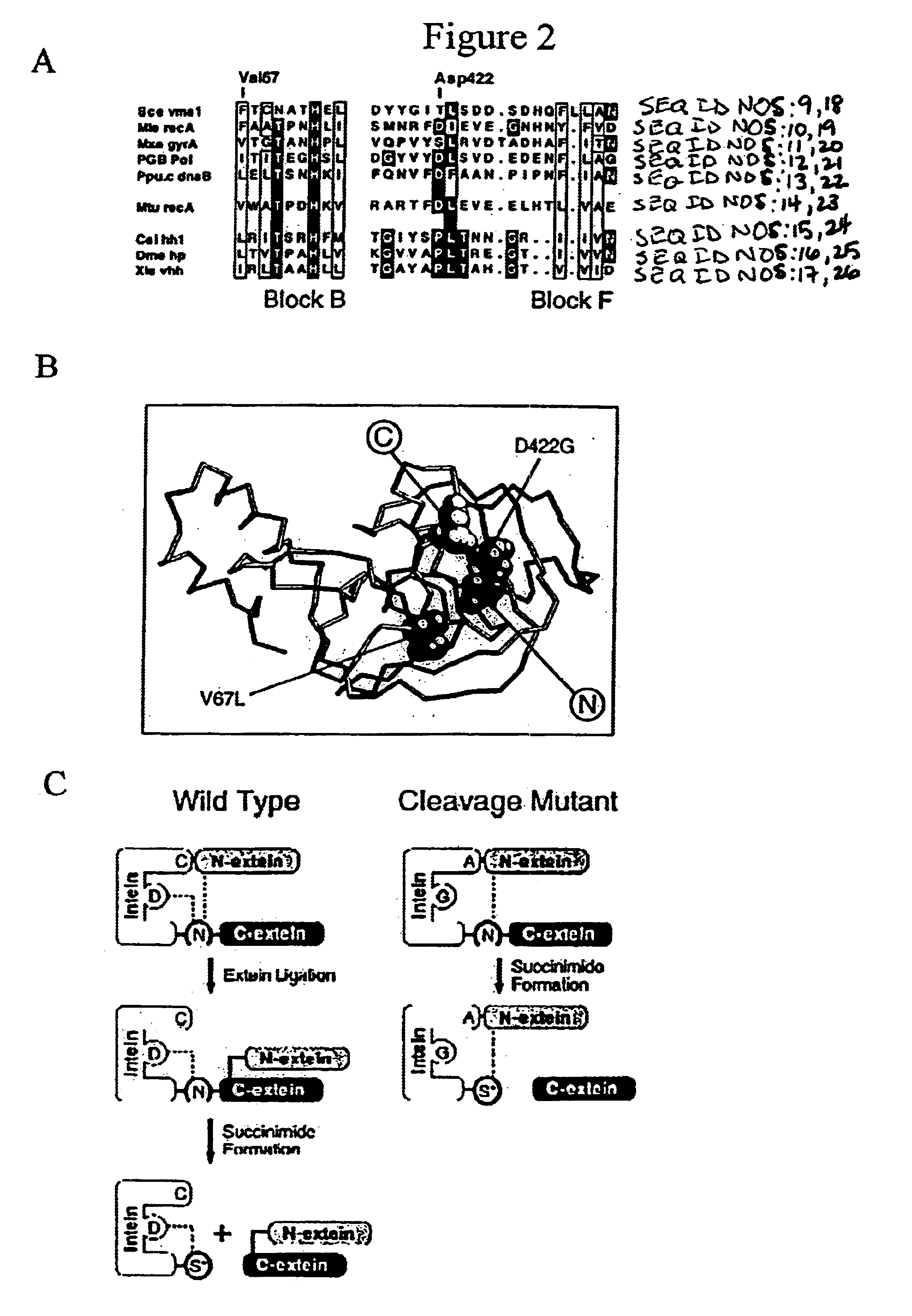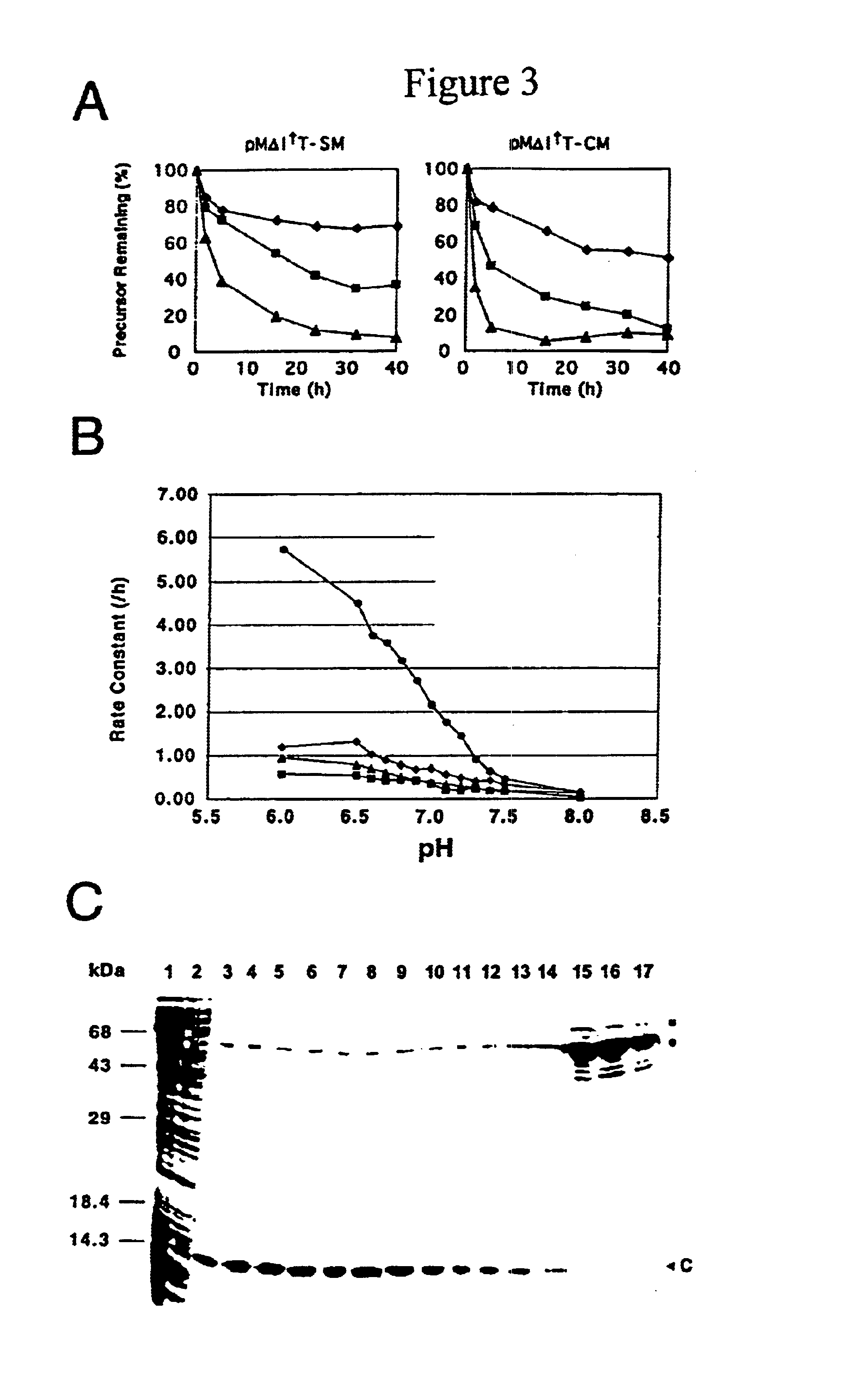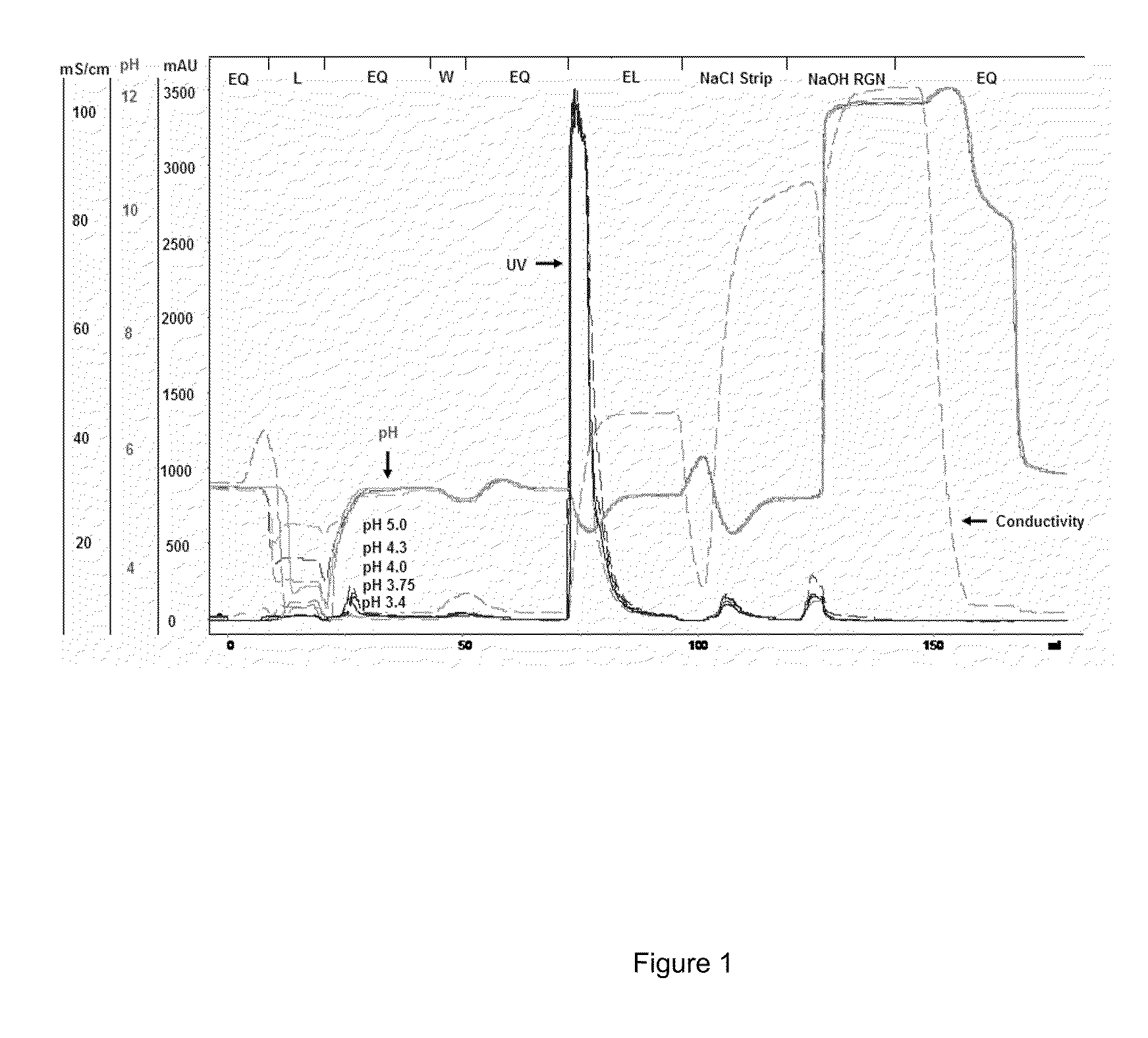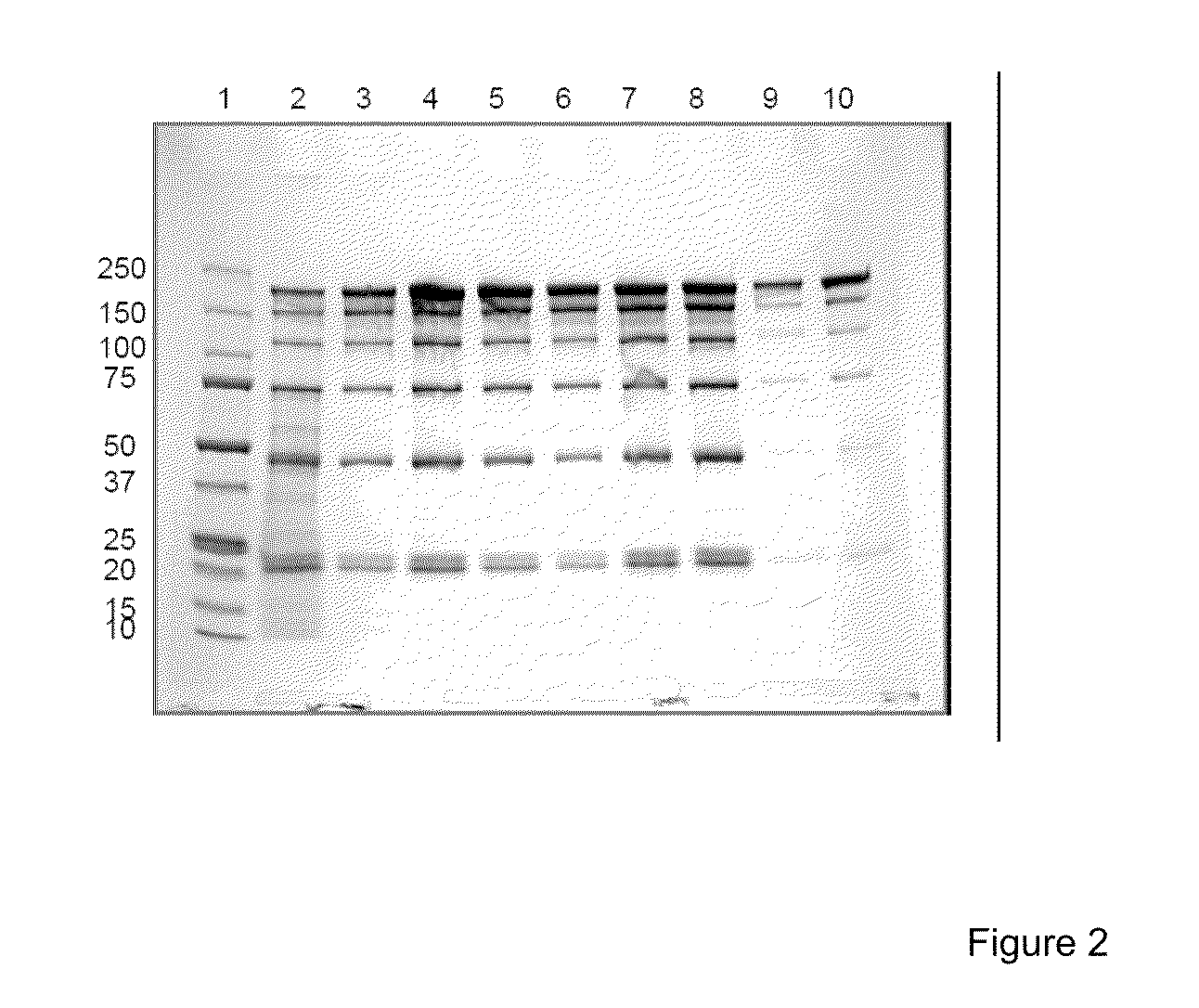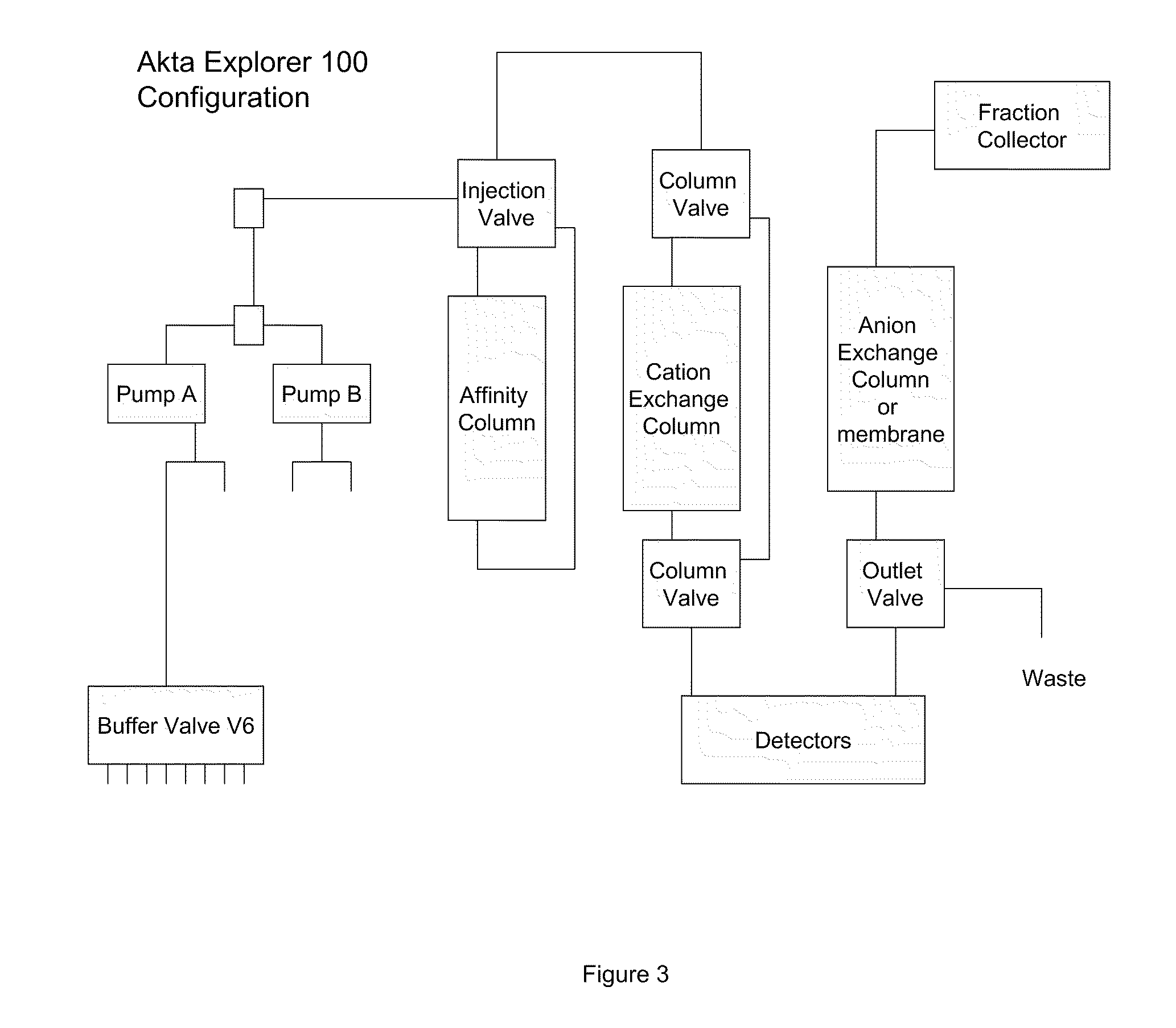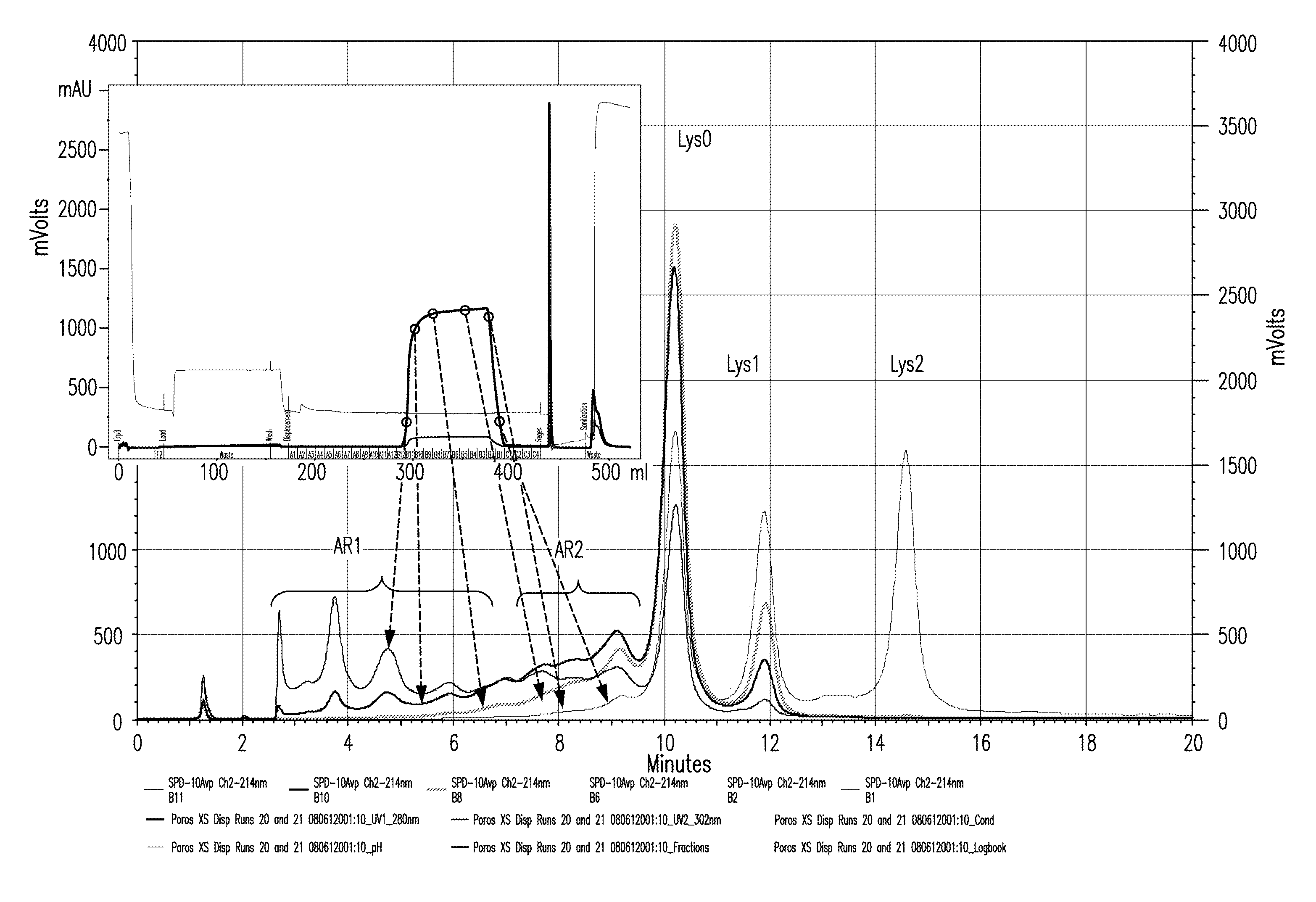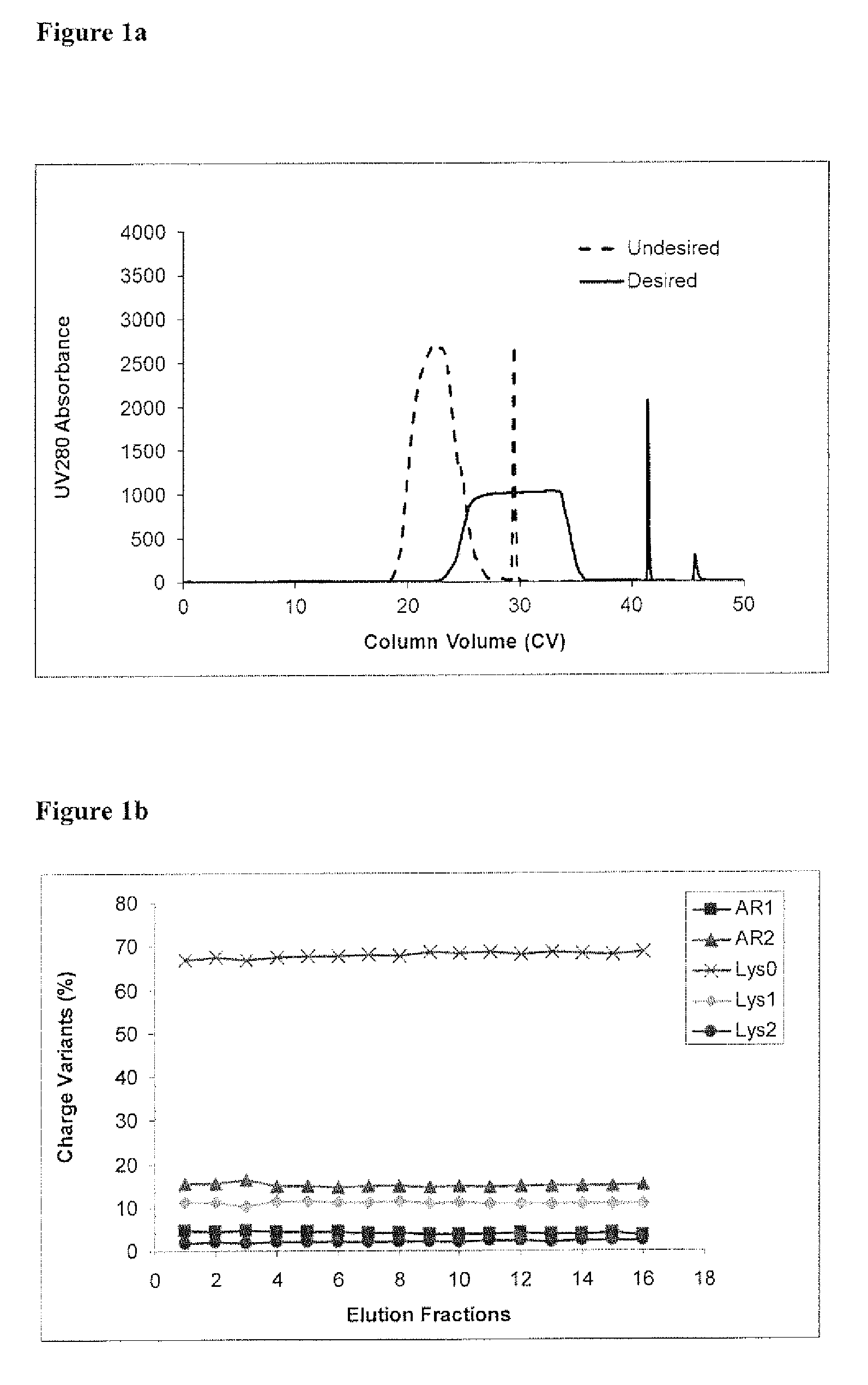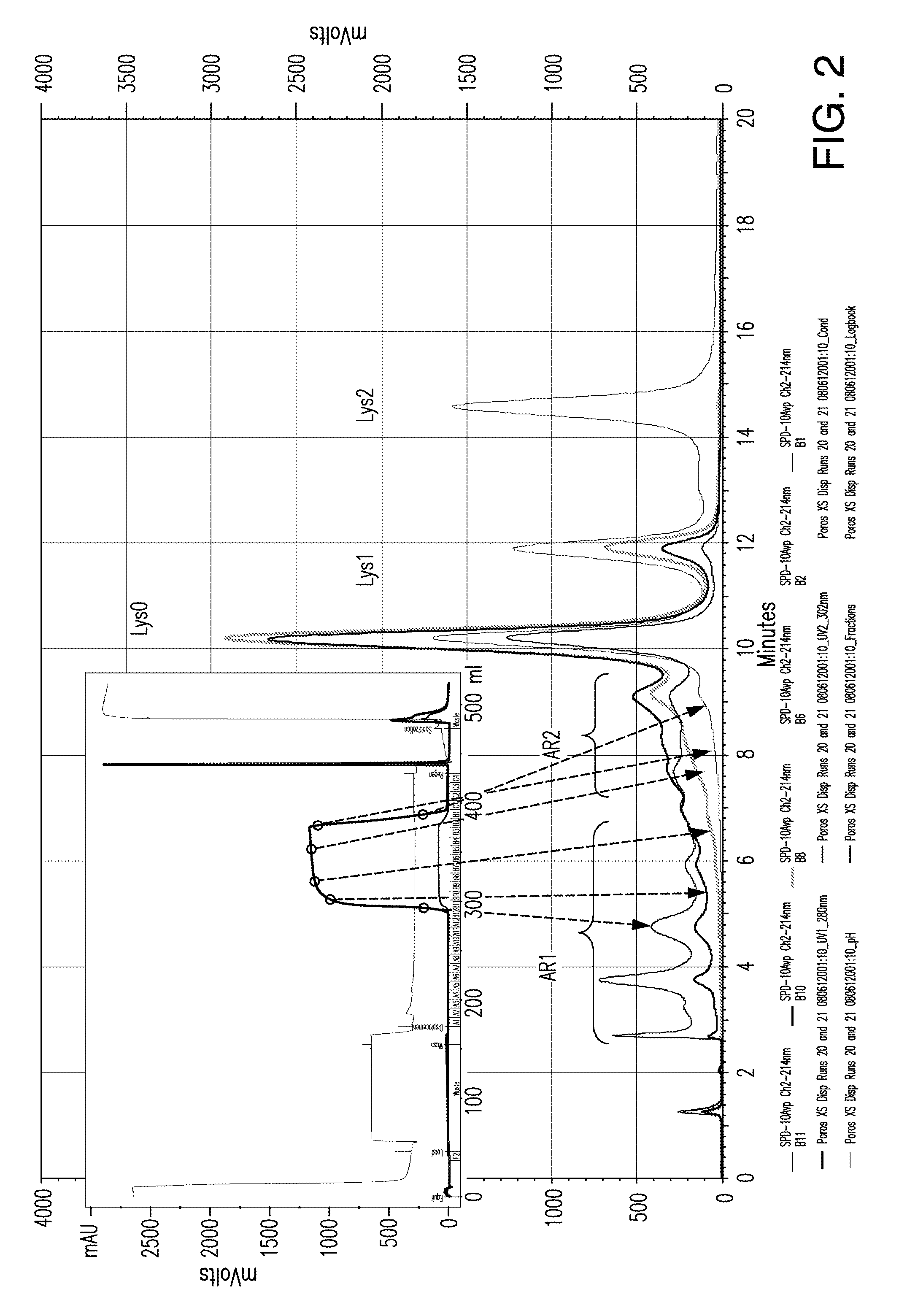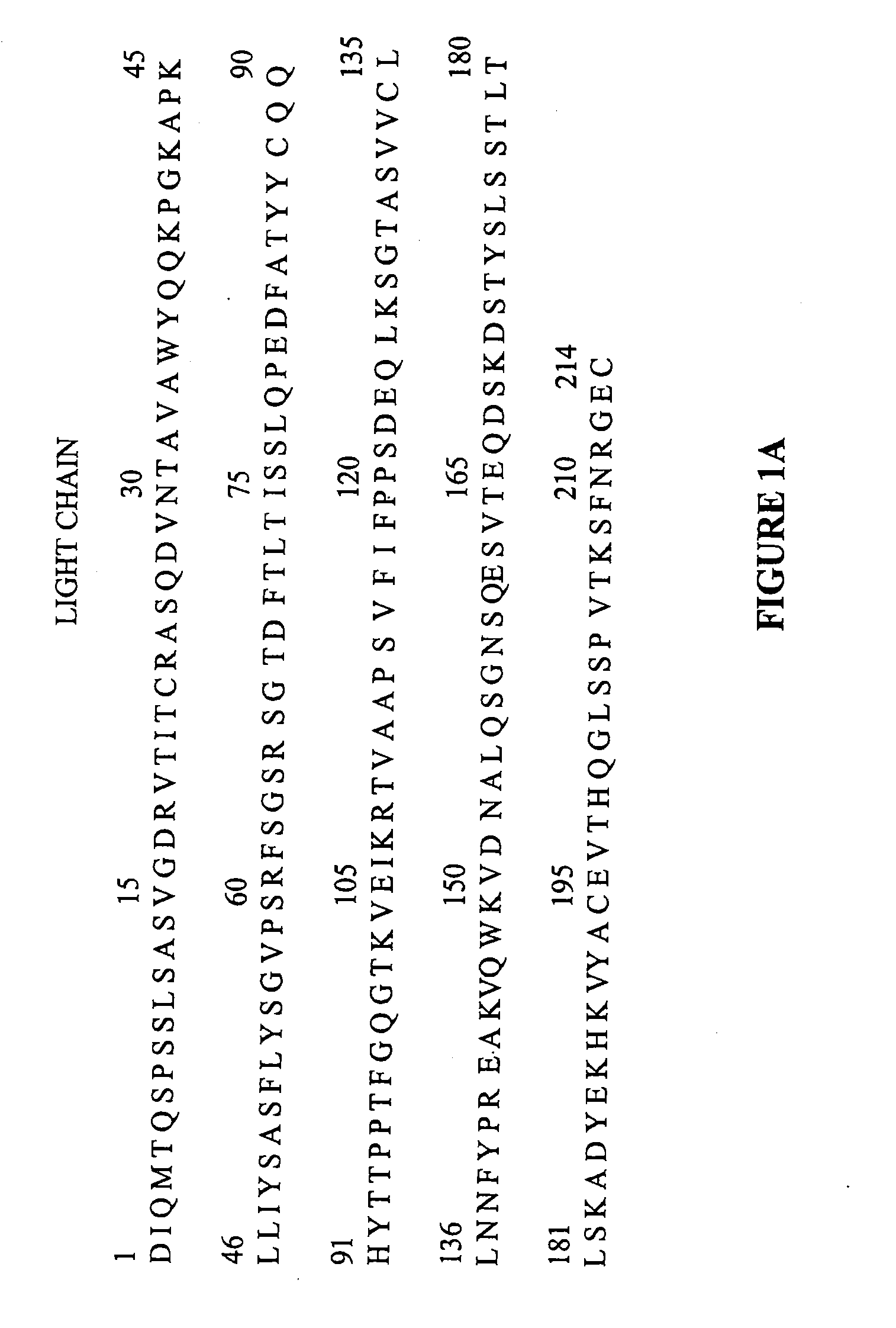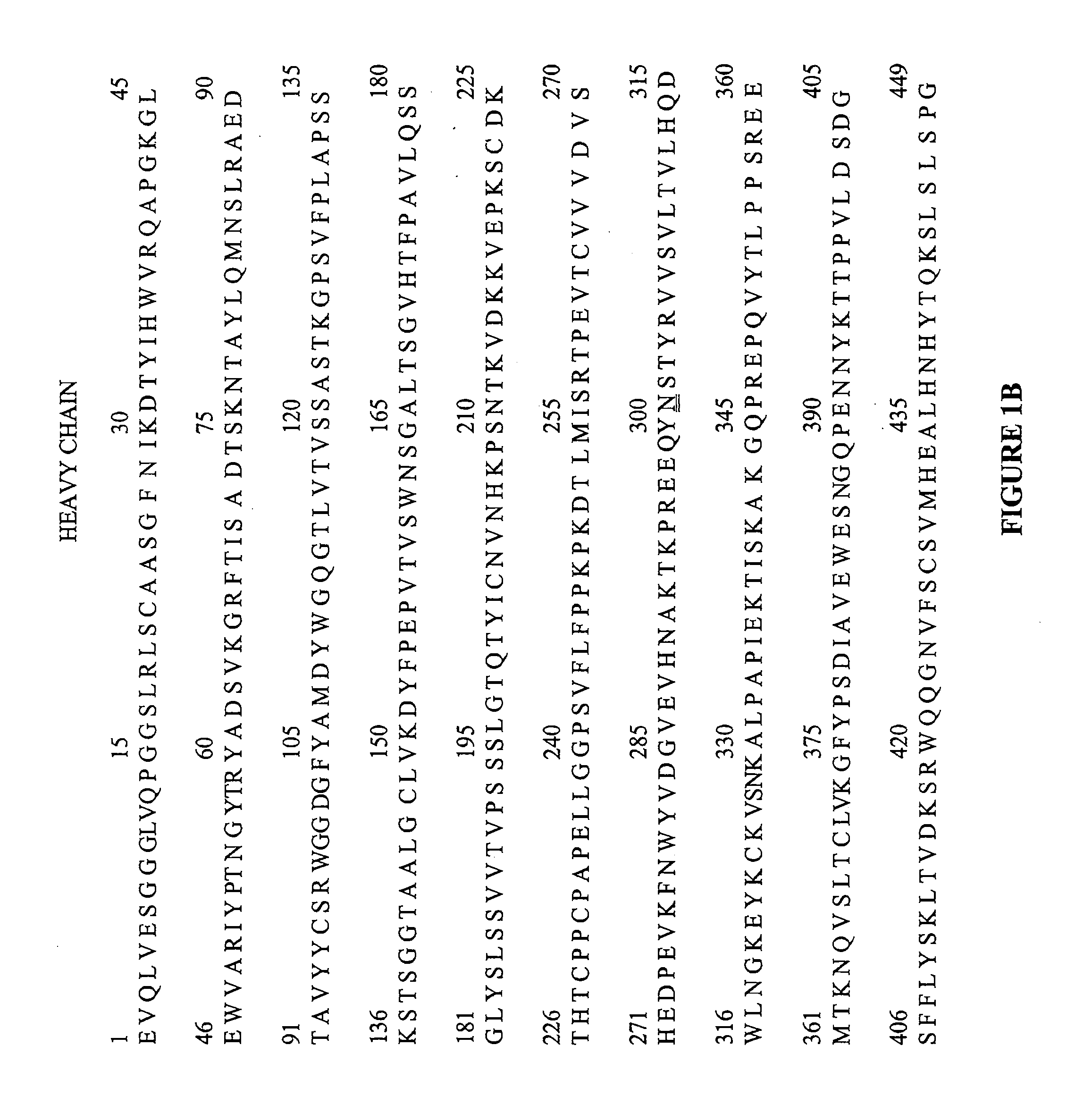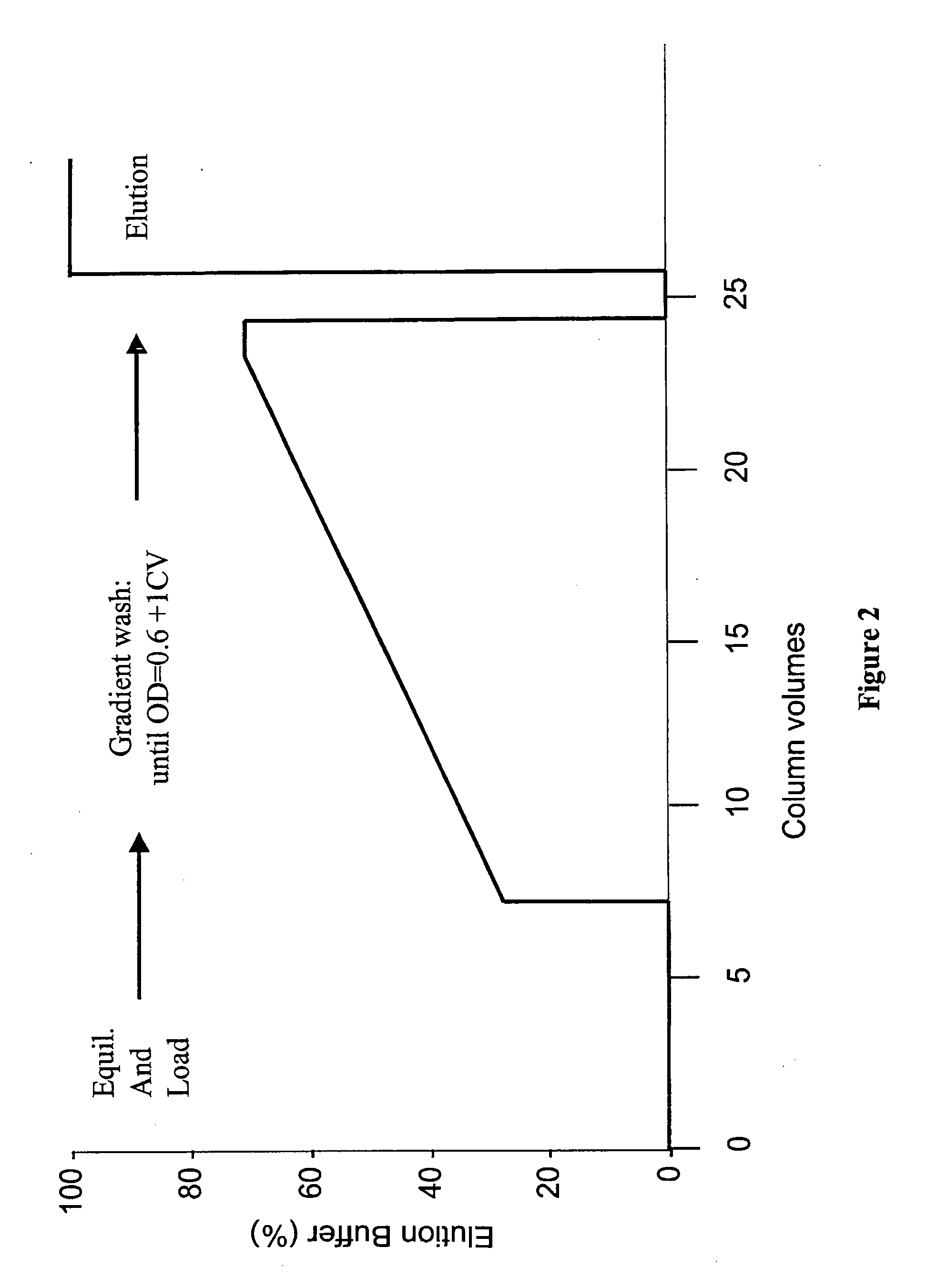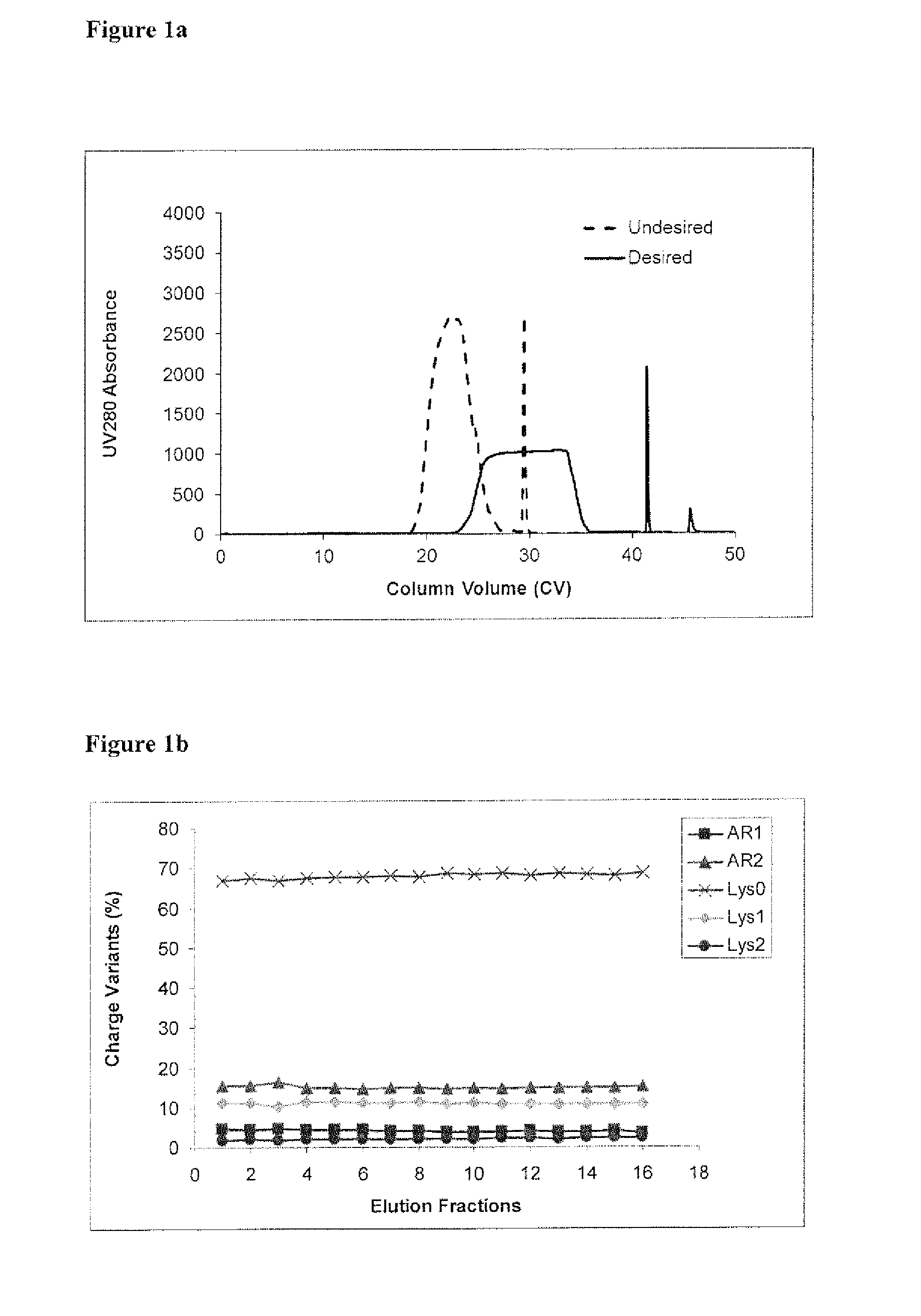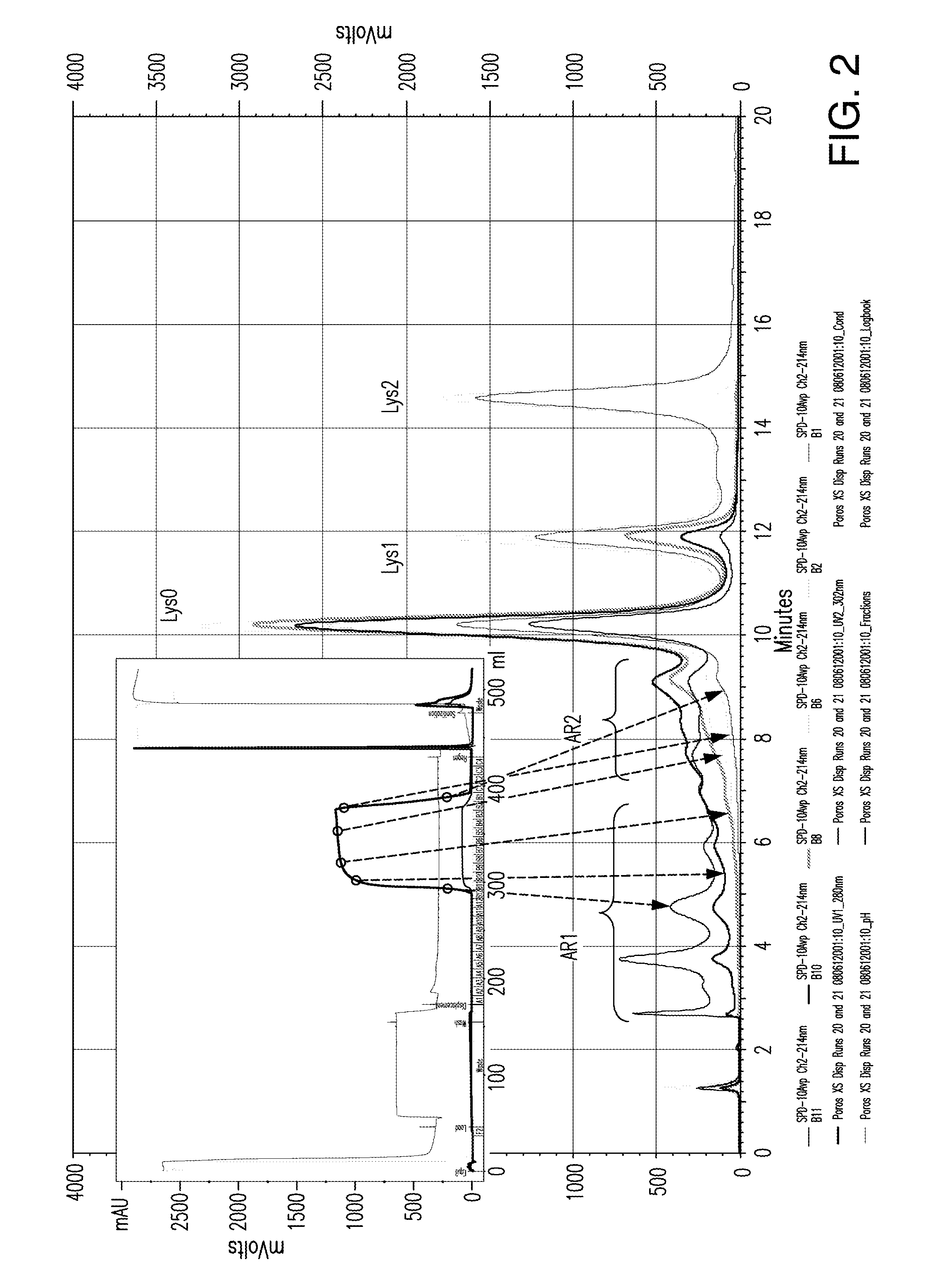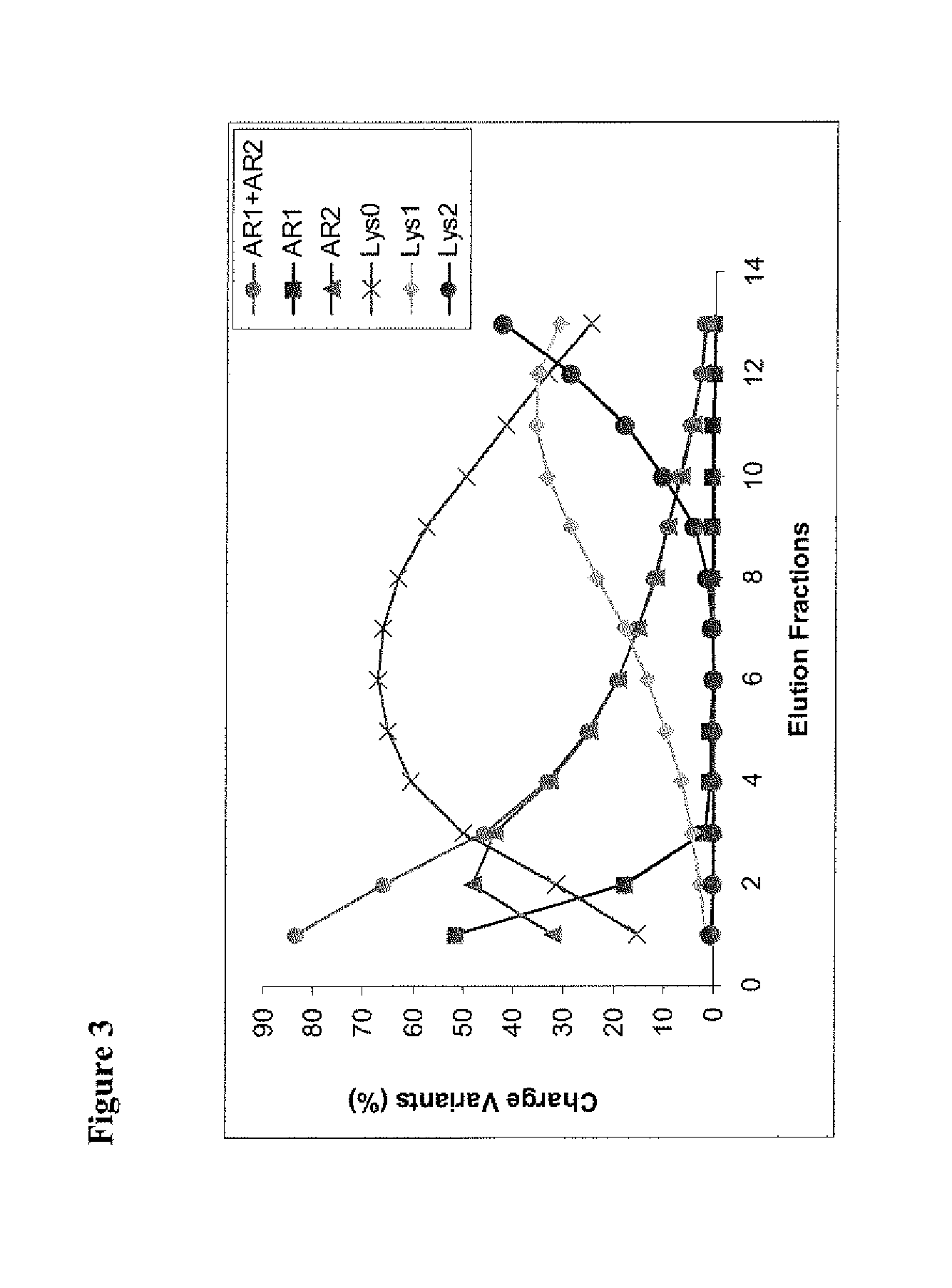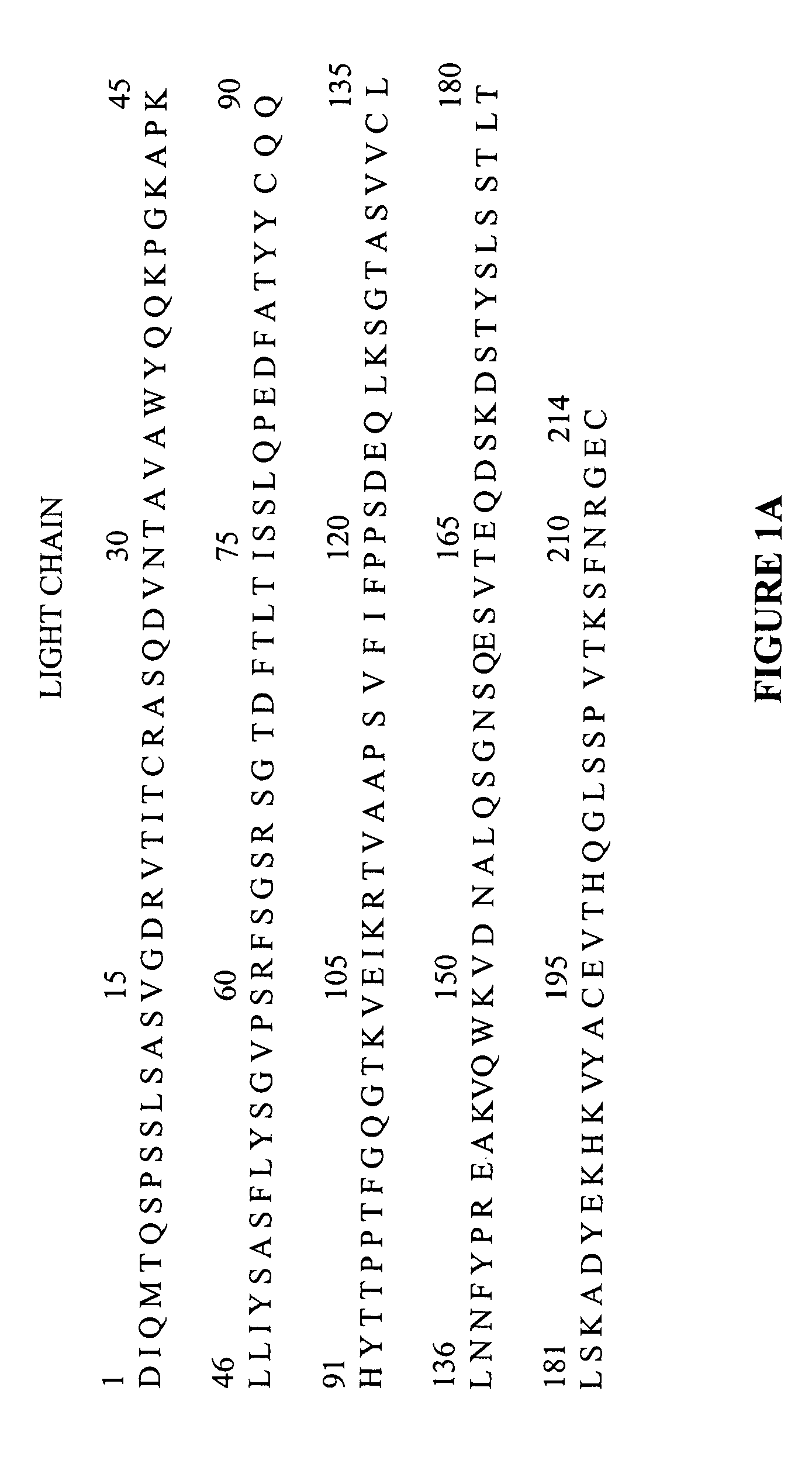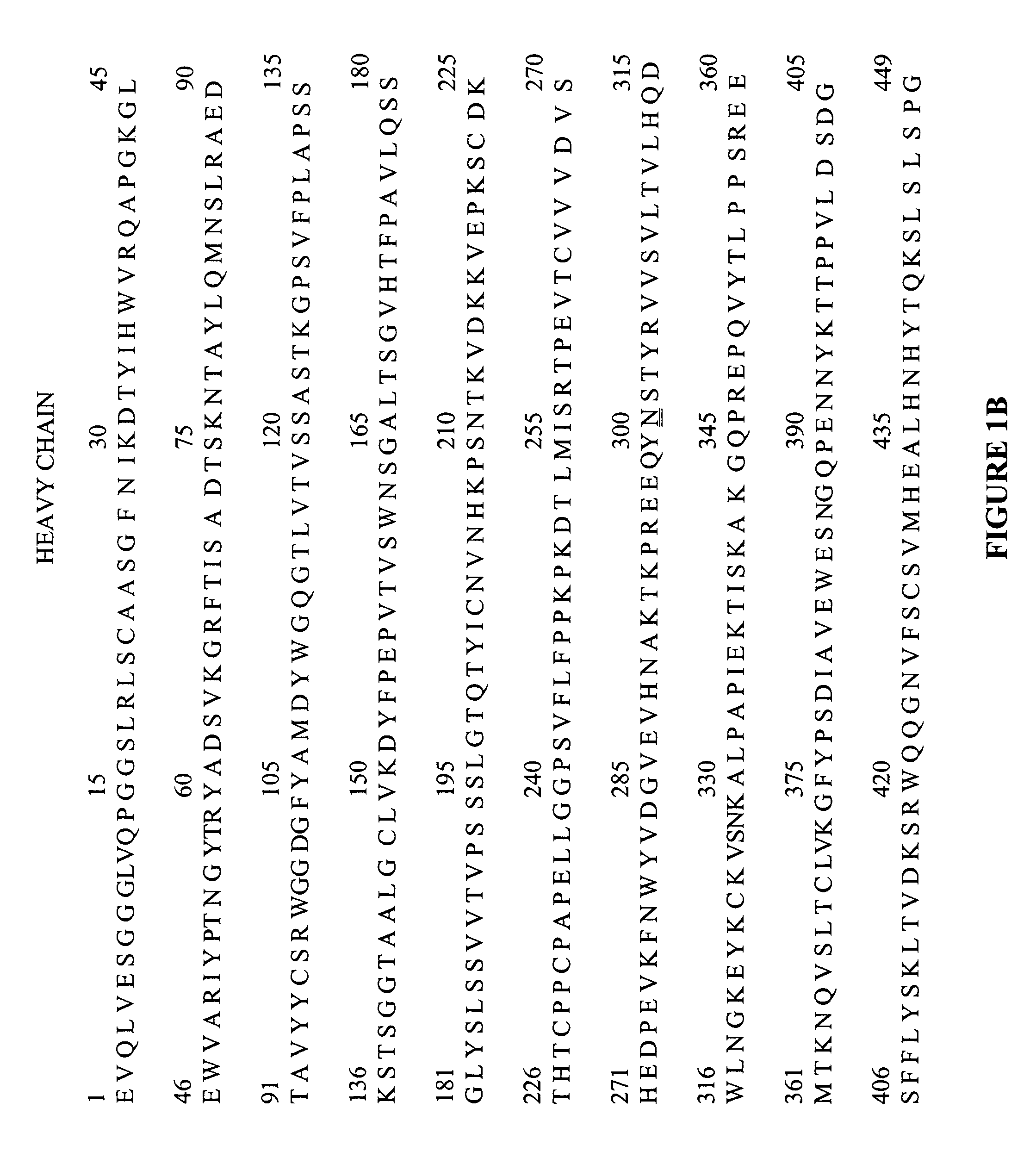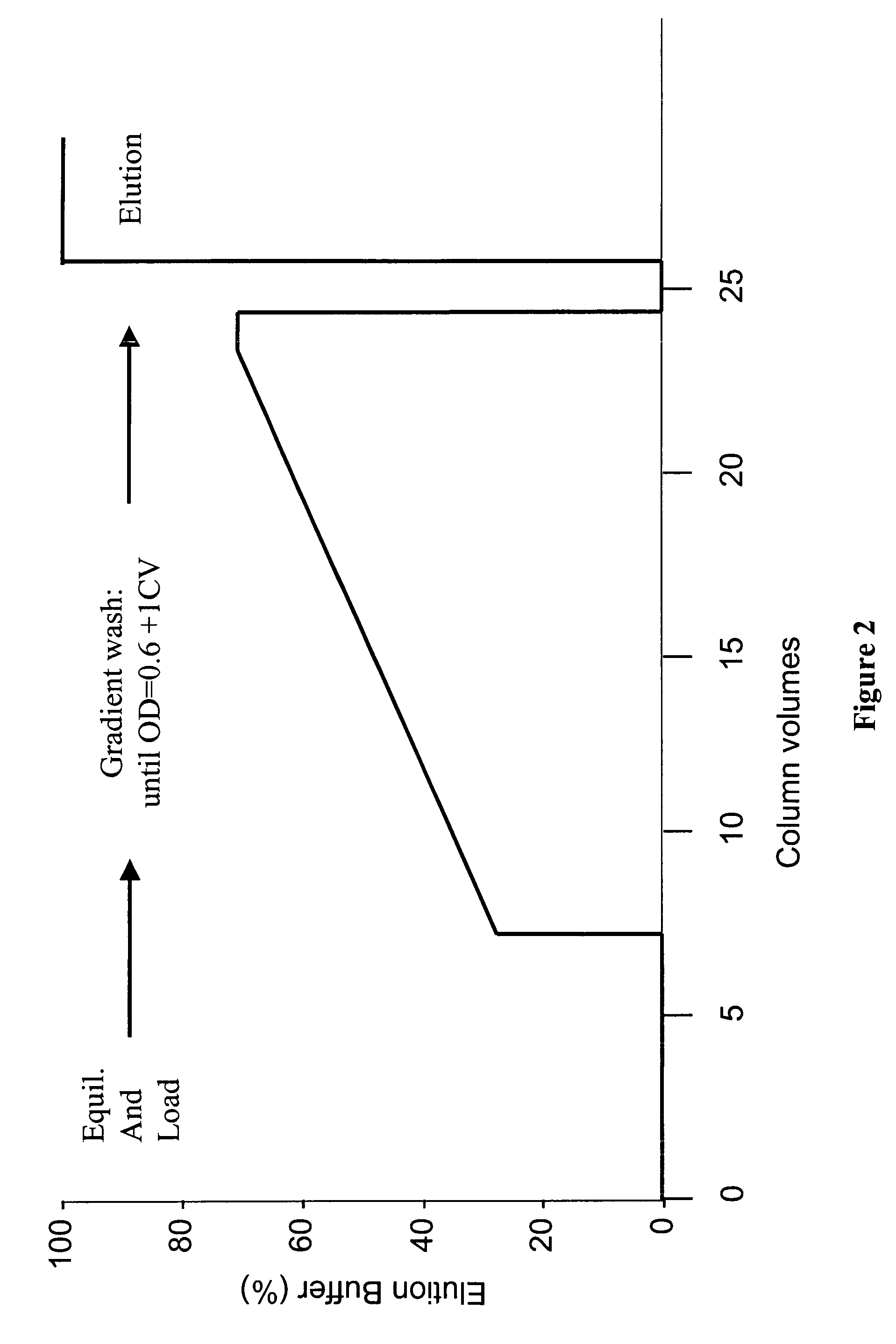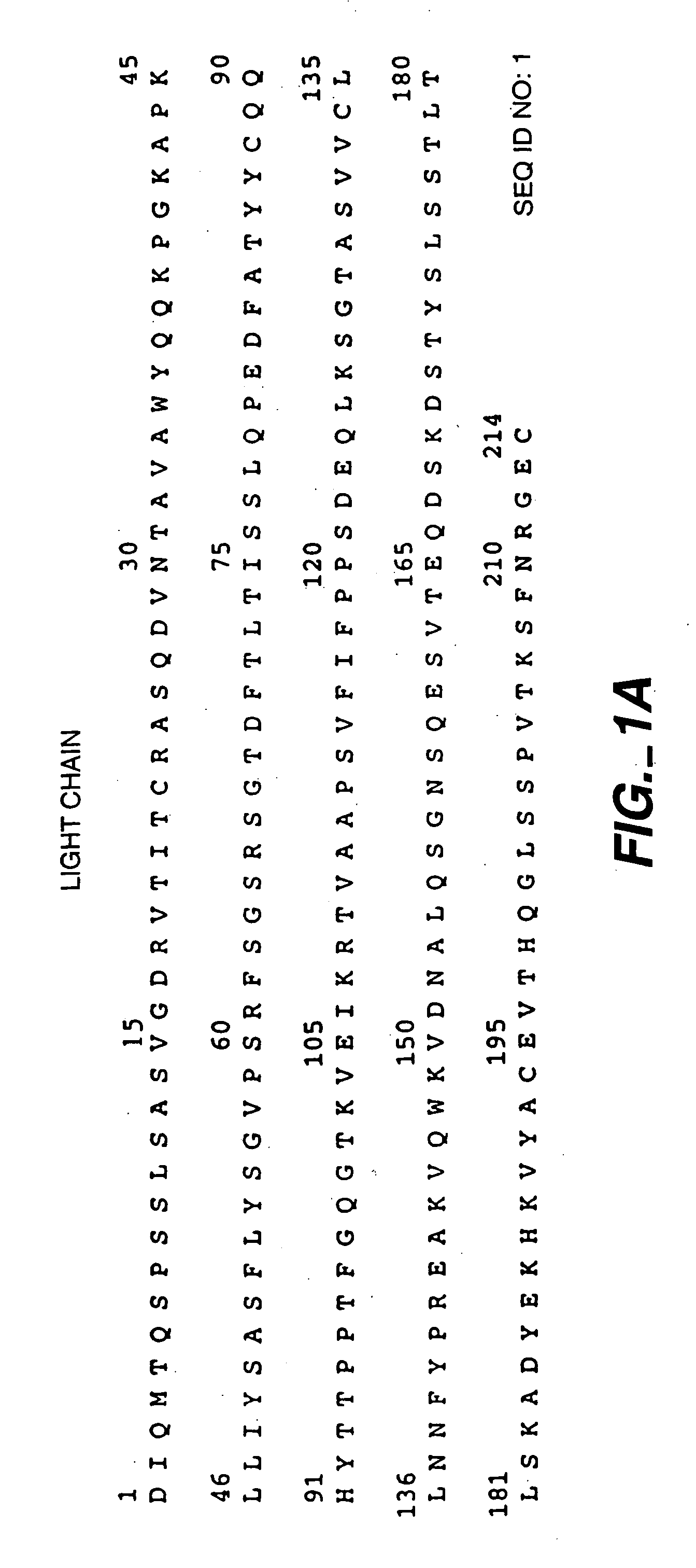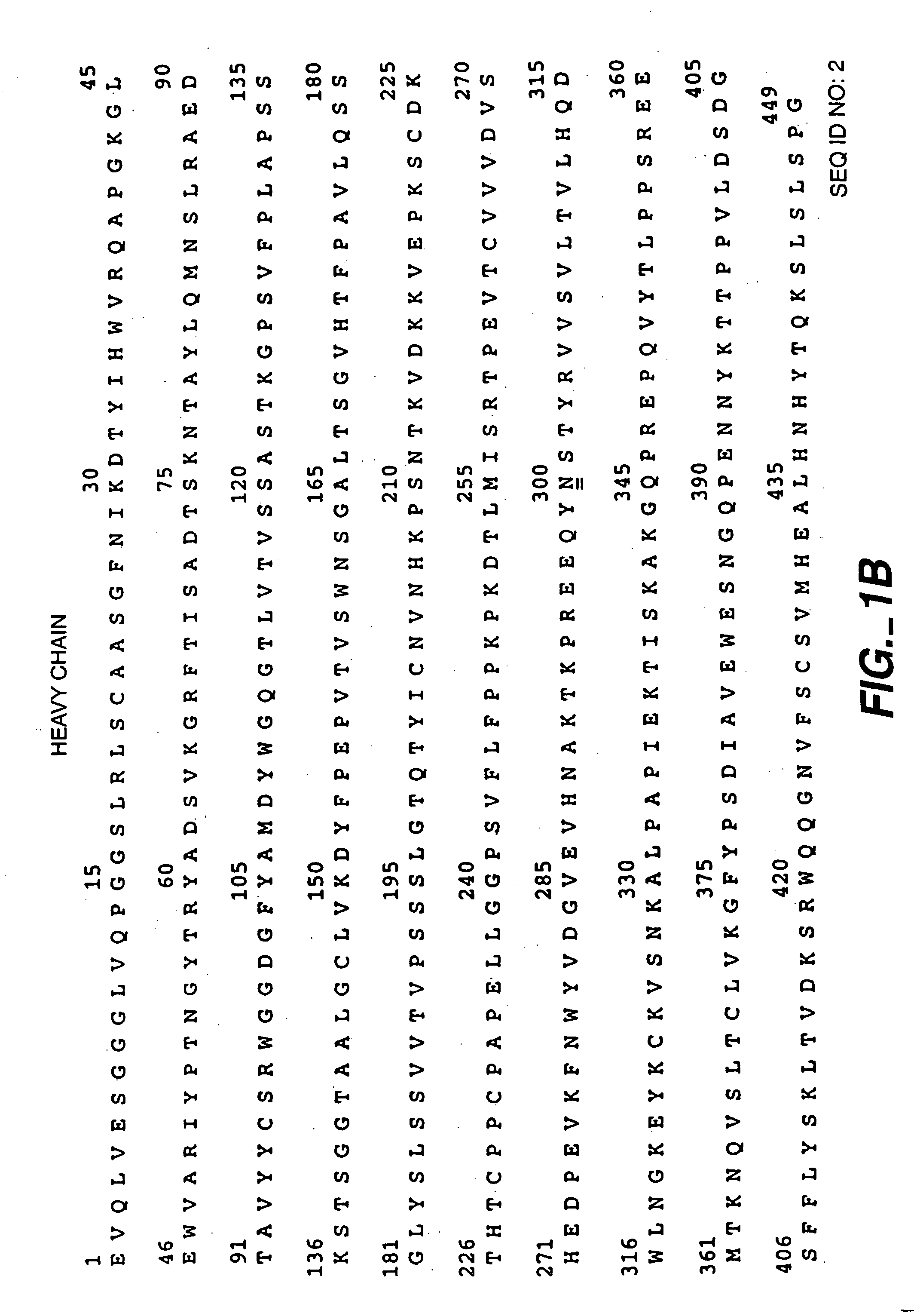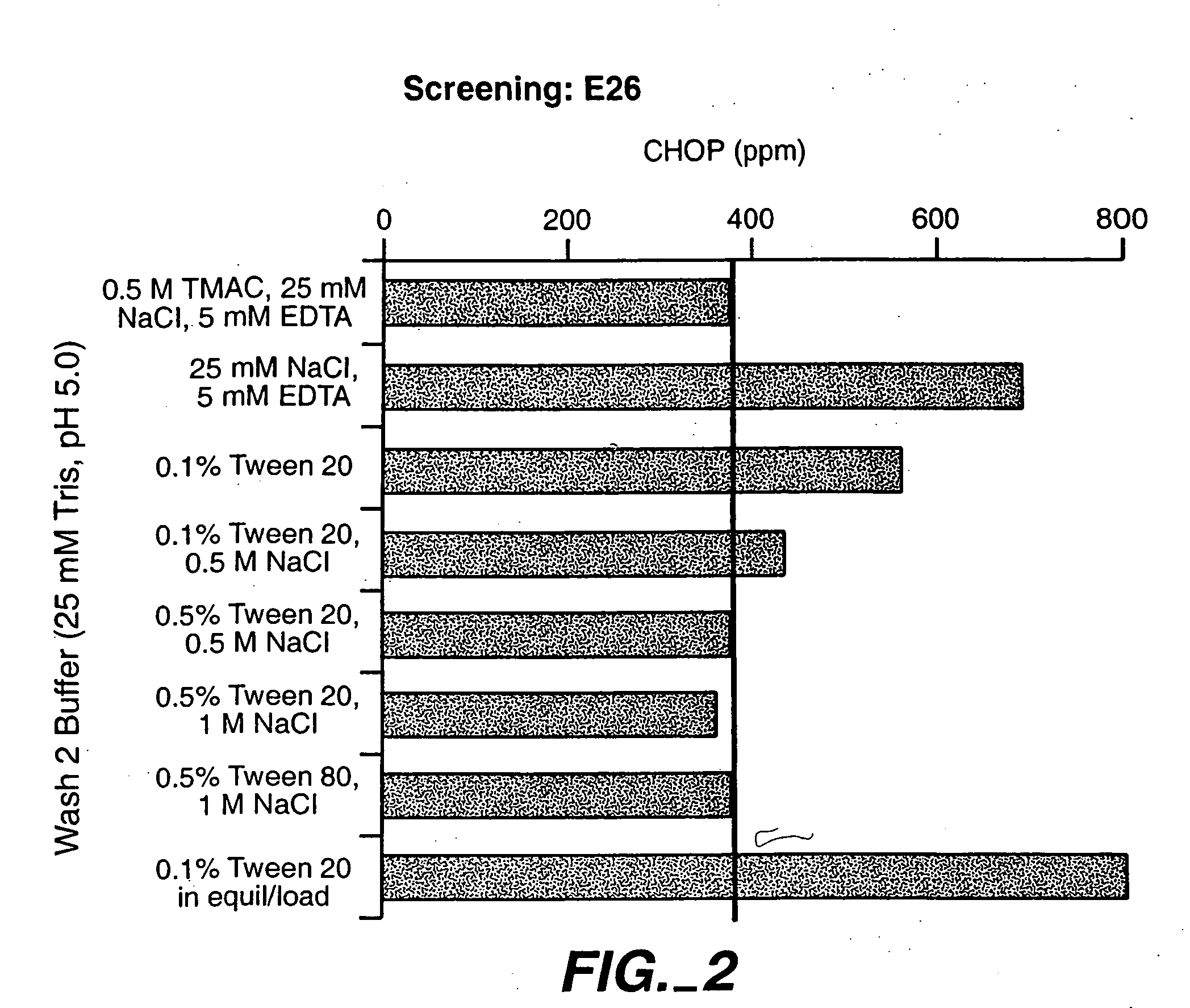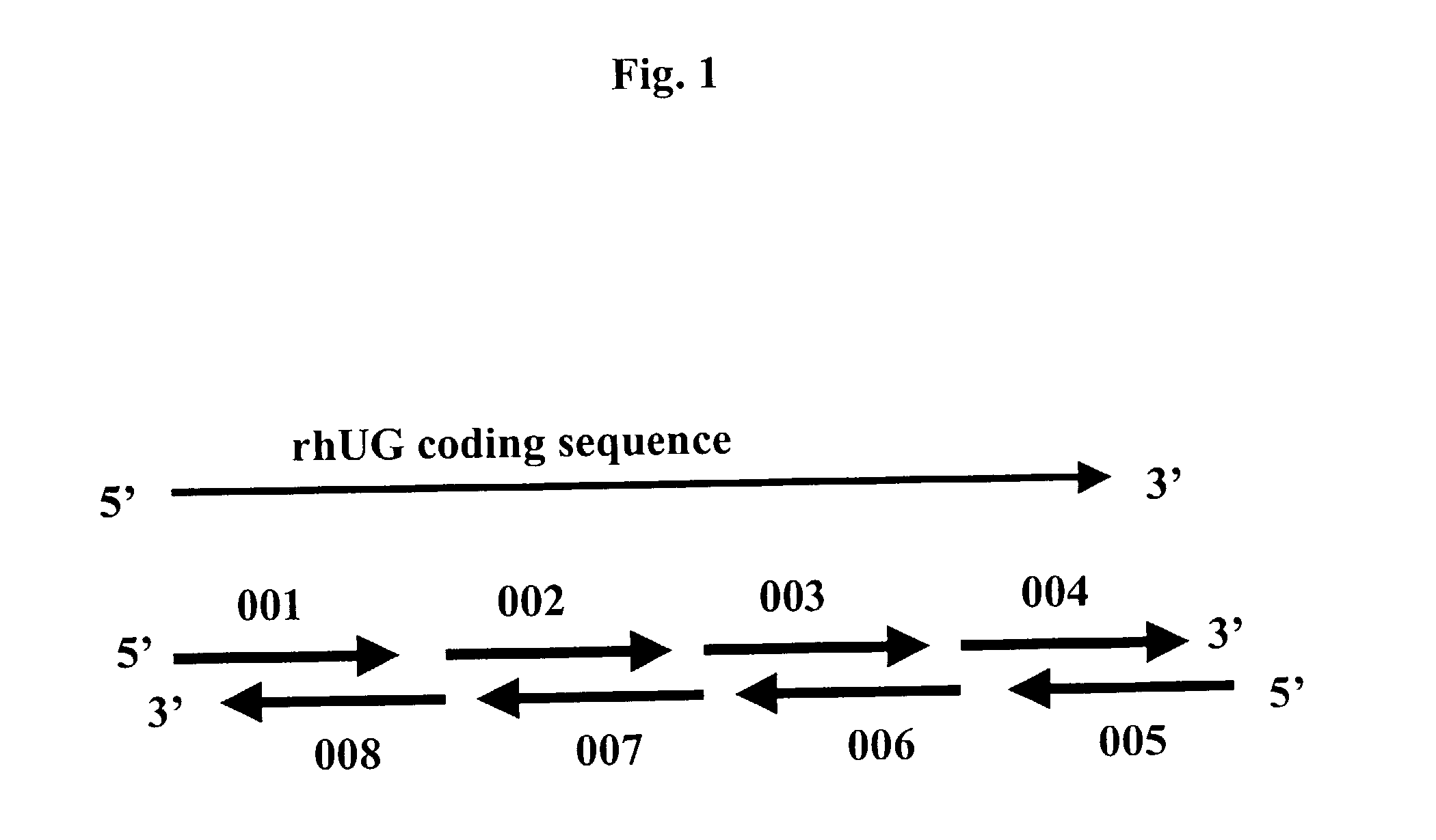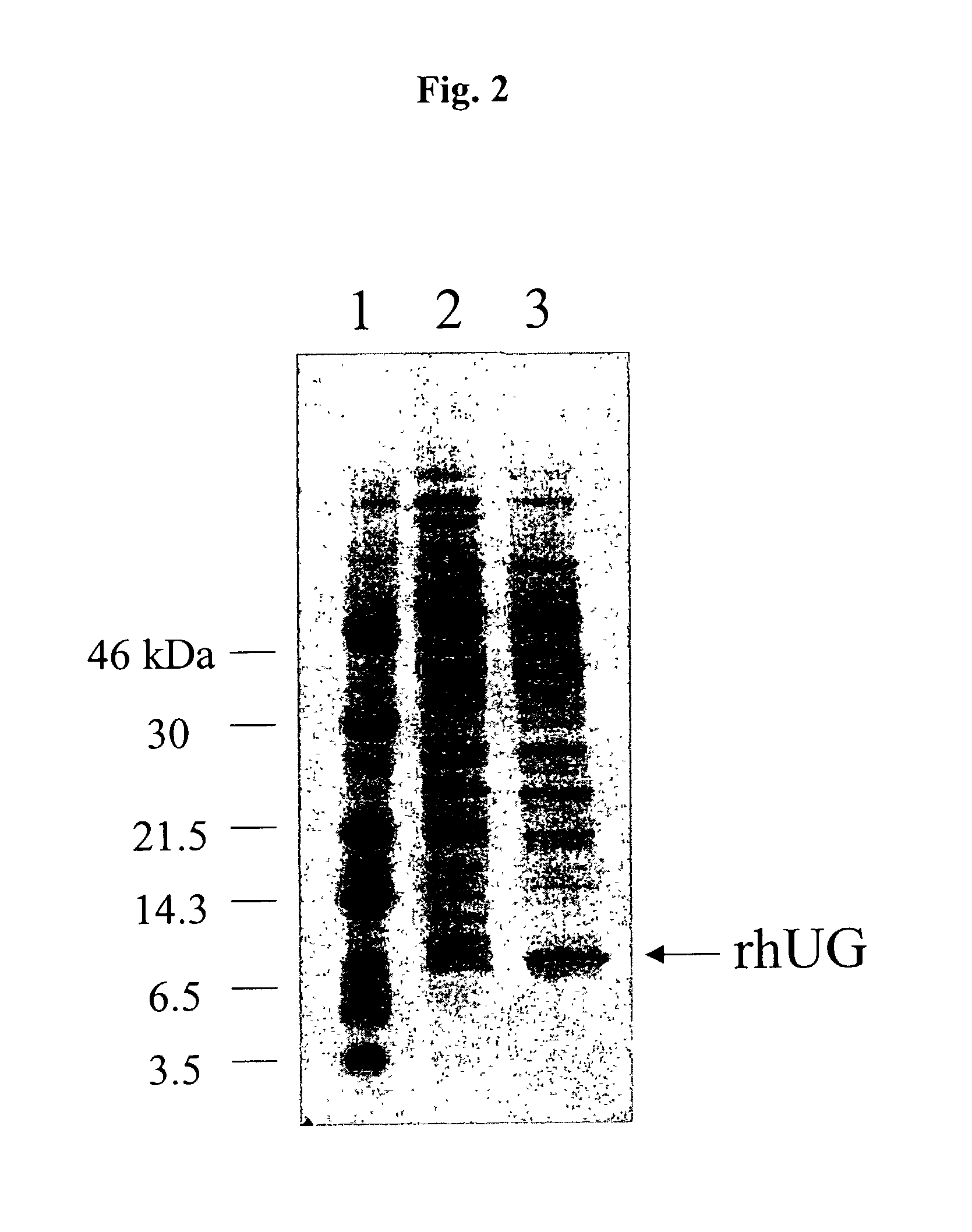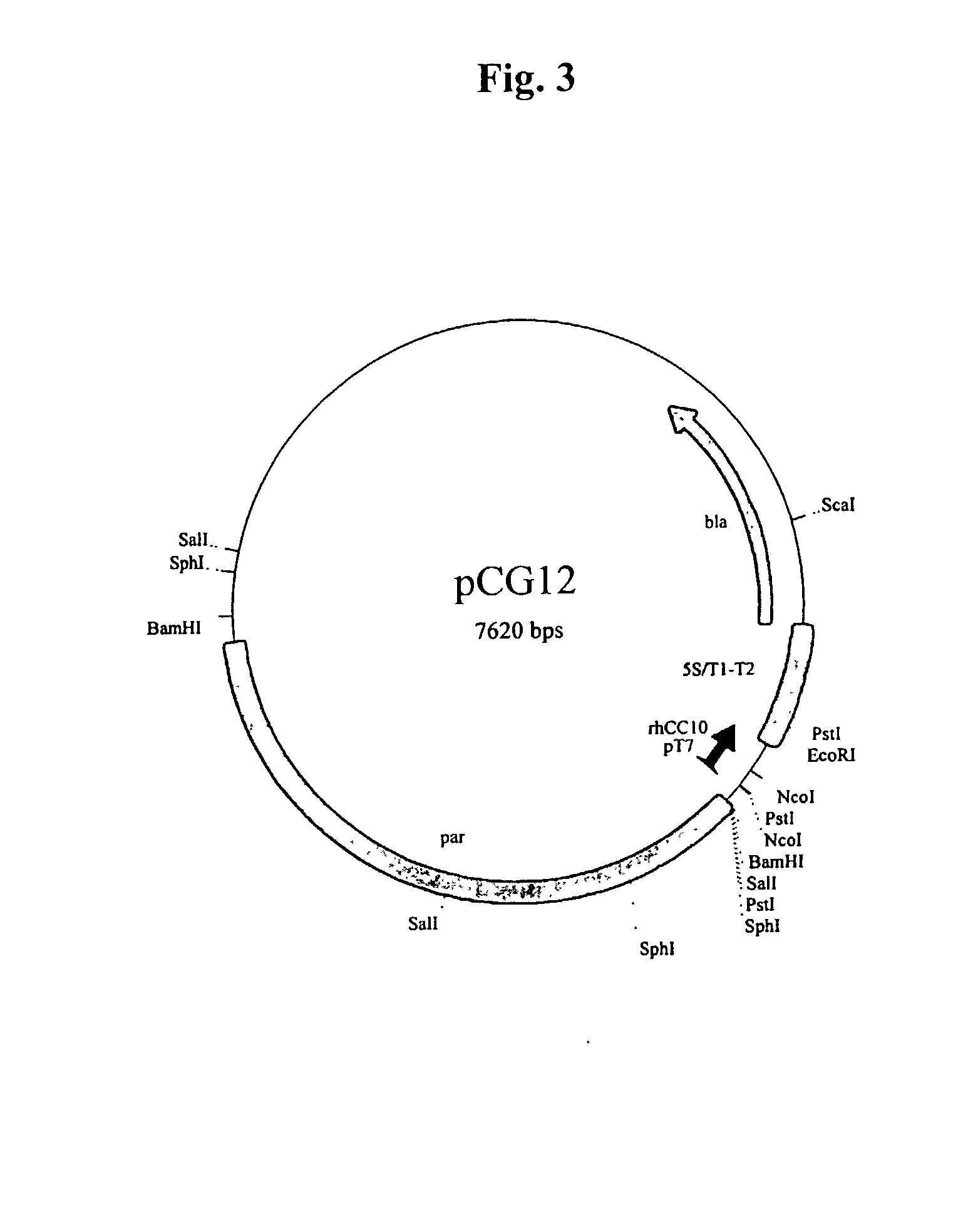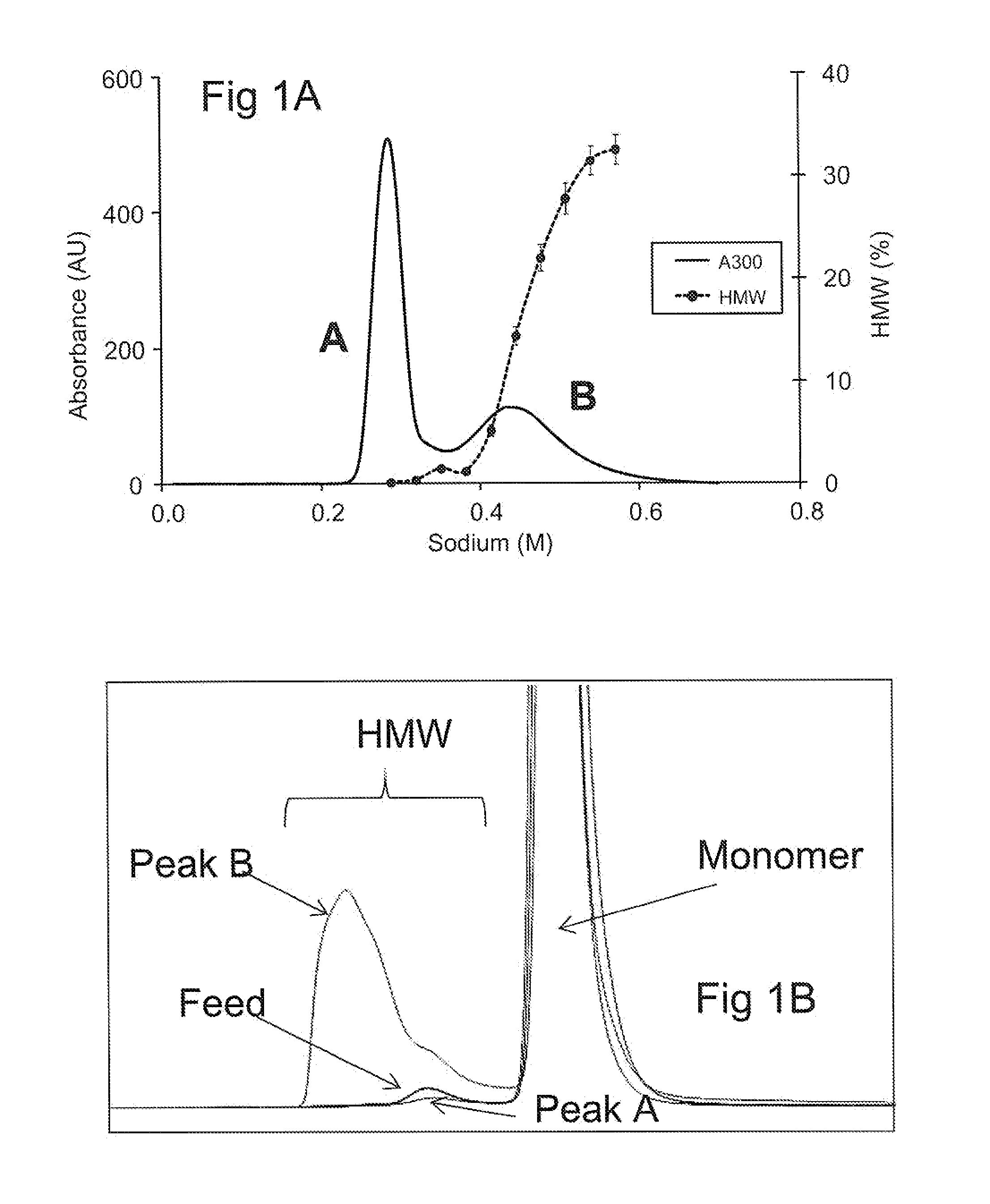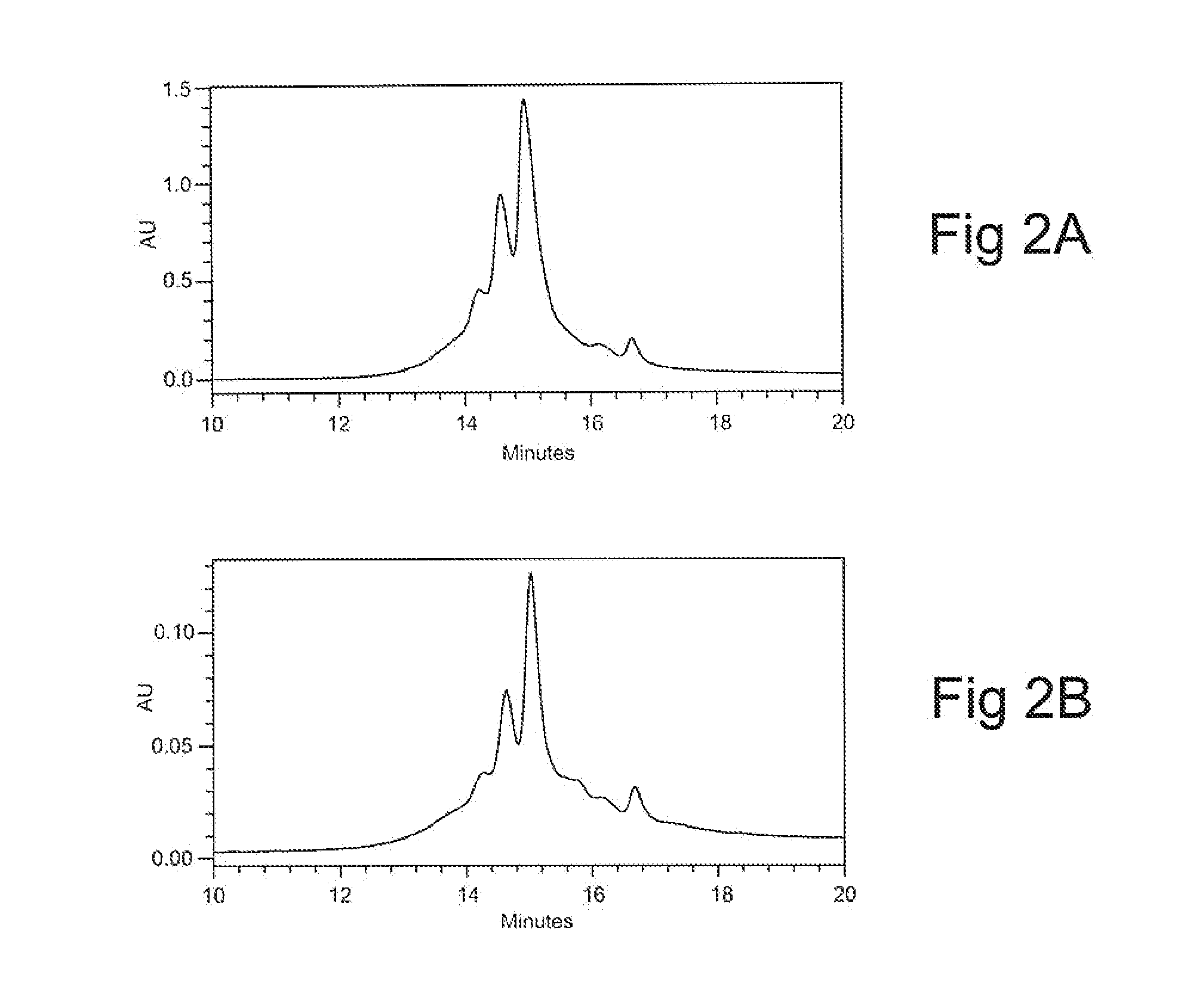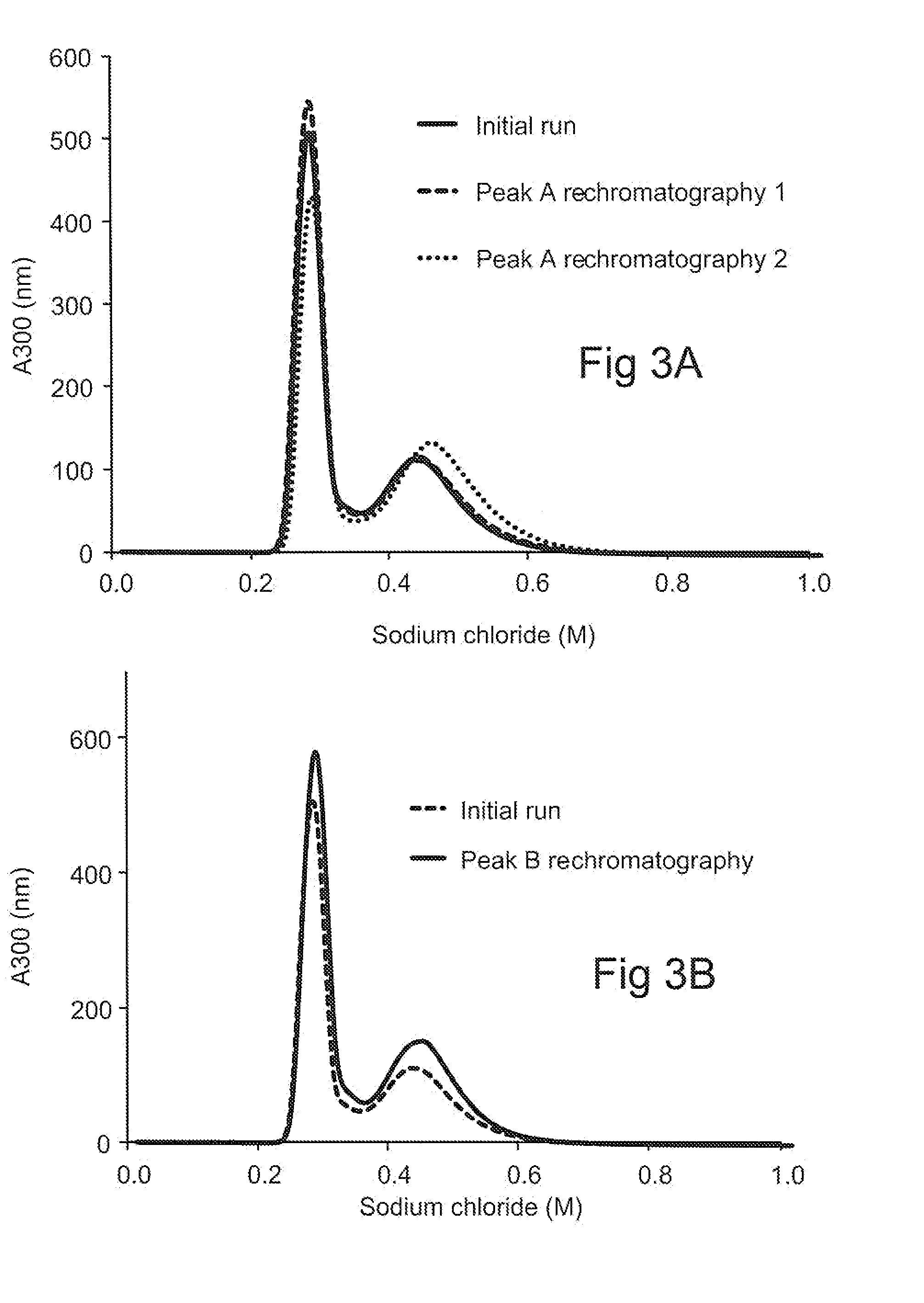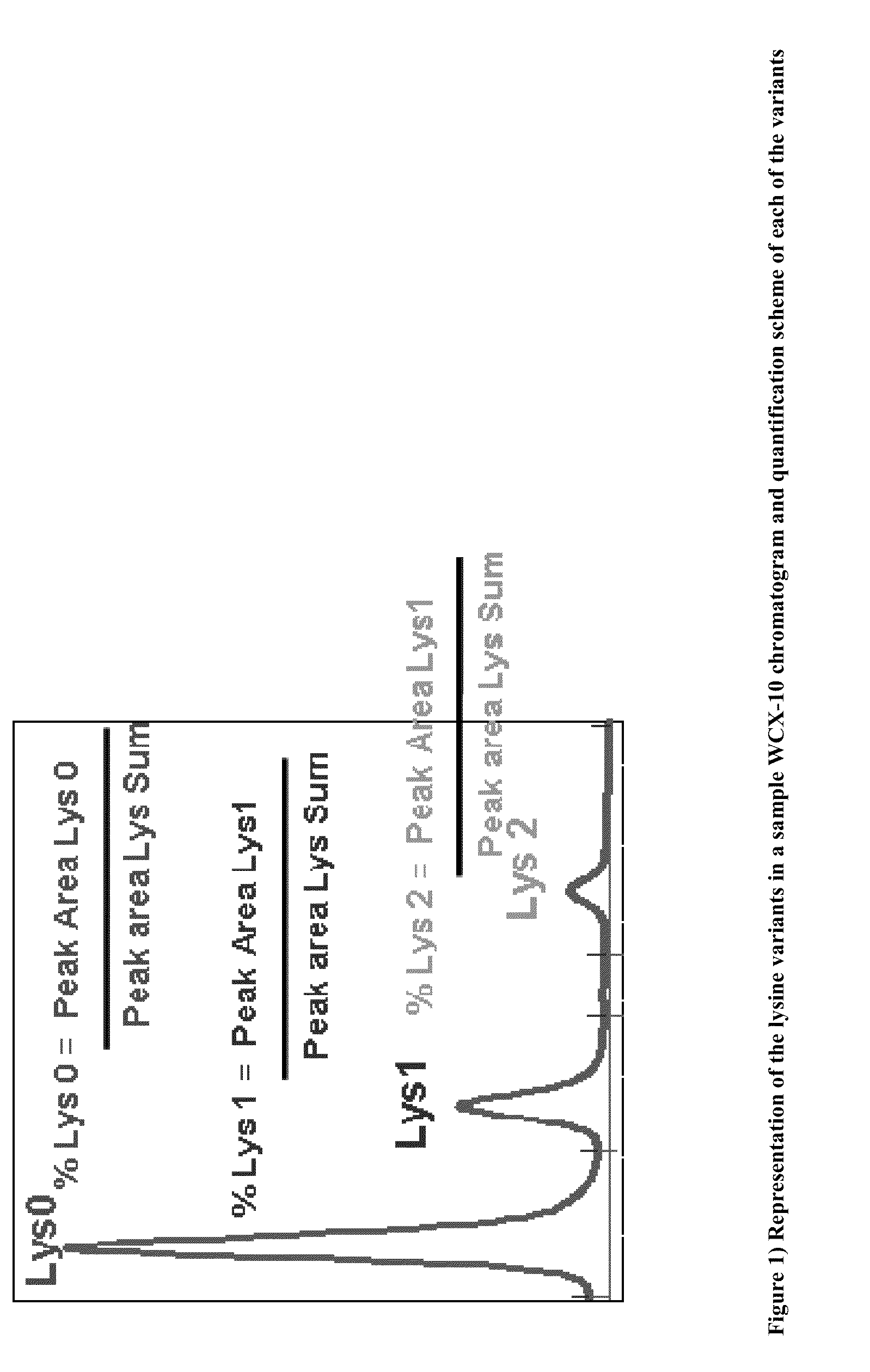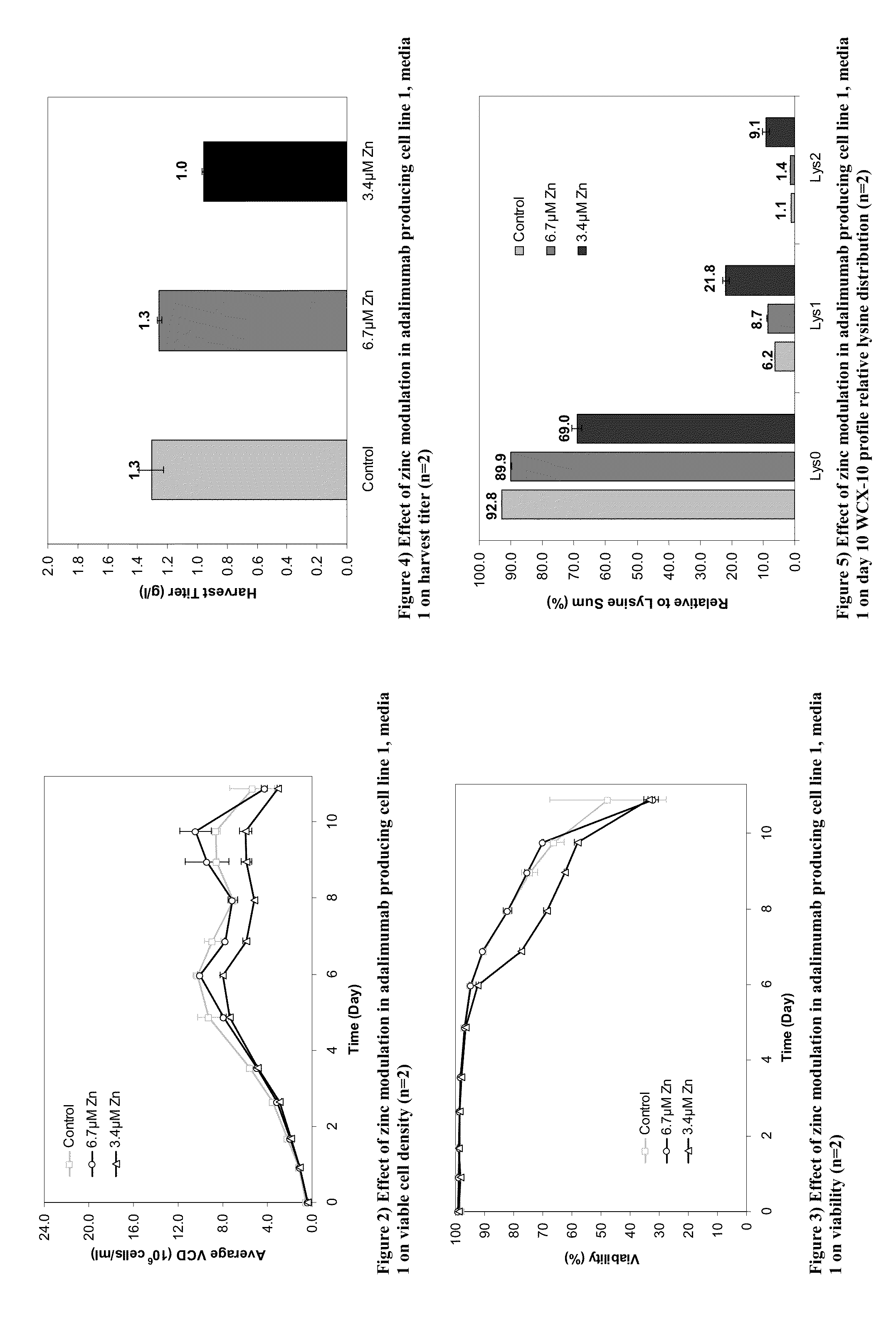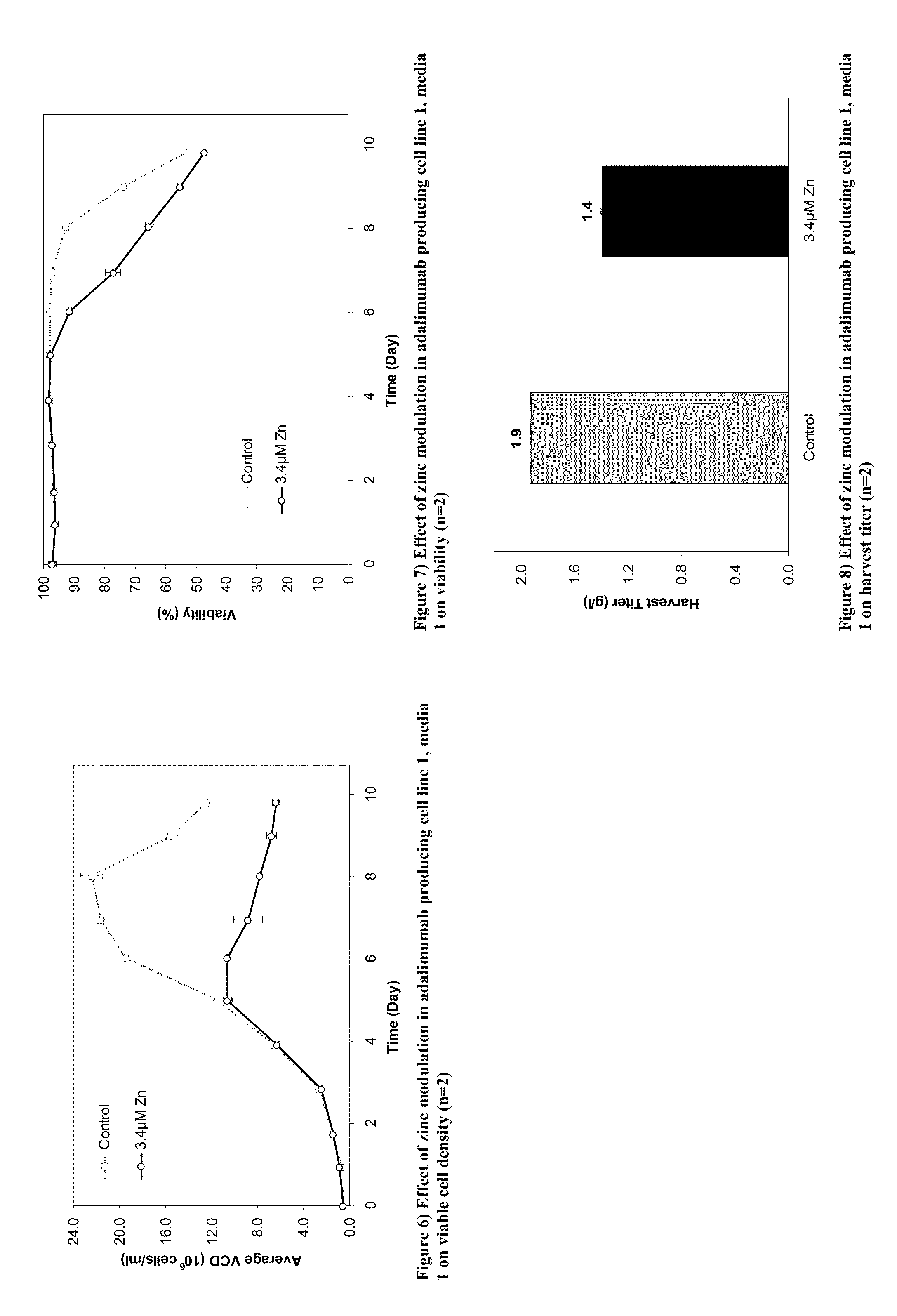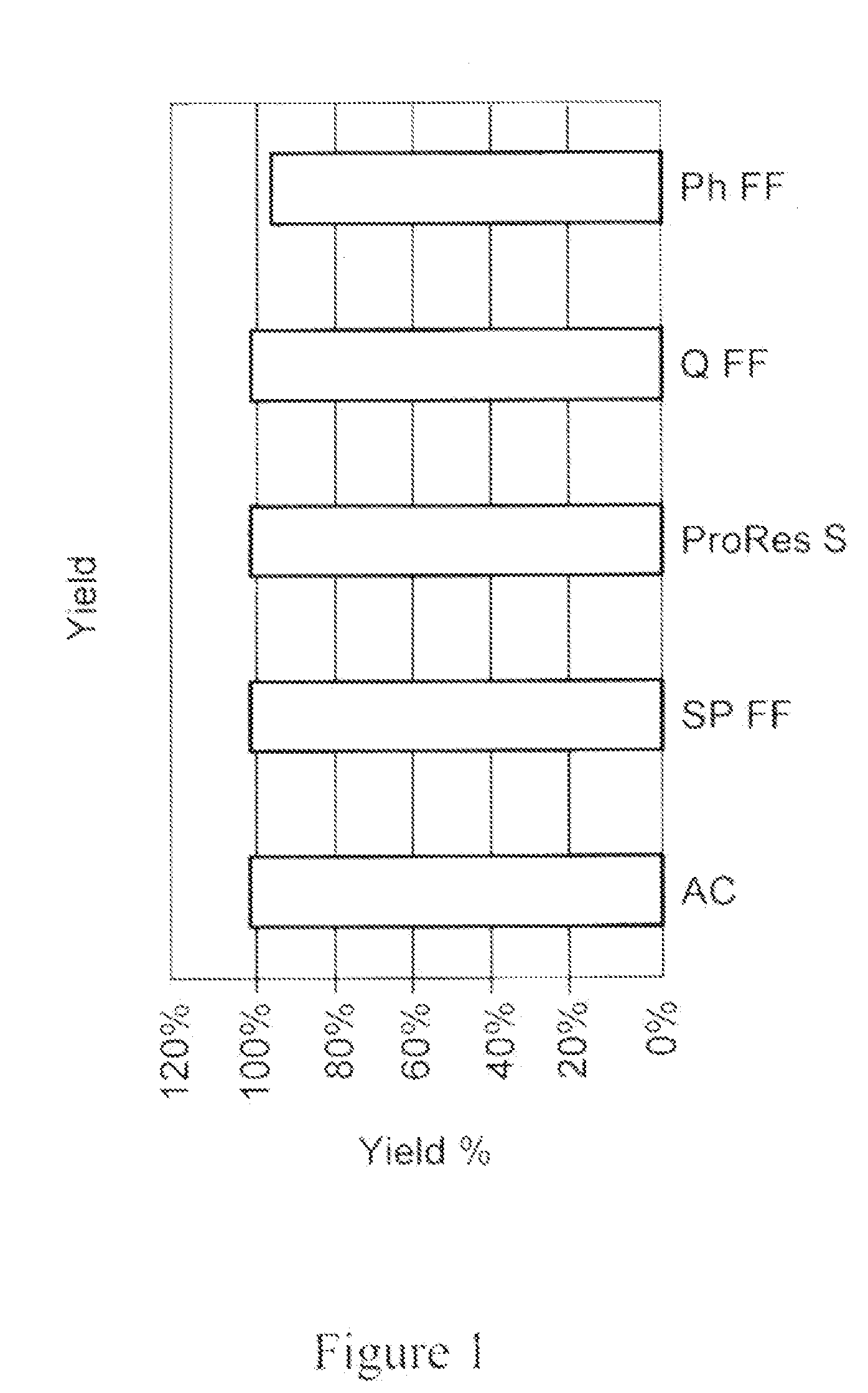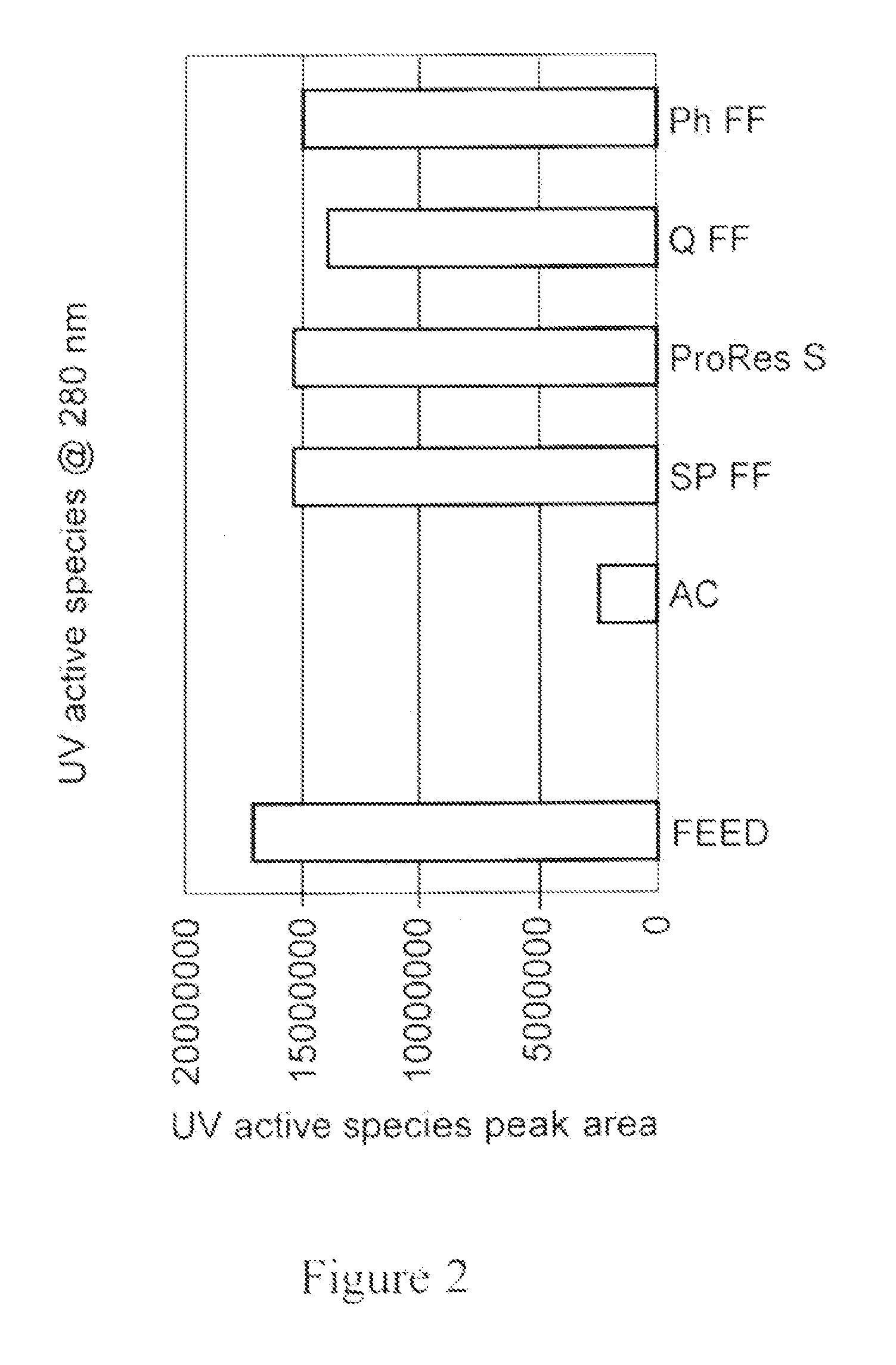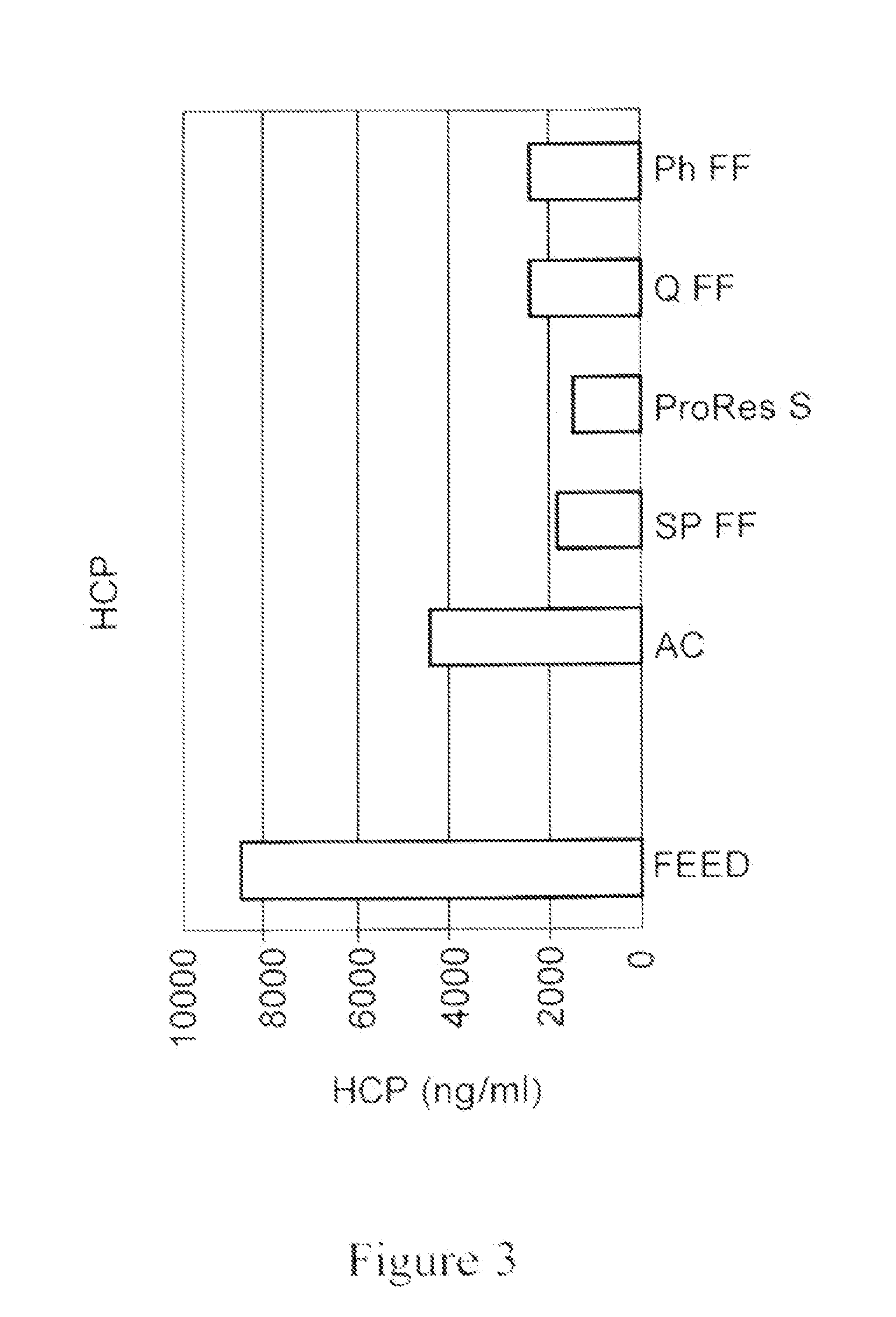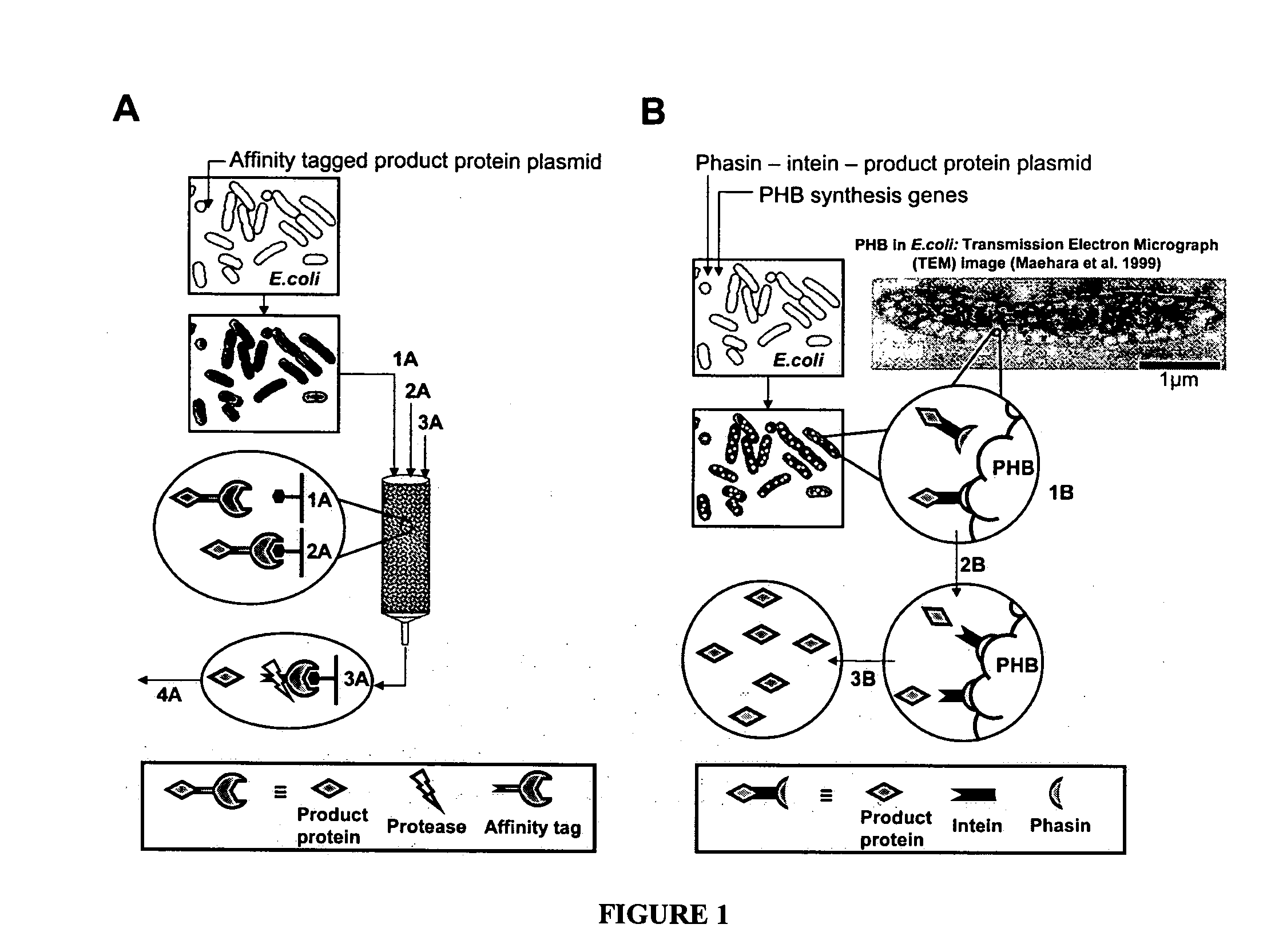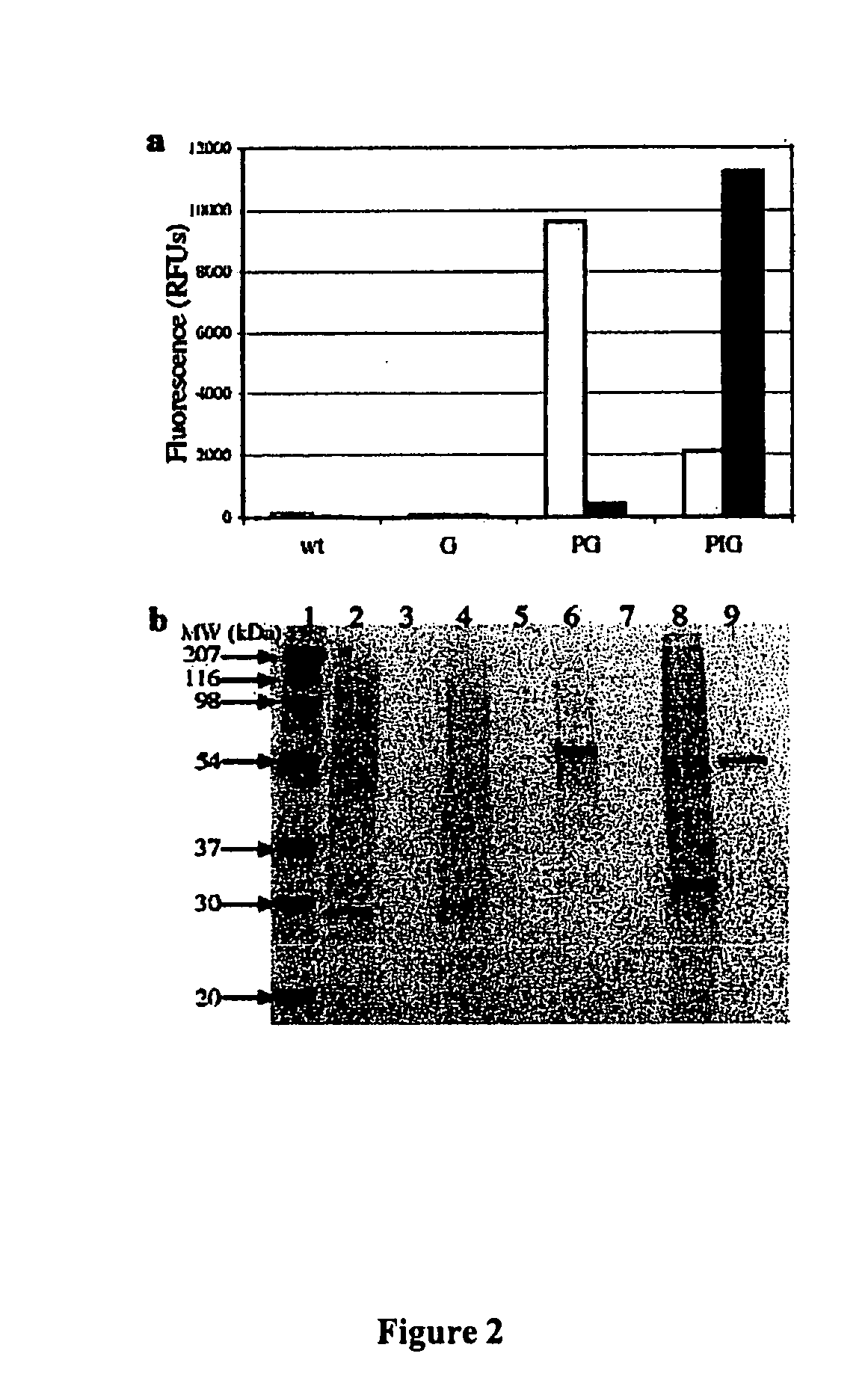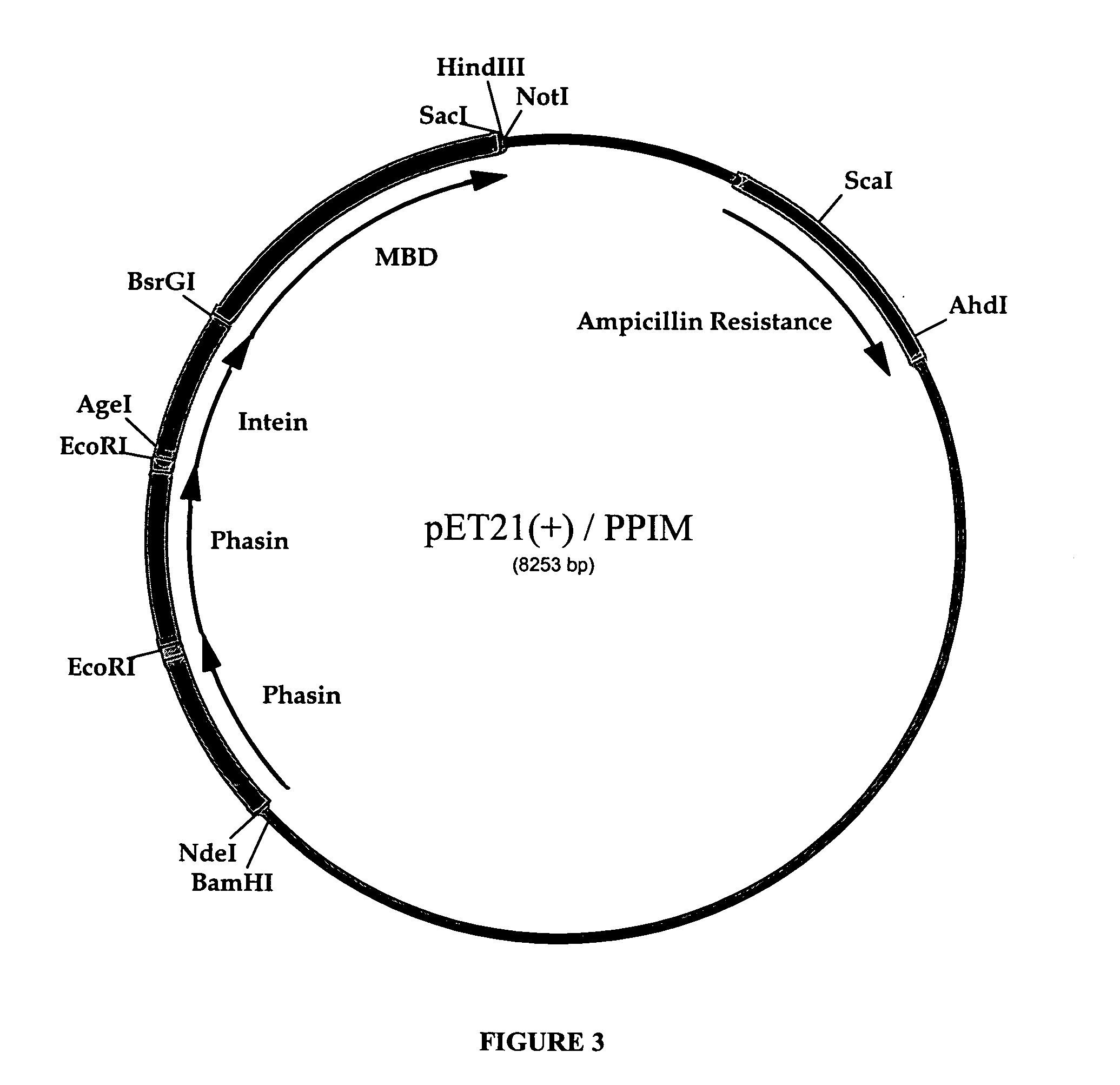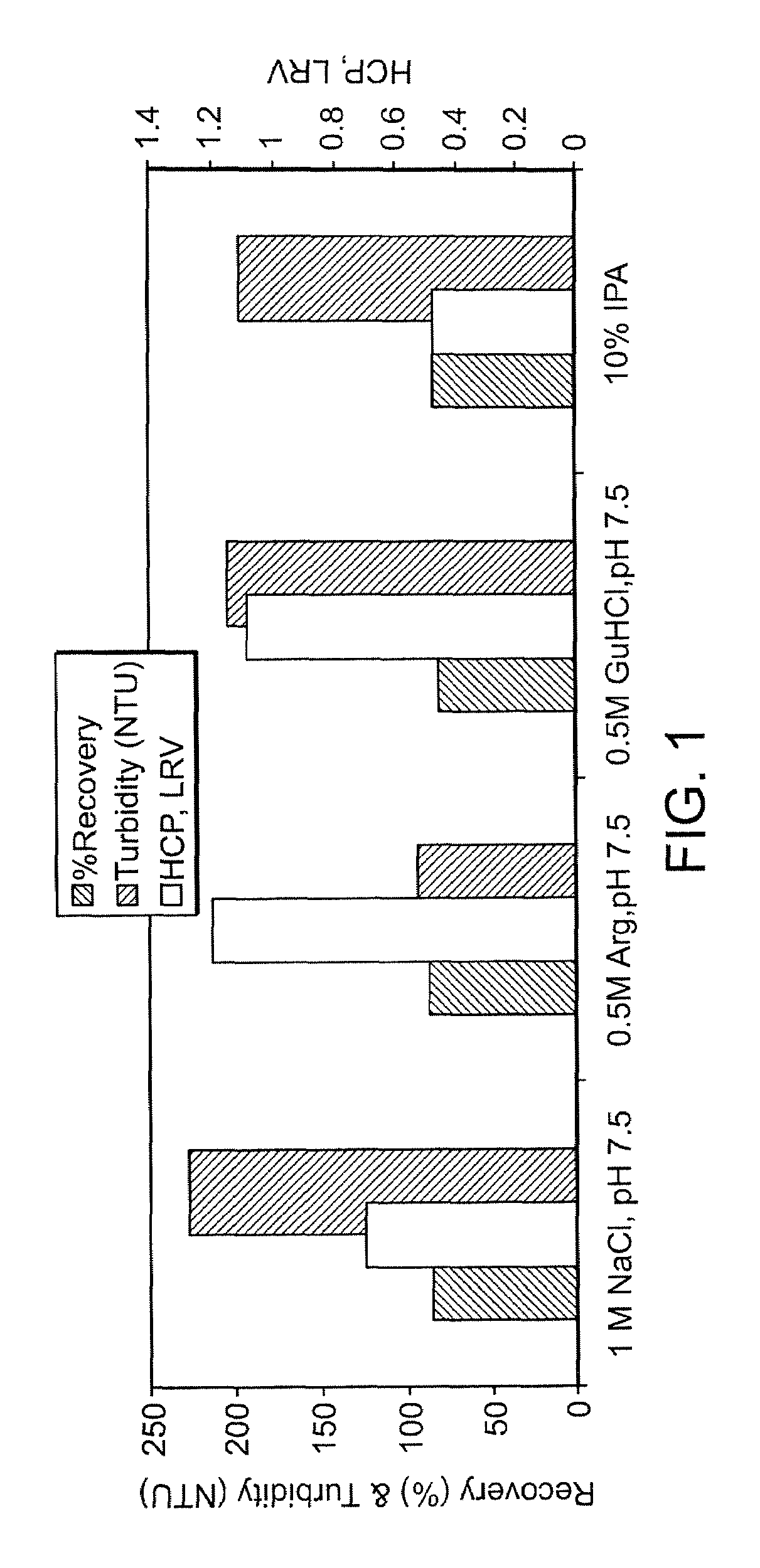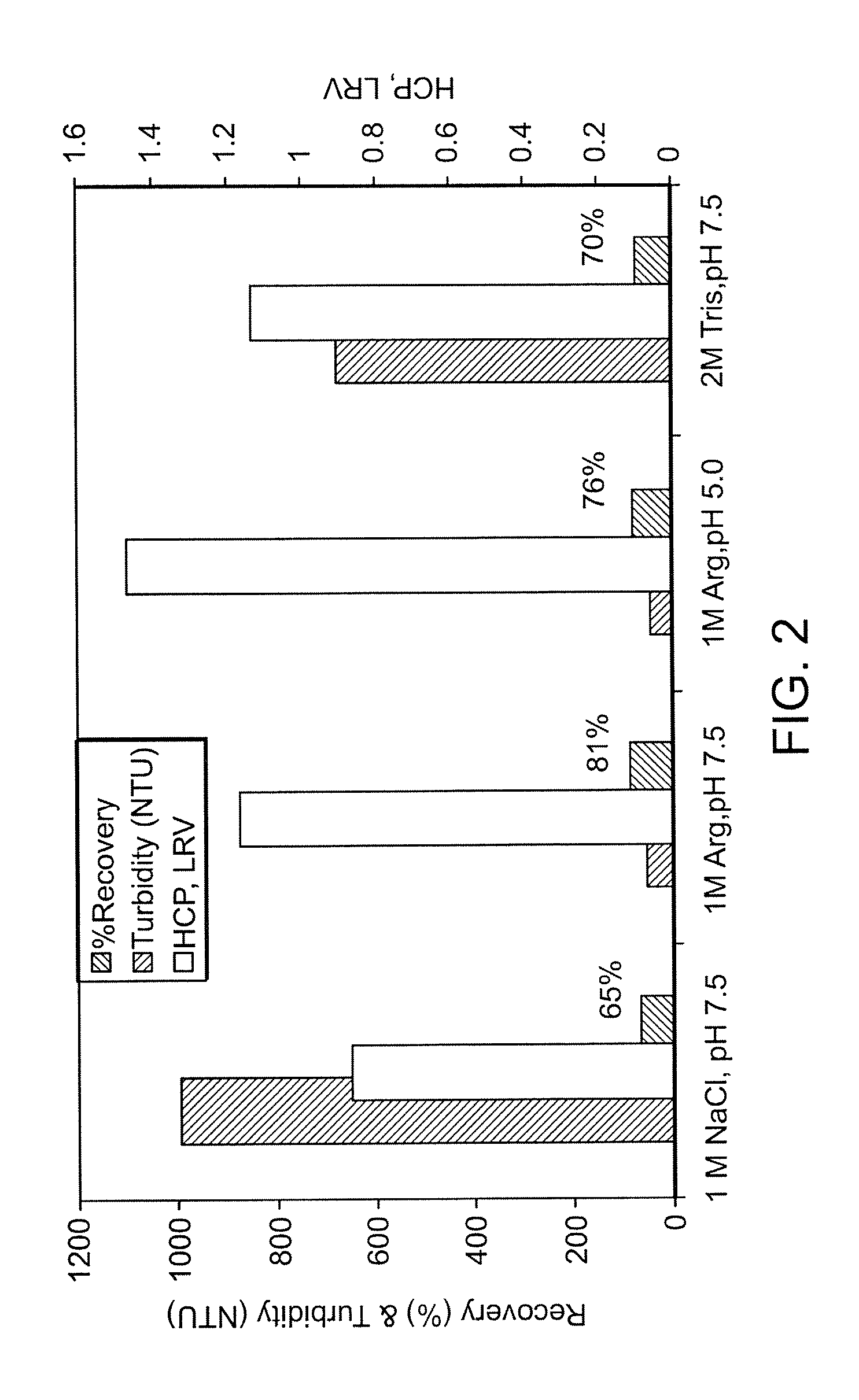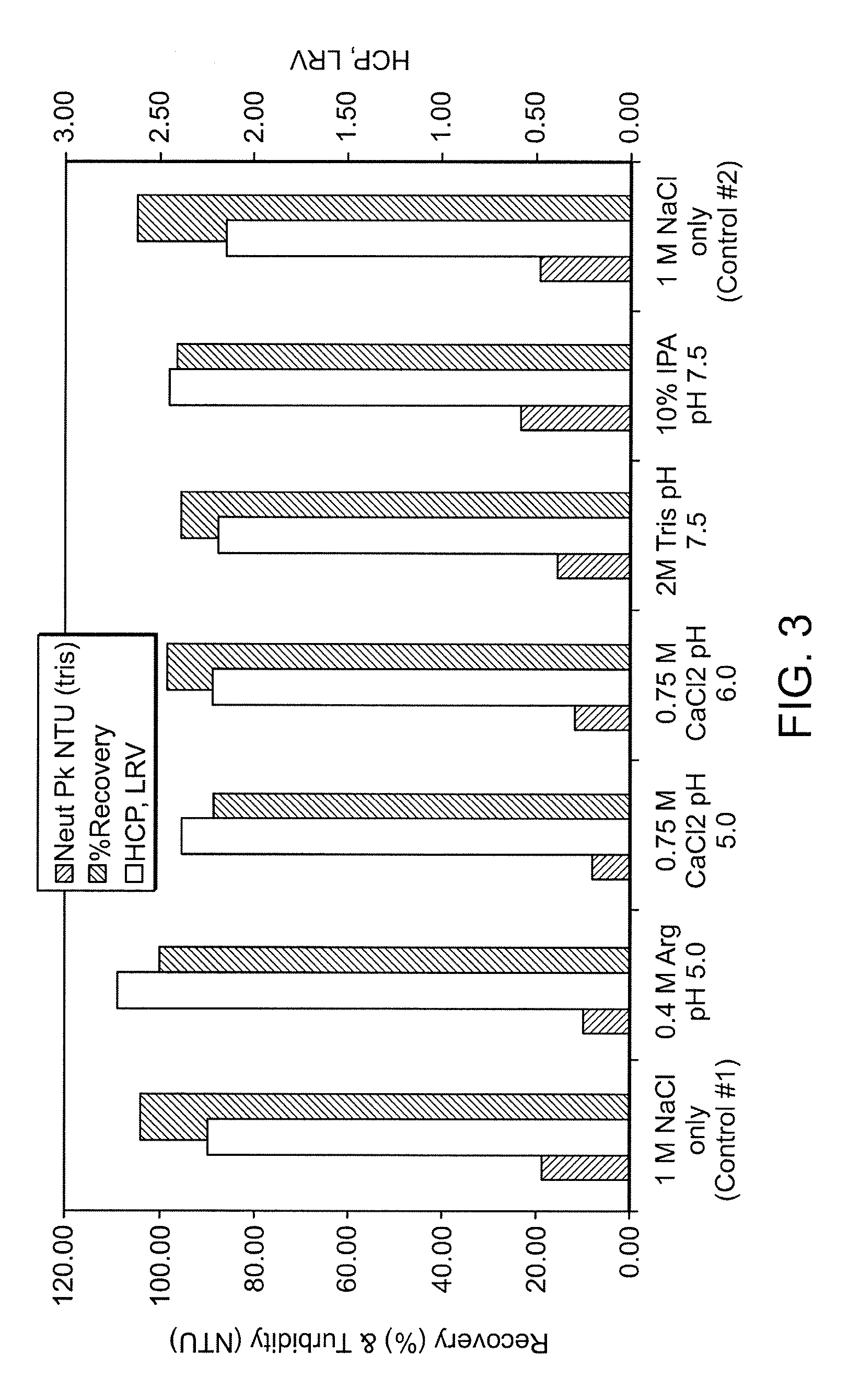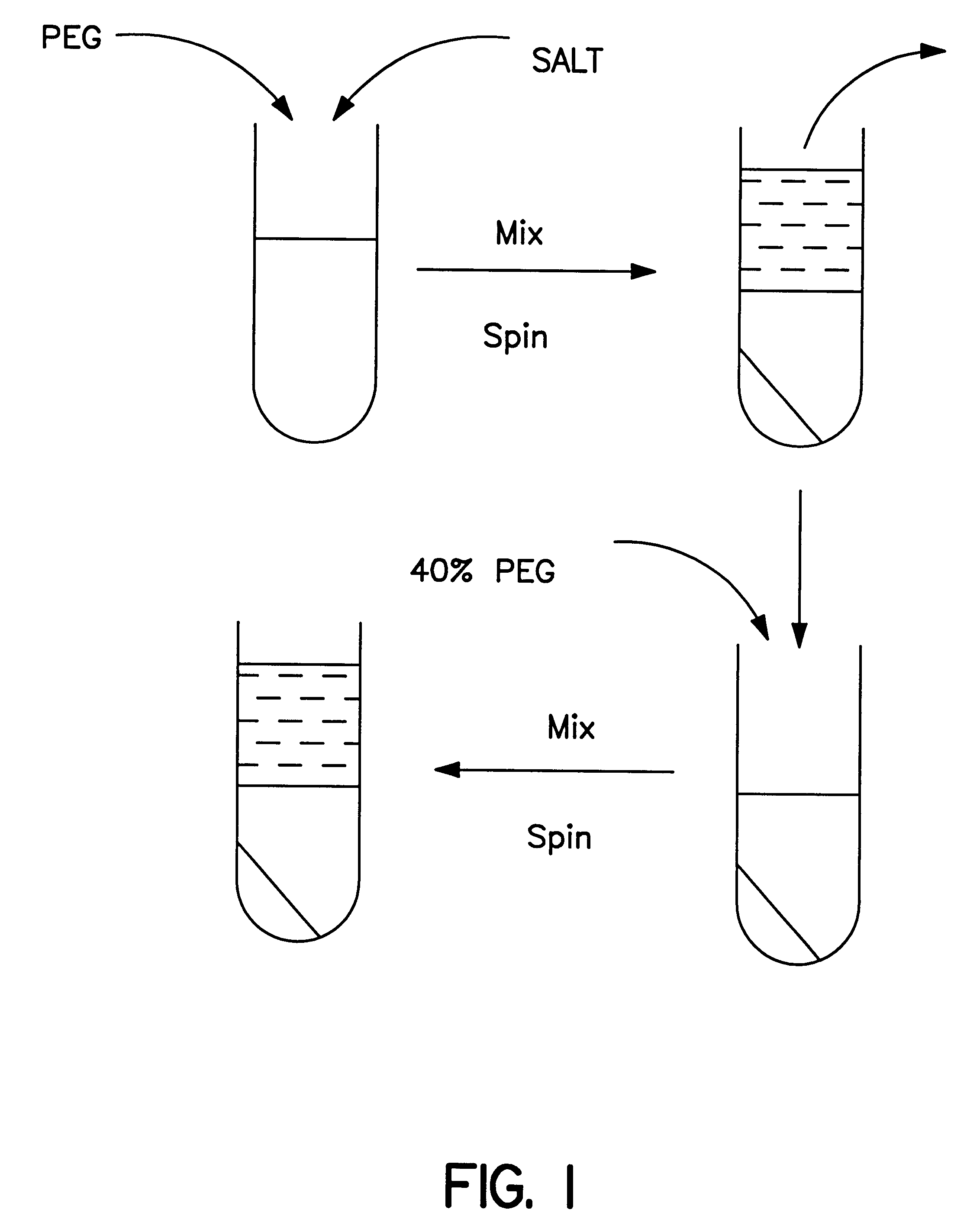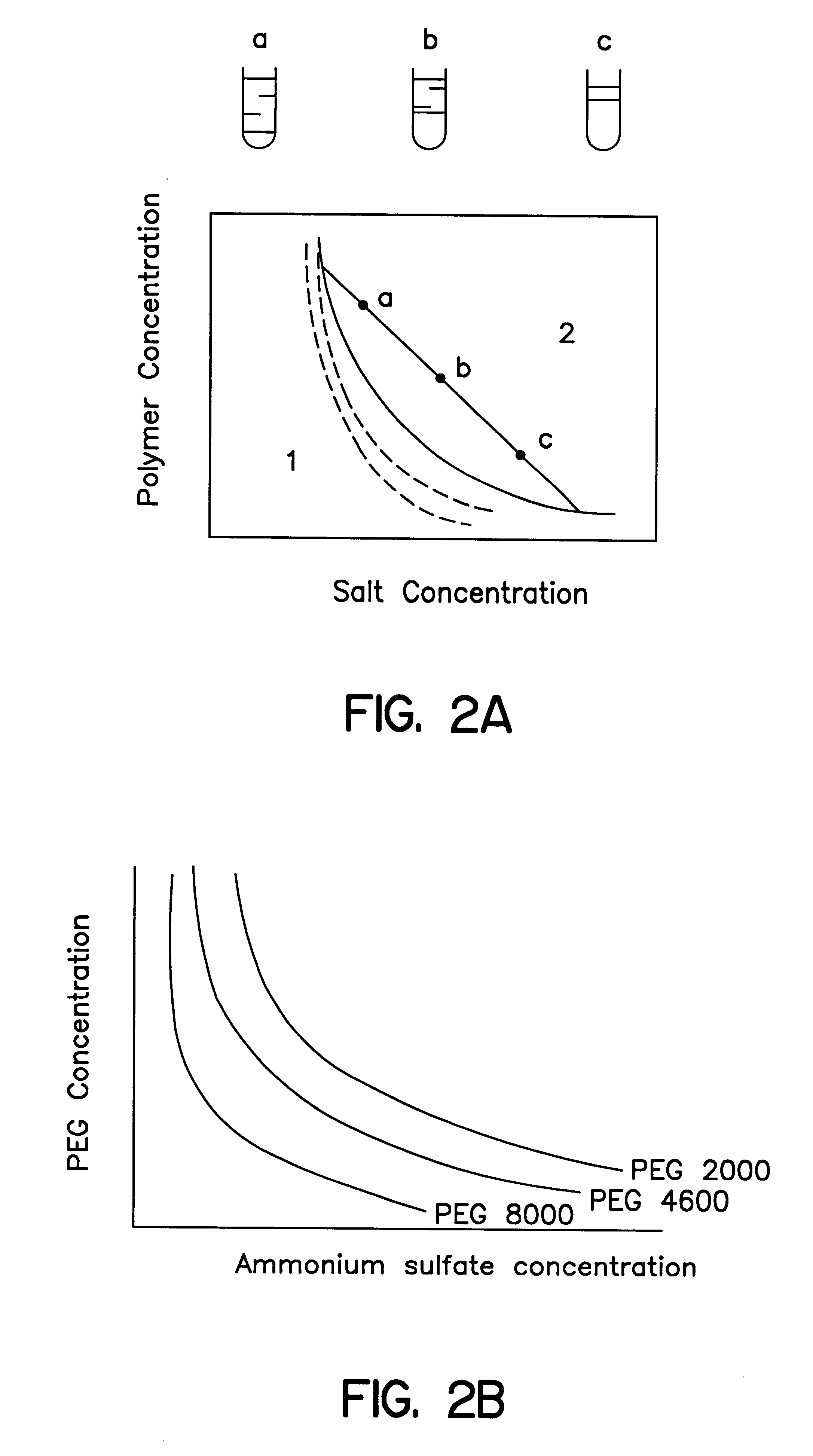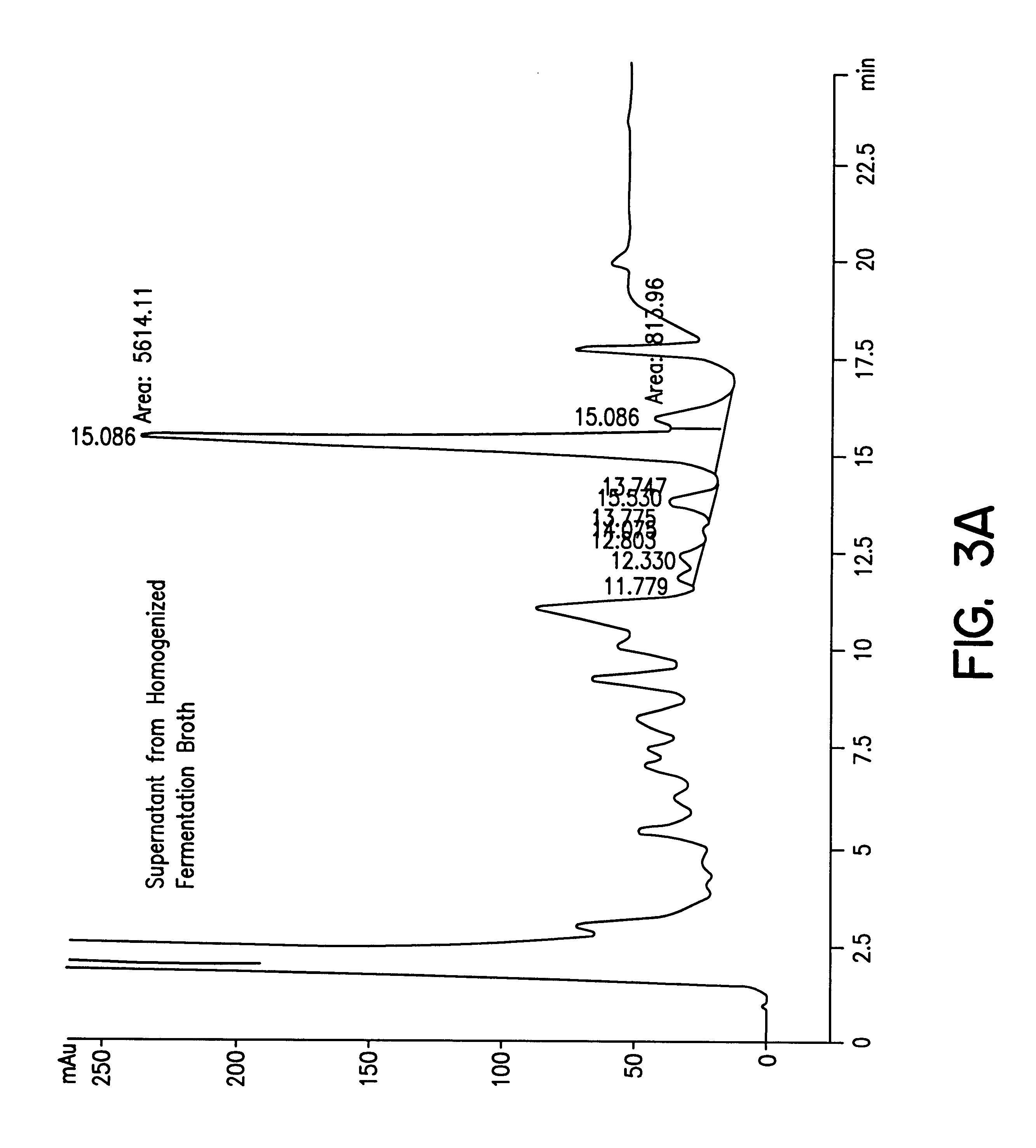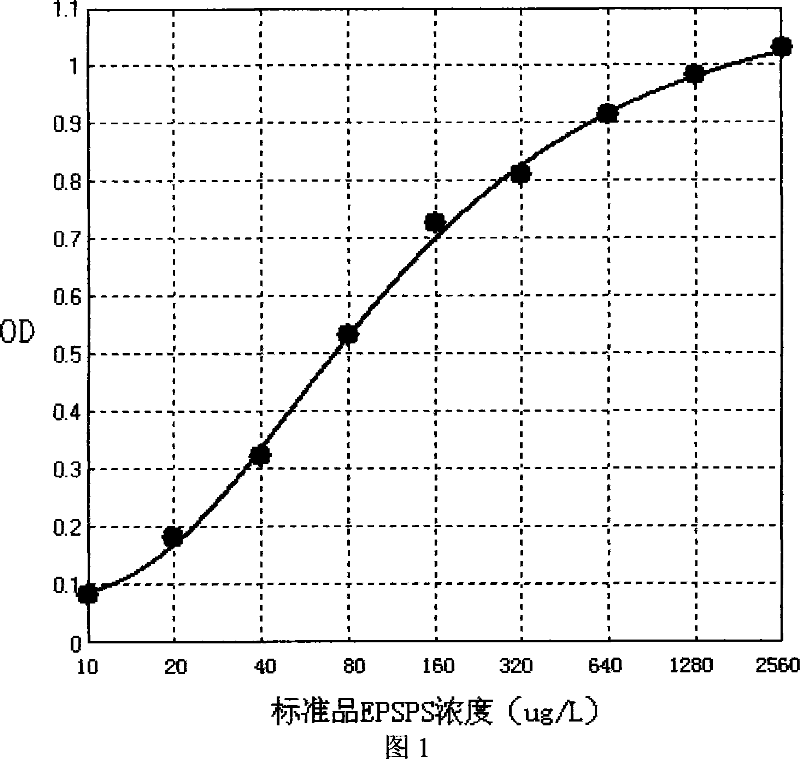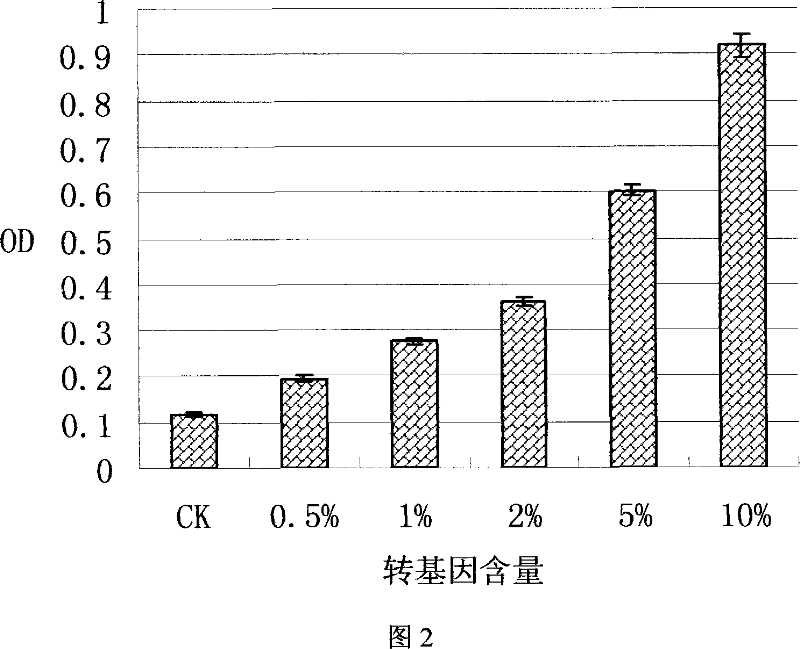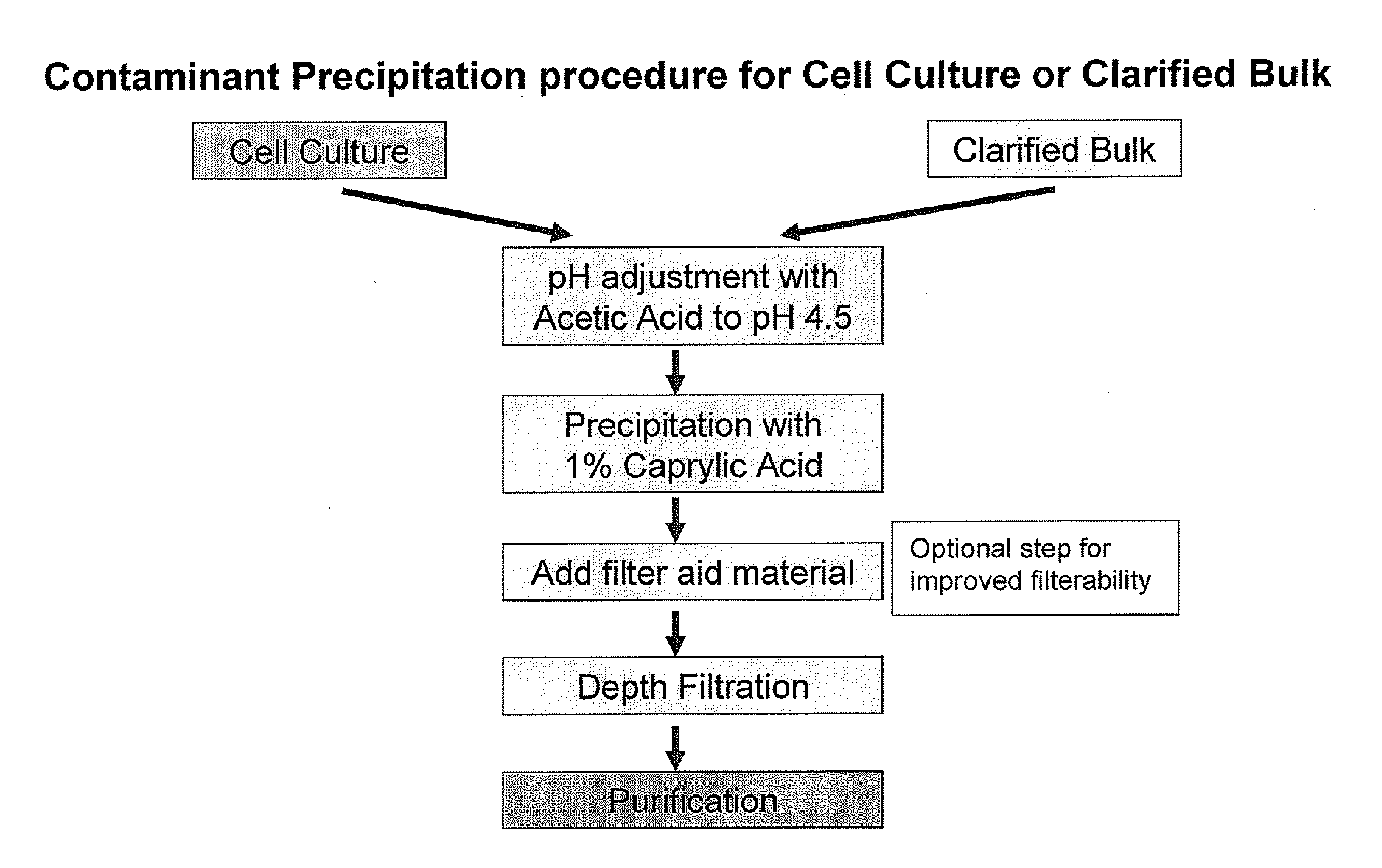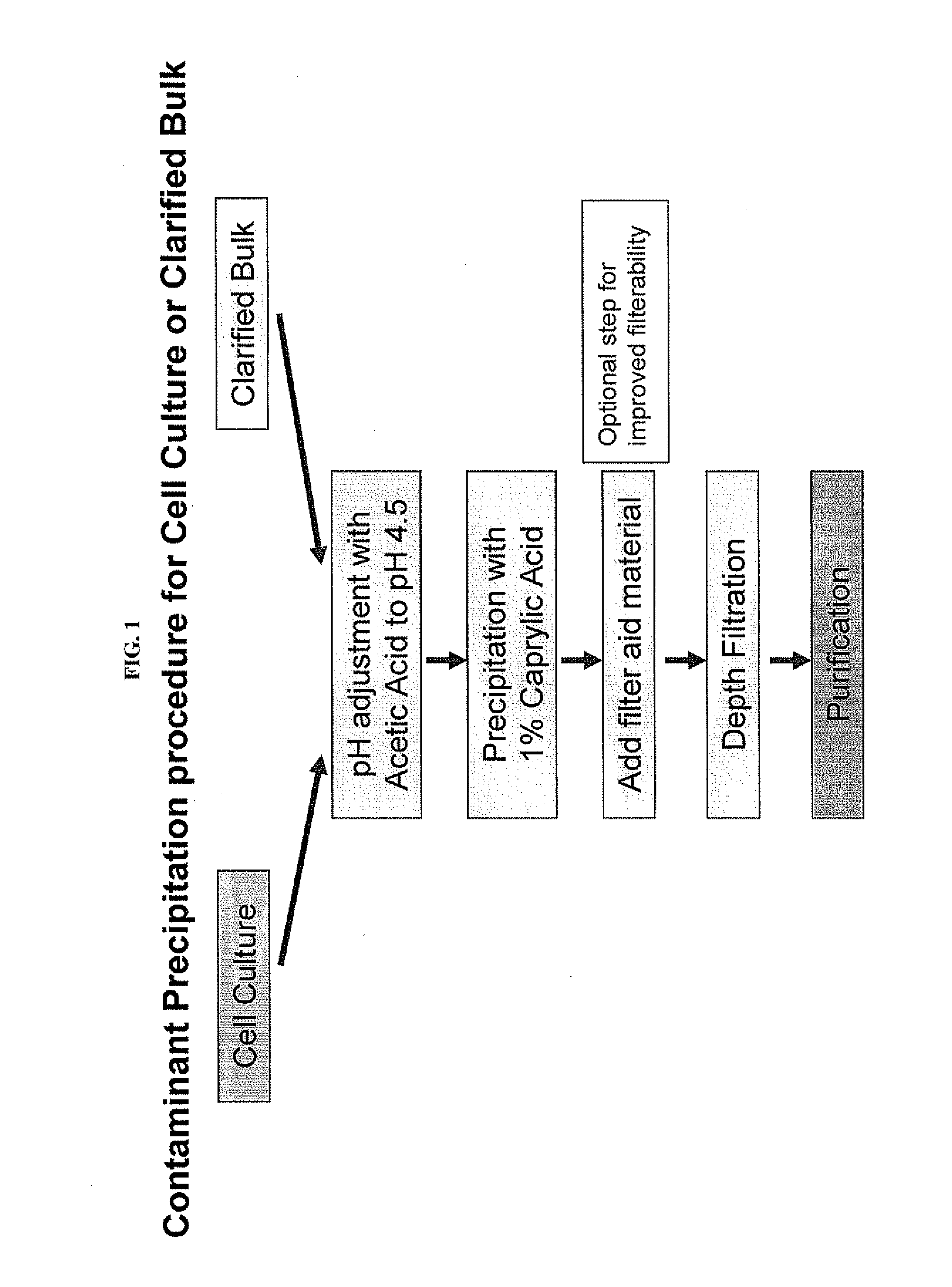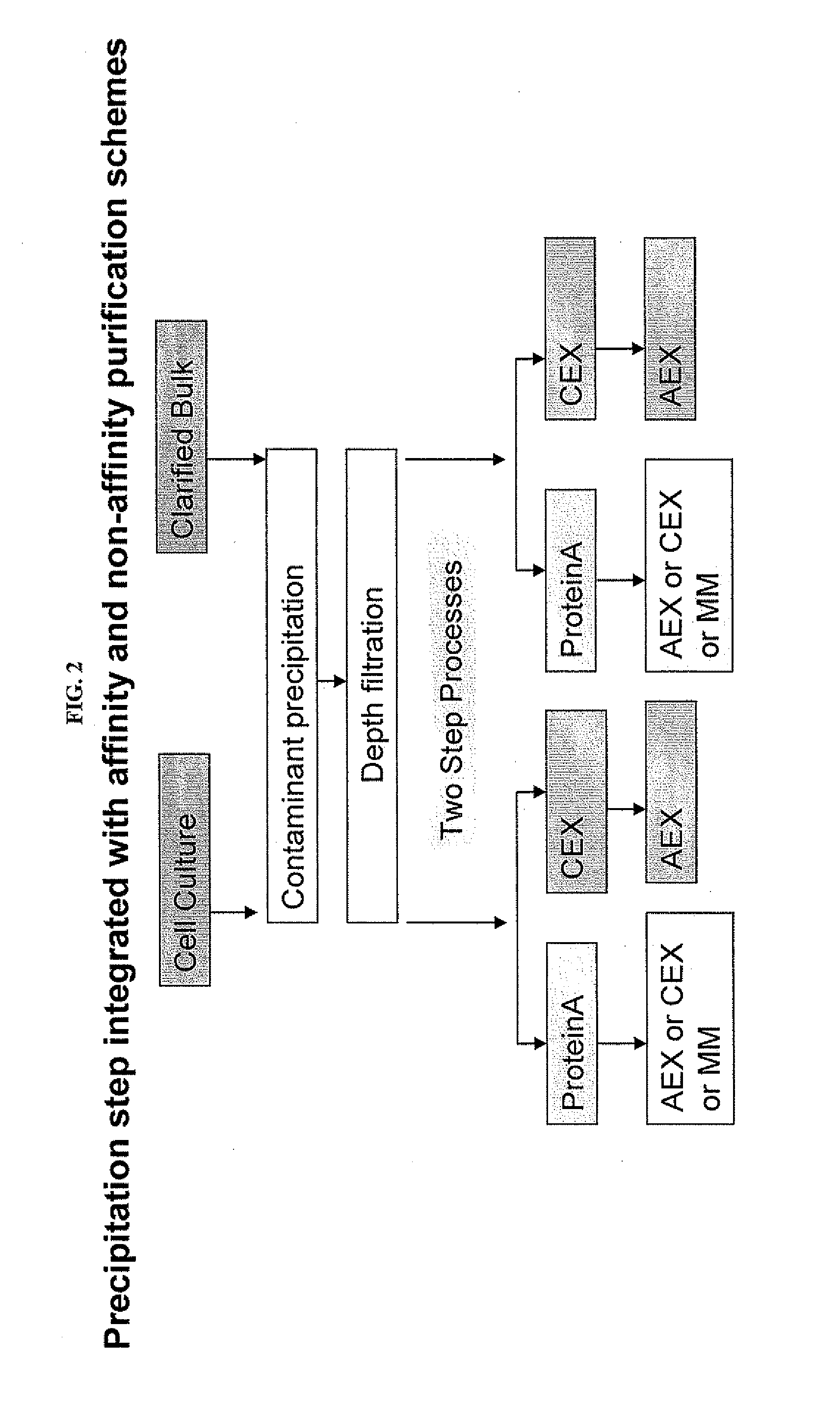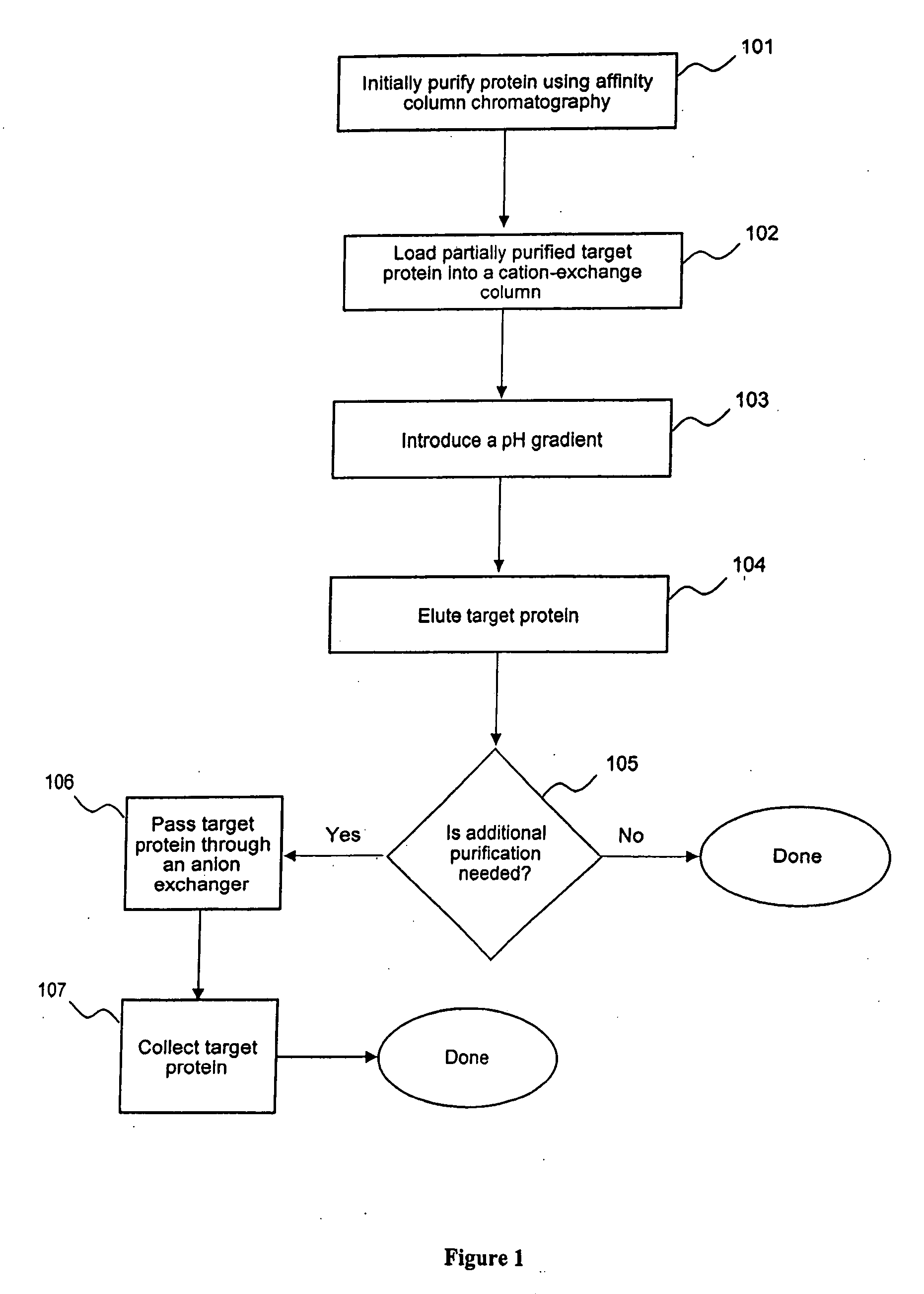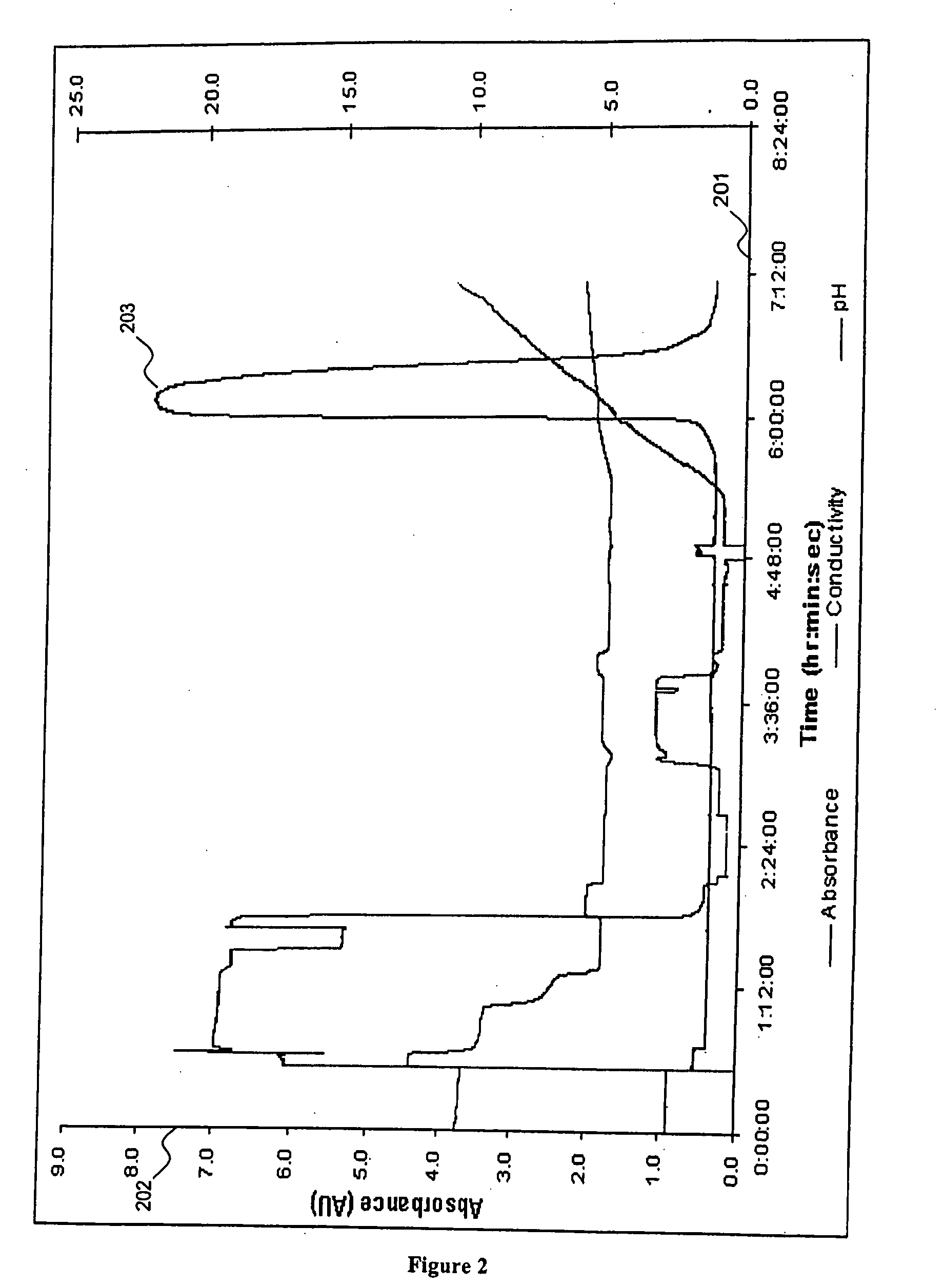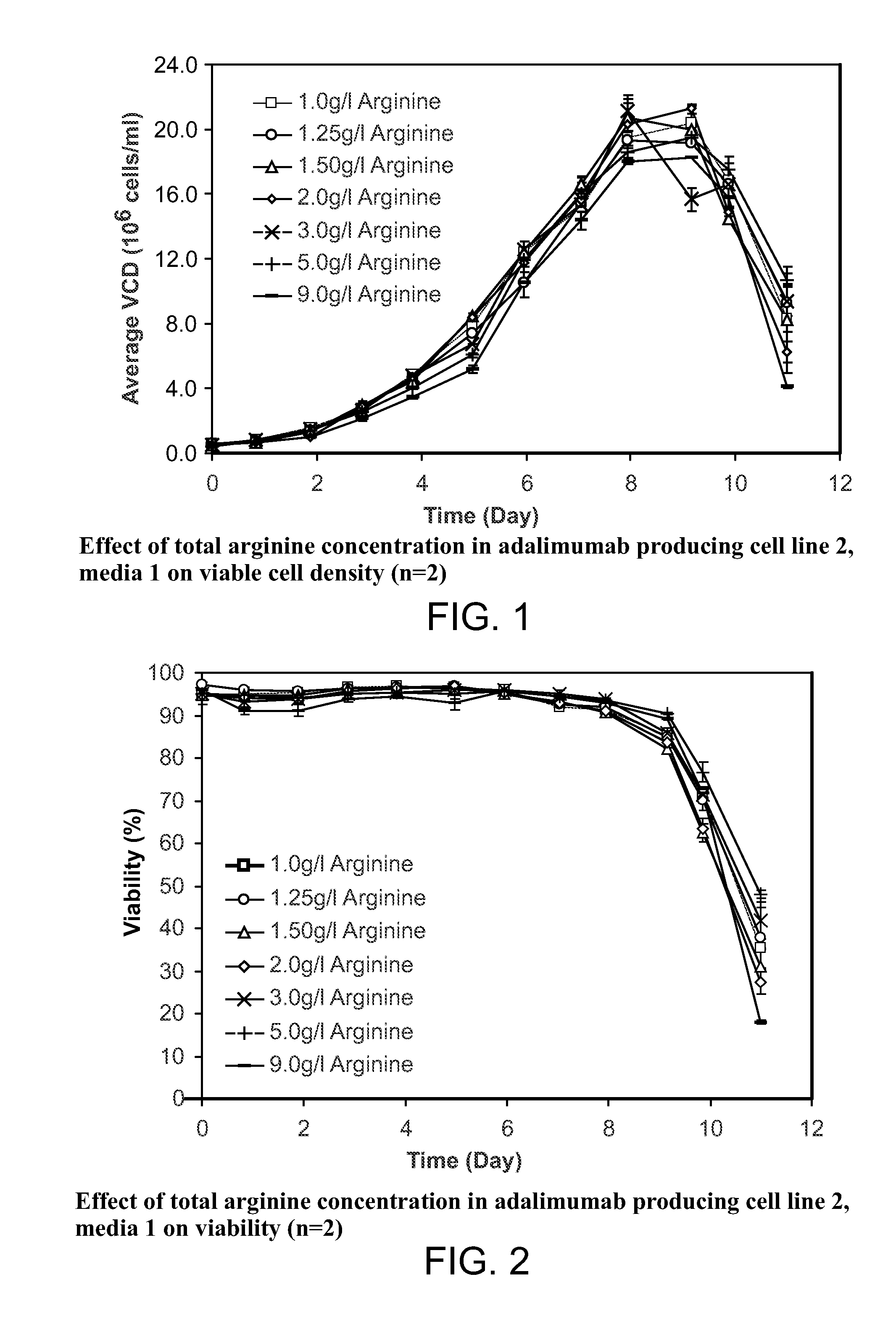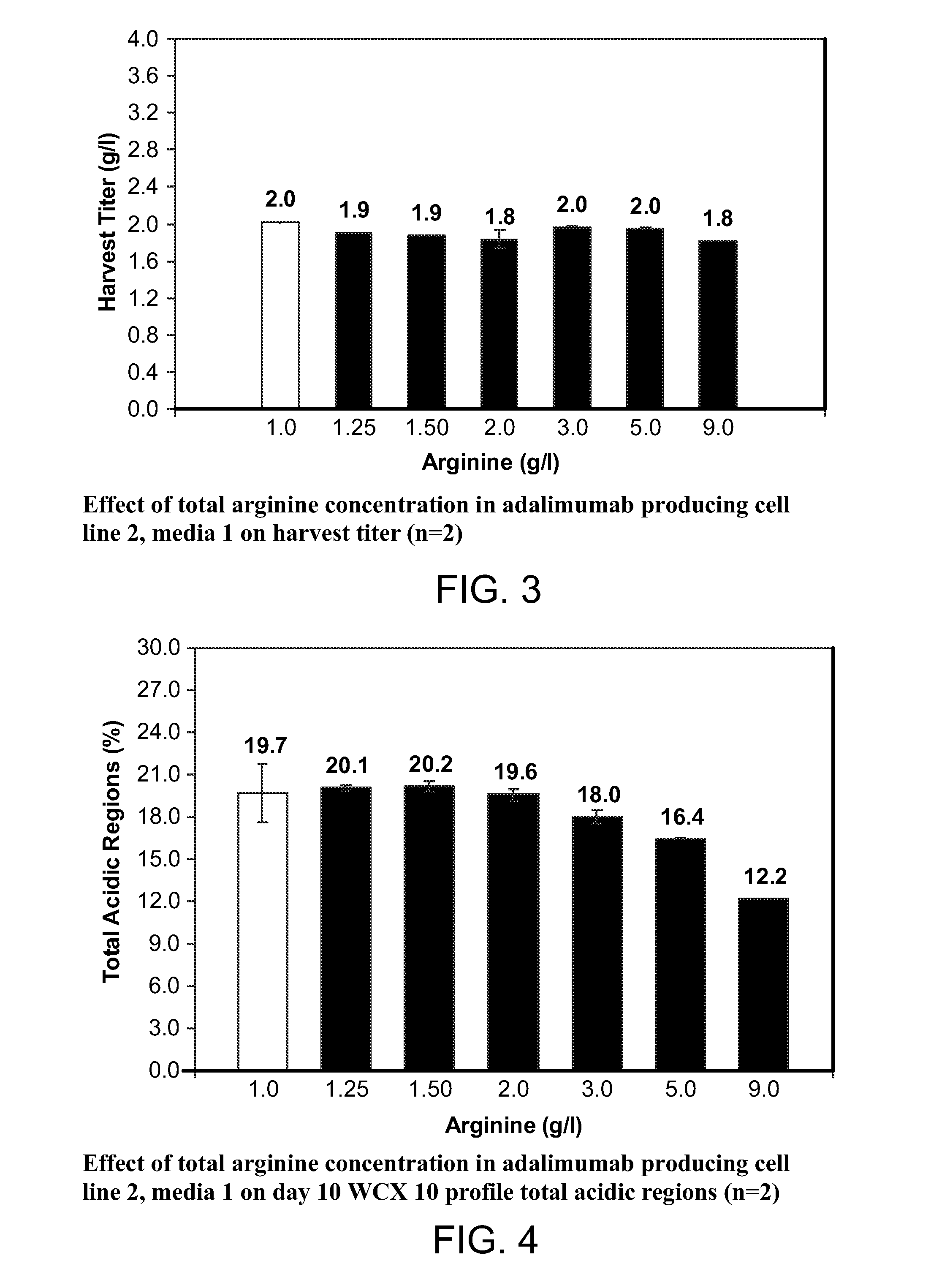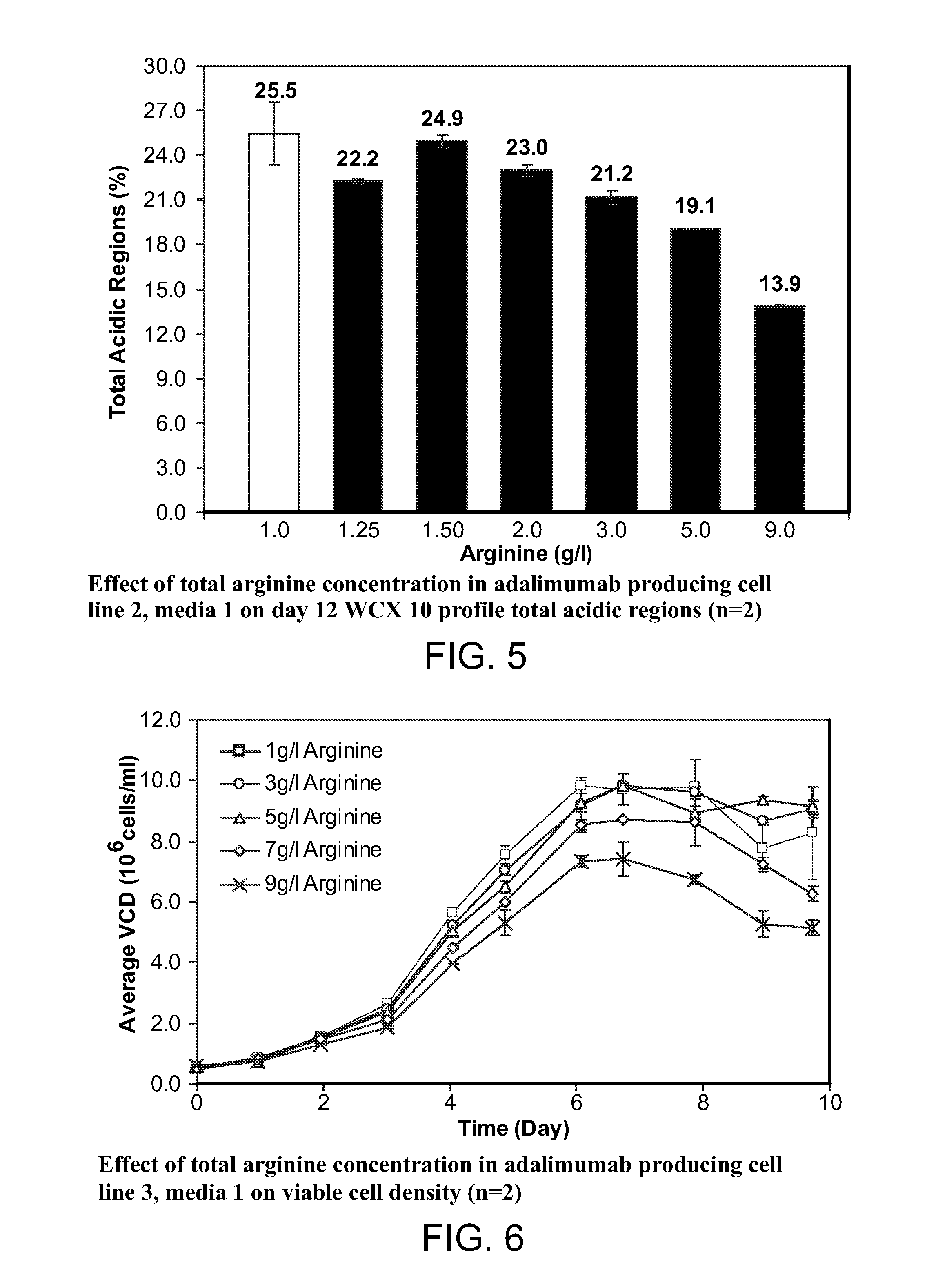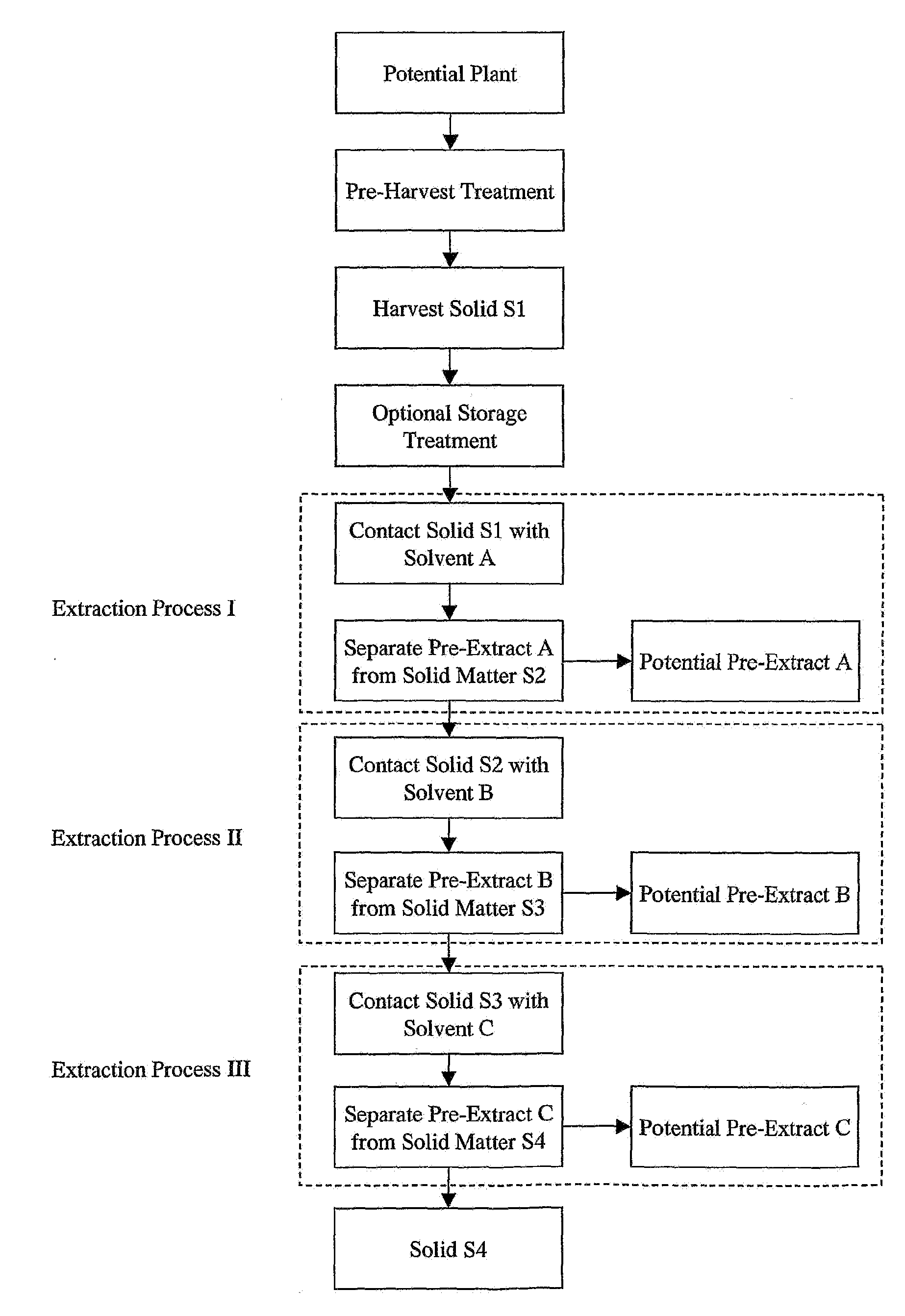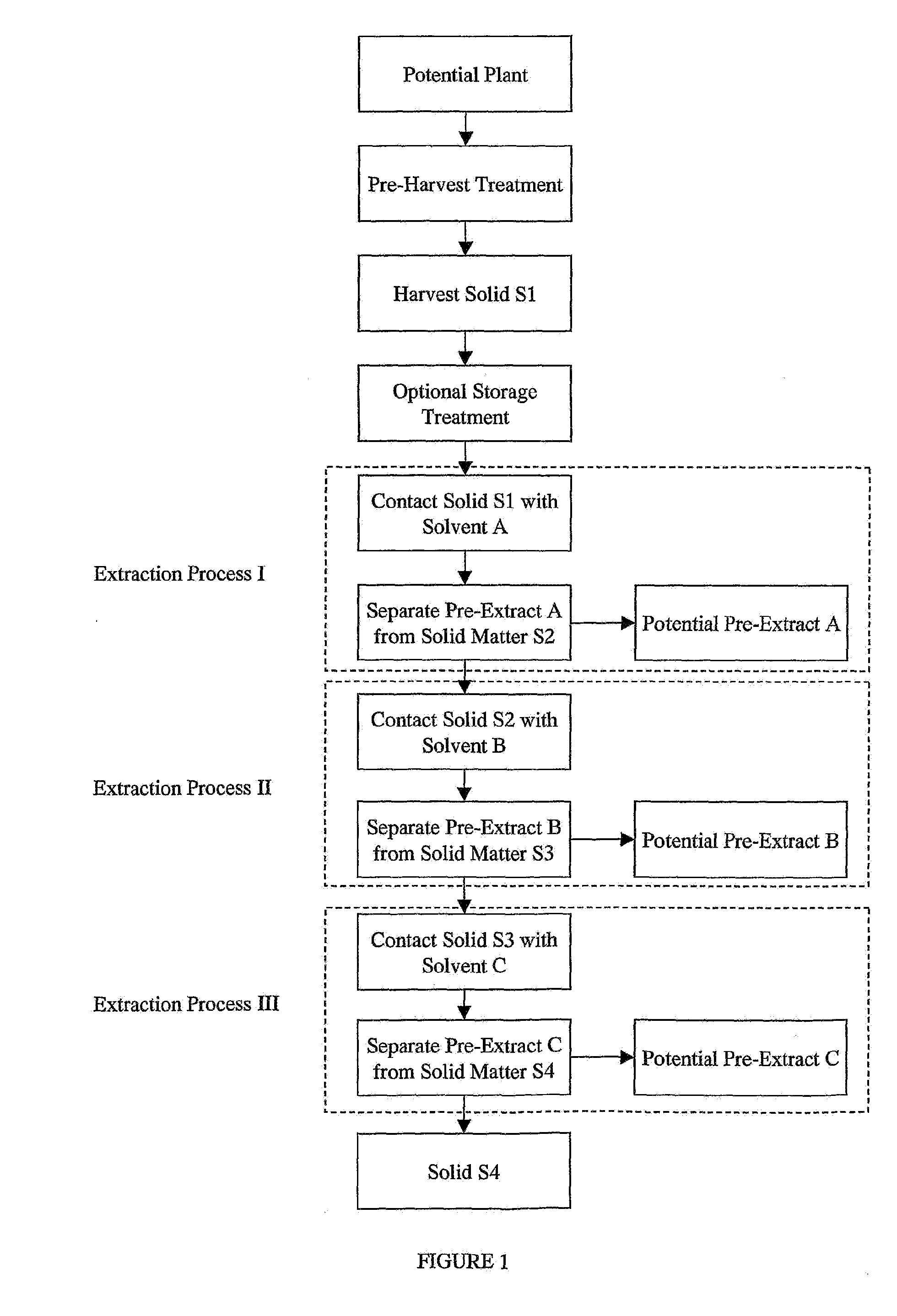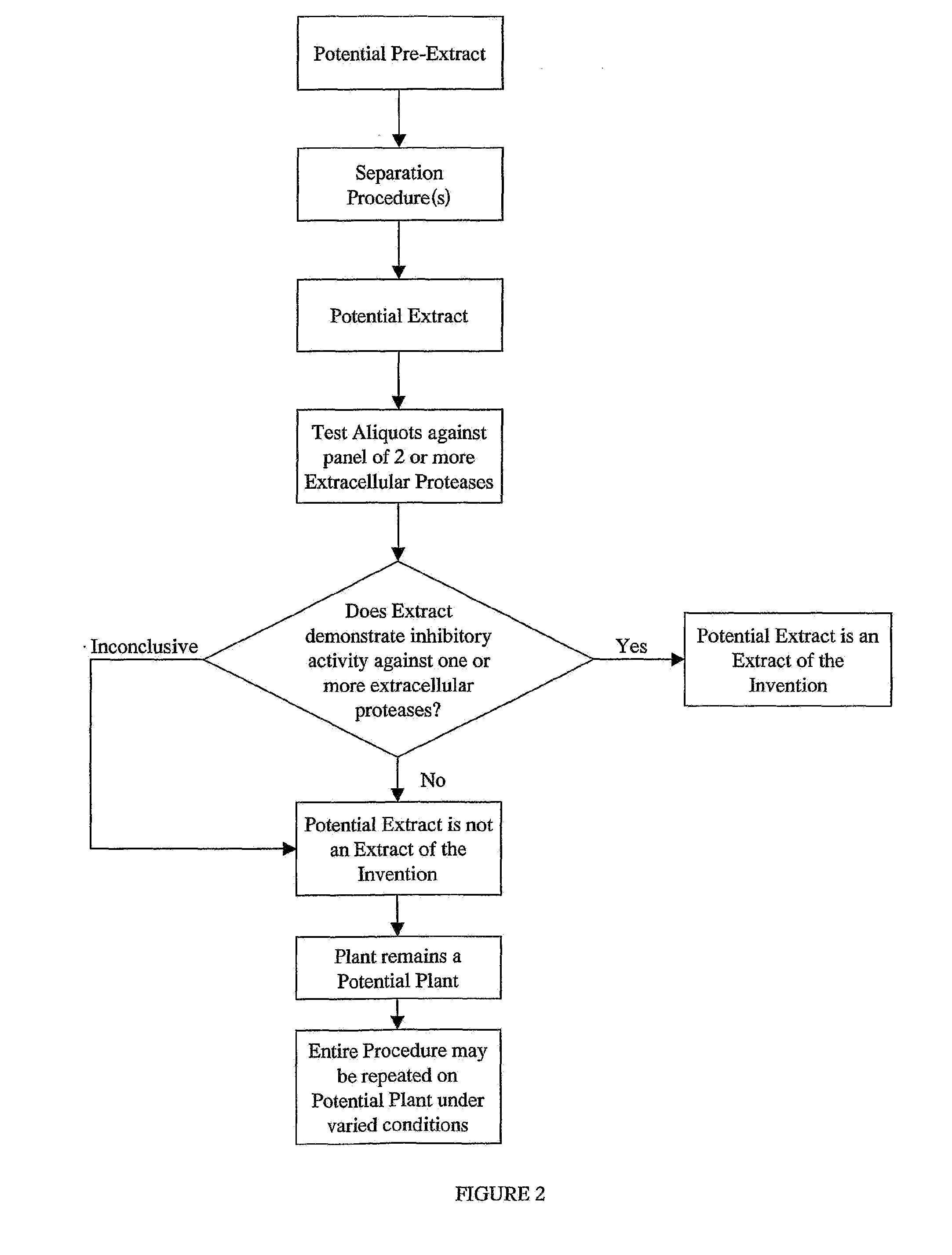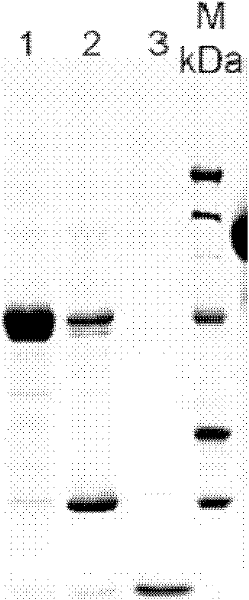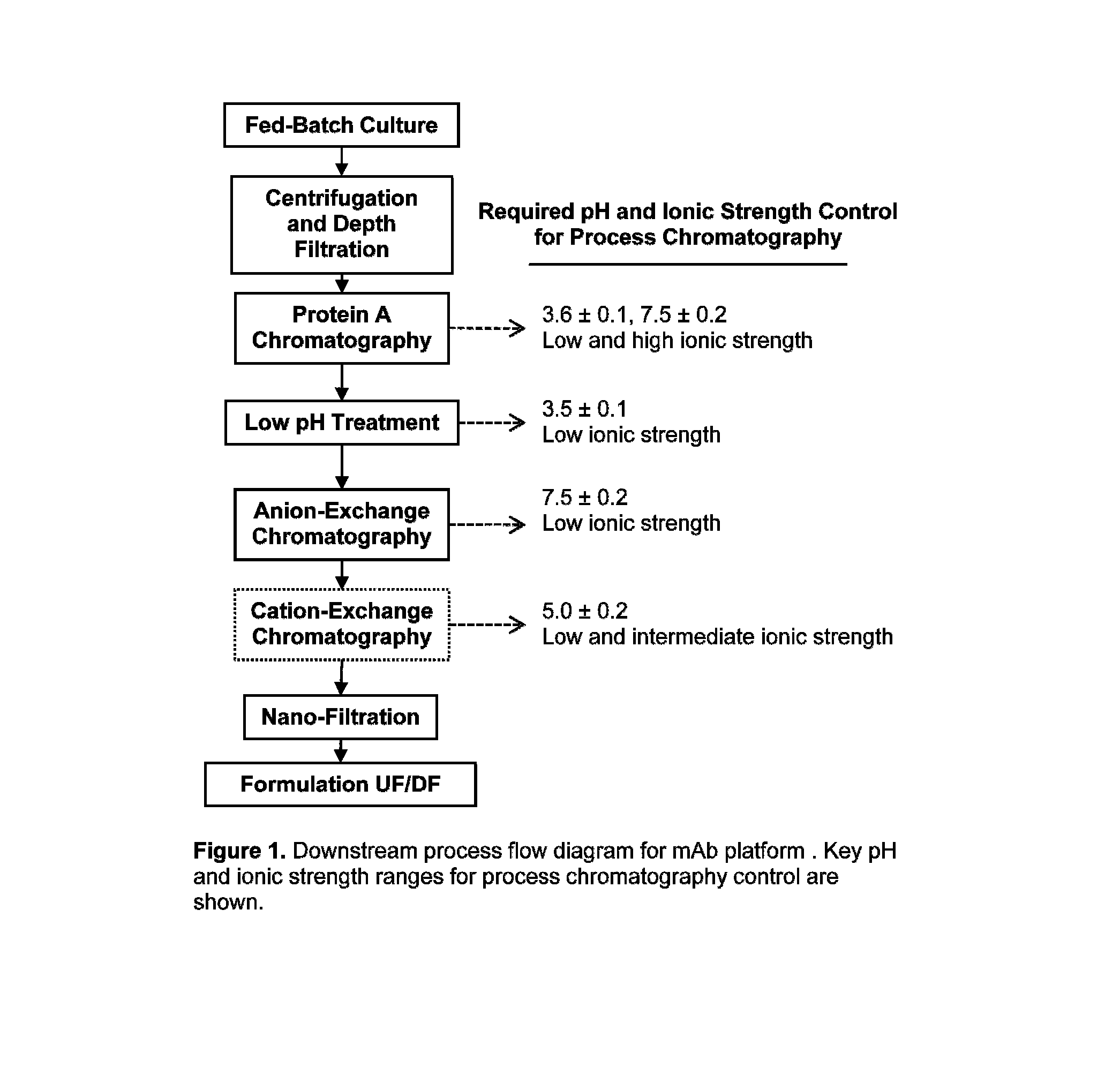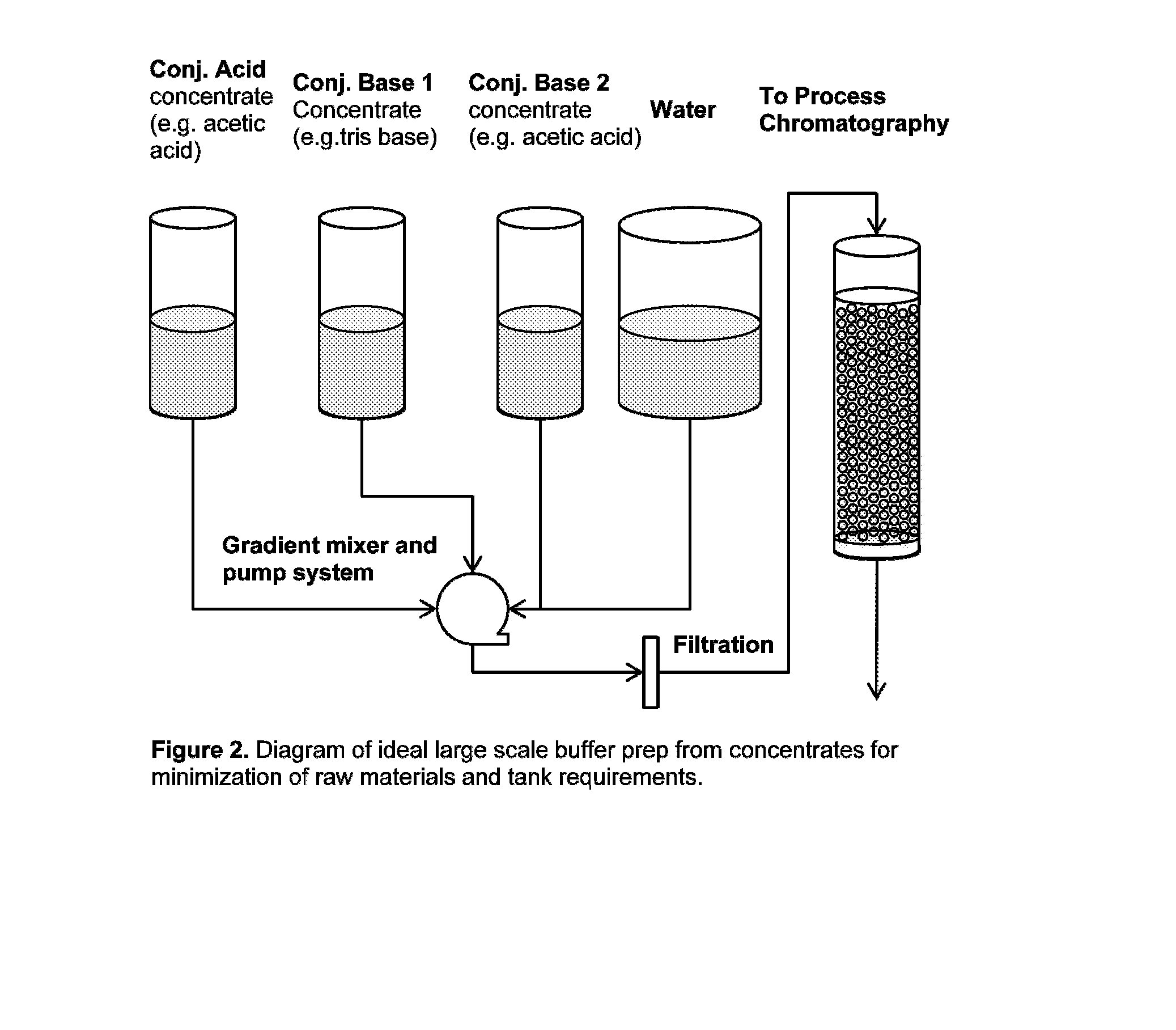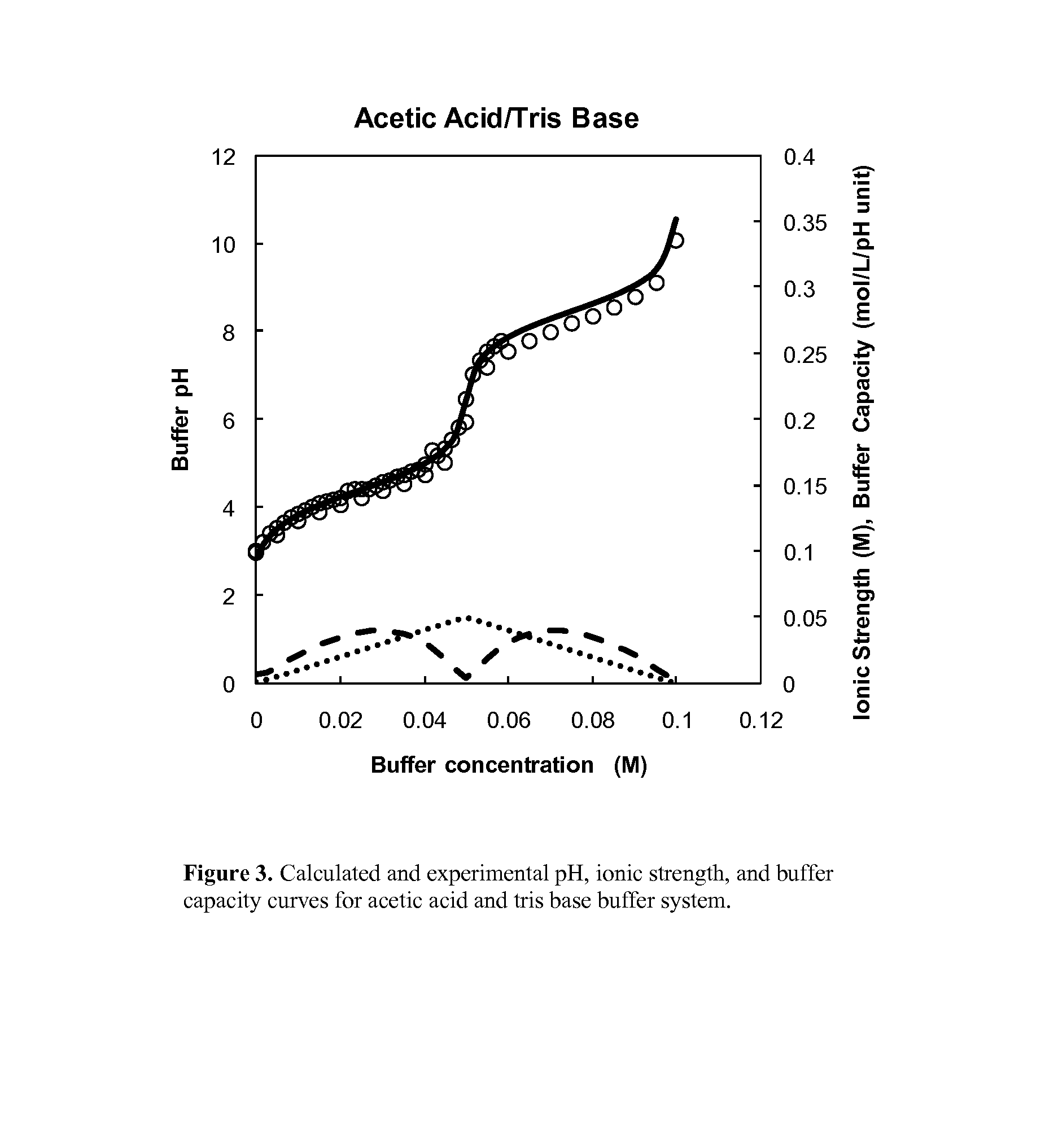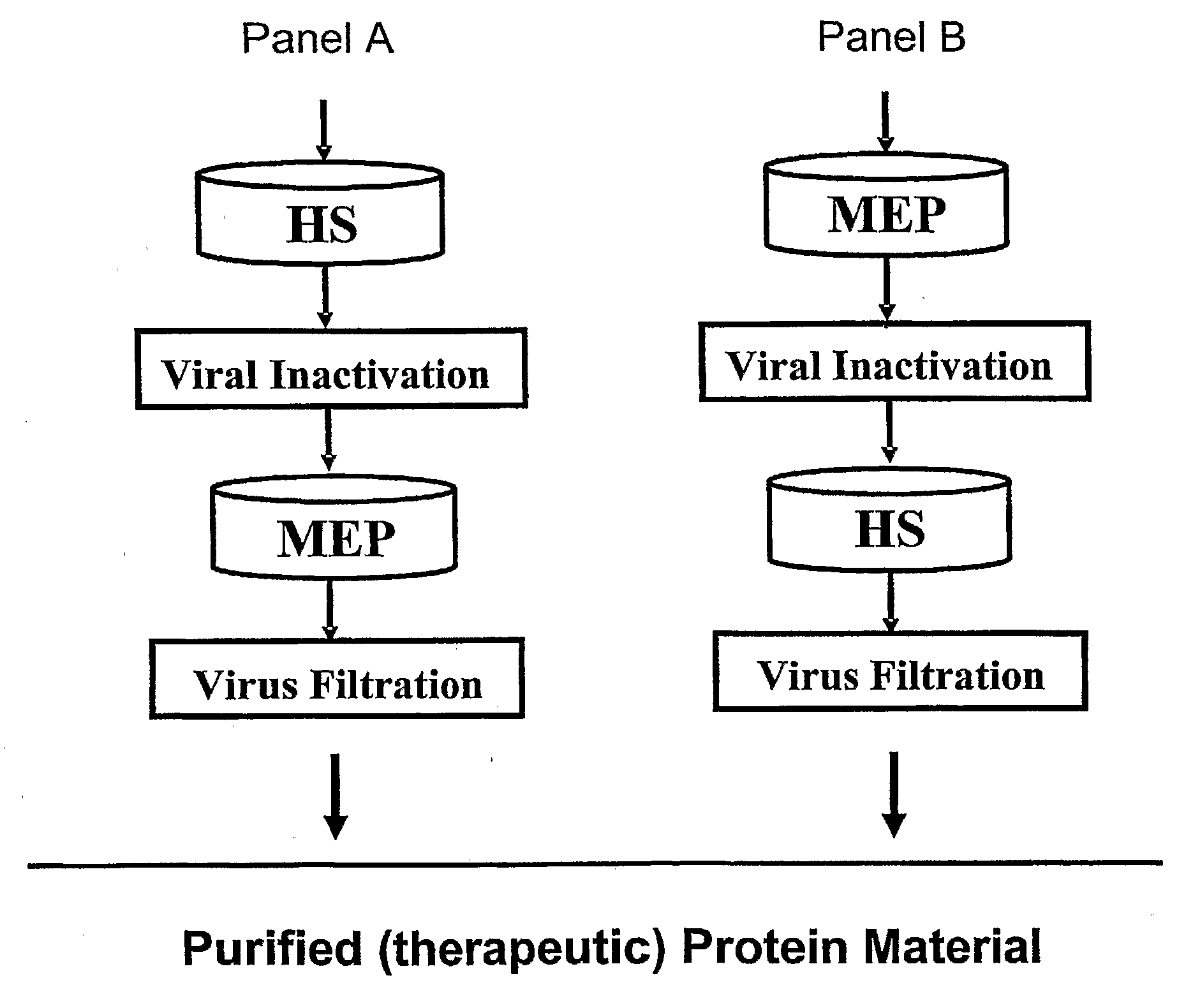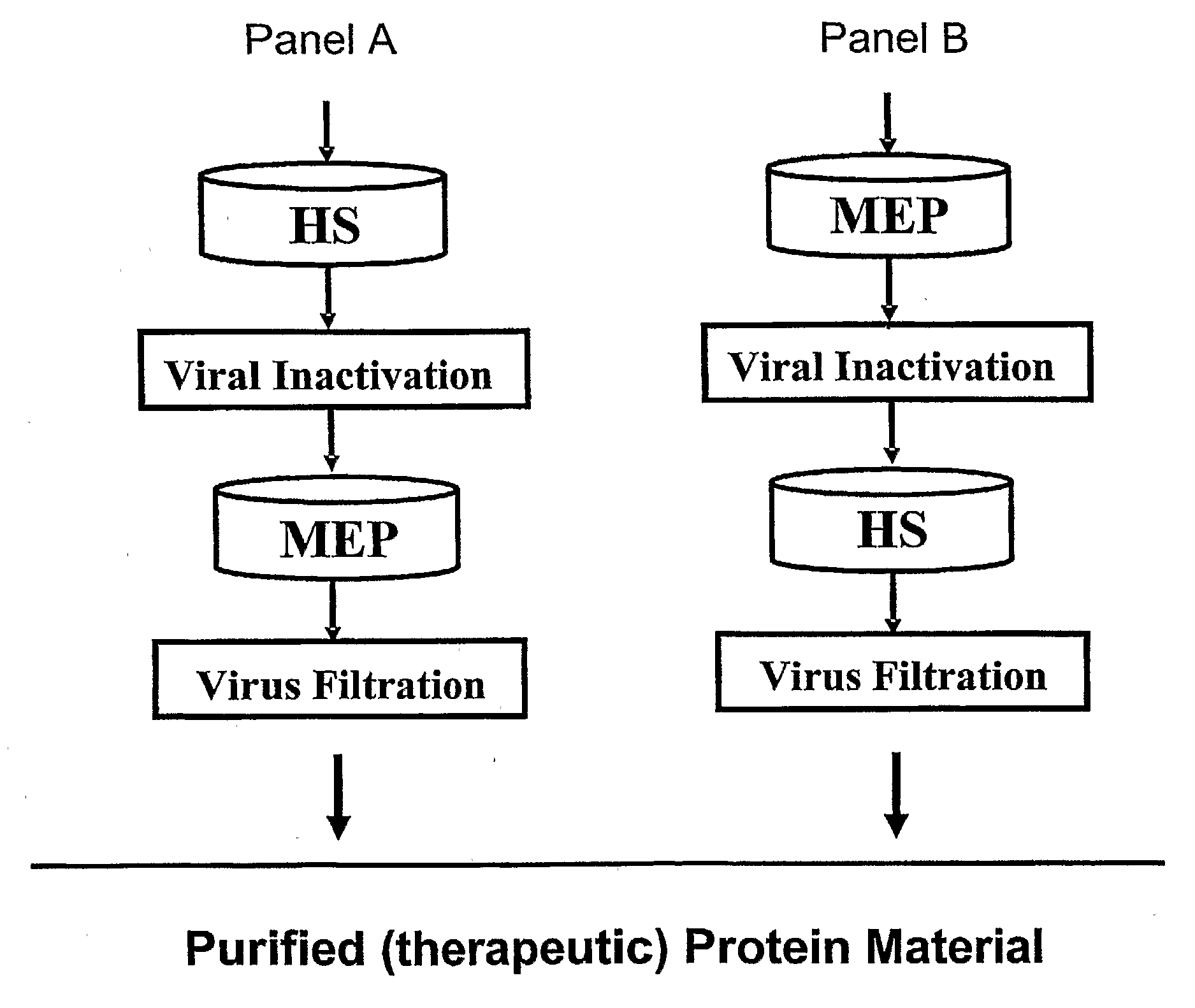Patents
Literature
751 results about "Protein purification" patented technology
Efficacy Topic
Property
Owner
Technical Advancement
Application Domain
Technology Topic
Technology Field Word
Patent Country/Region
Patent Type
Patent Status
Application Year
Inventor
Protein purification is a series of processes intended to isolate one or a few proteins from a complex mixture, usually cells, tissues or whole organisms. Protein purification is vital for the characterization of the function, structure and interactions of the protein of interest. The purification process may separate the protein and non-protein parts of the mixture, and finally separate the desired protein from all other proteins. Separation of one protein from all others is typically the most laborious aspect of protein purification. Separation steps usually exploit differences in protein size, physico-chemical properties, binding affinity and biological activity. The pure result may be termed protein isolate.
Protein purification
InactiveUS7074404B2High recovery ratePeptide/protein ingredientsSerum immunoglobulinsIon chromatographyMulti pollutant
A method for purifying a polypeptide by ion exchange chromatography is described which involves changing the conductivity and / or pH of buffers in order to resolve a polypeptide of interest from one or more contaminants.
Owner:GENENTECH INC
Non-affinity purification of proteins
InactiveUS7323553B2Chromatographic cation exchangersOther chemical processesProtein purificationAntibody Affinity Chromatography
The present invention relates to a method for protein purification that involves the combination of non-affinity chromatography with HPTFF.
Owner:GENENTECH INC
Method of preparing a chromatography matrix
ActiveUS7396467B2Increase pressureImprove rendering capabilitiesIon-exchange process apparatusSugar derivativesCross-linkAqueous solution
The present invention relates to a method of preparing a porous cross-linked polysaccharide chromatography matrix, which comprises to provide an aqueous solution of a gellable polysaccharide, wherein part of the hydroxyl groups are substituted with groups which are not susceptible to nucleophilic attack; to provide essentially spherical droplets of the substituted polysaccharide solution; to form a gel of the substituted polysaccharide solution; and to cross-link the gel by adding a cross-linking agent. The invention also encompasses a chromatography column packed with a matrix so produced as well as use thereof in e.g. protein purification.
Owner:CYTIVA BIOPROCESS R&D AB
Protein purification methods to reduce acidic species
ActiveUS20130338344A1Reduce the amount requiredImmunoglobulins against cytokines/lymphokines/interferonsPeptide preparation methodsPurification methodsProtein purification
The instant invention relates to the field of protein production and purification, and in particular to compositions and processes for controlling the amount of charge variants, aggregates, and fragments of a protein of interest, as well as host cell proteins, present in purified preparations by applying particular chromatography conditions during such protein purification.
Owner:ABBVIE INC
Protein purification
InactiveUS20050063972A1High recovery ratePeptide/protein ingredientsSerum immunoglobulinsMulti pollutantIon exchange
A method for purifying a polypeptide by ion exchange chromatography is described which involves changing the conductivity and / or pH of buffers in order to resolve a polypeptide of interest from one or more contaminants.
Owner:GENENTECH INC
Low acidic species compositions and methods for producing and using the same
ActiveUS20150110799A1Immunoglobulins against cytokines/lymphokines/interferonsAntibody ingredientsAntigen bindingAcid substances
The instant invention relates to low acidic species (AR) compositions comprising a protein, e.g., an antibody, or antigen-binding portion thereof, and methods, e.g., cell culture and / or protein purification methods, for producing such low AR compositions. Methods for using such compositions to treat a disorder, e.g., a disorder in which TNFα is detrimental, are also provided.
Owner:ABBVIE INC
Genetic system and self-cleaving inteins derived therefrom, bioseparations and protein purification employing same, and methods for determining critical, generalizable amino acid residues for varying intein activity
A self-cleaving element for use in bioseparations has been derived from a naturally occurring, 43 kDa protein splicing element (intein) through a combination of protein engineering and random mutagenesis. A mini-intein (18 kDa) previously engineered for reduced size had compromised activity and was therefore subjected to random mutagenesis and genetic selection. In one selection a mini-intein was isolated with restored splicing activity, while in another, a mutant was isolated with enhanced, pH-sensitive C-terminal cleavage activity. The enhanced cleavage mutant has utility in affinity fusion-based protein purification. The enhanced splicing mutant has utility in purification of proteins such as toxic proteins, for example, by inactivation with the intein in a specific region and controllable splicing. These mutants also provide new insights into the structural and functional roles of some conserved residues in protein splicing. Thus, disclosed and claimed are: a genetic system and self-cleaving inteins therefrom; bioseparations employing same; protein purification by inactivation with inteins in specific regions and controllable intein splicing; methods for determining critical, generalizable residues for varying intein activity; and products.
Owner:RENESSELAER POLYTECHNIC INST +1
Methods For Purifying A Target Protein From One or More Impurities In A Sample
ActiveUS20110065901A1Eliminate needIon-exchange process apparatusIon-exchanger regenerationProtein targetHolding tank
The present invention relates, at least in part, to improved methods of protein purification. In particular, the present invention relates, at least in part, to methods for purifying an Fc region containing protein from a composition comprising the Fc region containing protein and one or more impurities, where the methods eliminate the need for a holding tank and / or a buffer exchange step.
Owner:MILLIPORE CORP
Protein purification using displacement chromatography
ActiveUS9067990B2Easy to identifyImmunoglobulins against cytokines/lymphokines/interferonsPeptide preparation methodsDisplacement chromatographyProtein purification
Owner:ABBVIE INC
Protein purification
InactiveUS20120065381A1Improve conductivityCation exchanger materialsOrganic anion exchangersIon chromatographyMulti pollutant
A method for purifying a polypeptide by ion exchange chromatography is described in which a gradient wash is used to resolve a polypeptide of interest from one or more contaminants.
Owner:GENENTECH INC
Protein purification using displacement chromatography
ActiveUS20140275494A1Easy to identifyIon-exchange process apparatusIon-exchanger regenerationDisplacement chromatographyProtein purification
Owner:ABBVIE INC
Protein purification
ActiveUS8044017B2Improve conductivityPowder deliveryCation exchanger materialsIon chromatographyMulti pollutant
A method for purifying a polypeptide by ion exchange chromatography is described in which a gradient wash is used to resolve a polypeptide of interest from one or more contaminants.
Owner:GENENTECH INC
Protein purification
InactiveUS20050215769A1Serum immunoglobulinsImmunoglobulins against cytokines/lymphokines/interferonsProtein purificationSolid phases
A method for purifying proteins by Protein A chromatography is described which comprises removing contaminants by washing the solid phase with various intermediate wash buffers.
Owner:BREECE TIMOTHY +5
Methods for the production of purified recombinant human uteroglobin for the treatment of inflammatory and fibrotic conditions
The present invention relates generally to the production of recombinant human uteroglobin (rhUG) for use as a therapeutic in the treatment of inflammation and fibrotic diseases. More particularly, the invention provides processes, including broadly the steps of bacterial expression and protein purification, for the scaled-up production of rhUG according to current Good Manufacturing Practices (cGMP). The invention further provides analytical assays for evaluating the relative strength of in vivo biological activity of rhUG produced via the scaled-up cGMP processes.
Owner:CC10 SWEDEN +4
Protein appropriate for orientation-controlled immobilization and immobilization carrier on which the proteins are immobilized
InactiveUS20090299035A1Prepared efficiently and rapidlyFunction increasePeptide/protein ingredientsDepsipeptidesAcidic amino acidsIsoelectric point
An object of the present invention is to provide a novel protein having the following amino acid sequence altered for specifically and efficiently binding a protein to an immobilization carrier via the carboxy terminus. The protein is used for immobilizing a portion represented by R1-R2 on an immobilization carrier, comprising the amino acid sequence represented by the general formula R1-R2-R3-R4-R5 [wherein:the sequences are oriented from the amino terminal side to the carboxy terminal side;the sequence of the R1 portion is the sequence of a subject protein to be immobilized and contains neither a lysine residue nor a cysteine residue;the sequence of the R2 portion may be absent, but when the sequence of the R2 portion is present, the sequence of the R2 portion is a spacer sequence composed of amino acid residues other than lysine and cysteine residues;the sequence of the R3 portion is composed of two residues of amino acid represented by cysteine-X (where X denotes an amino acid residue other than lysine or cysteine);the sequence of the R4 portion may be absent, but when the sequence of the R4 portion is present, the sequence of the R4 portion contains neither a lysine residue nor a cysteine residue, but contains an acidic amino acid residue capable of acidifying the isoelectric point of the entire protein comprising the amino acid sequence represented by the general formula R1-R2-R3-R4-R5; andthe sequence of an R5 portion is an affinity tag sequence for protein purification.
Owner:NAT INST OF ADVANCED IND SCI & TECH
Protein purification
InactiveUS20120149878A1Reducing high molecular weight specie (HMW) formationReduces HMW formationPeptide preparation methodsDepsipeptidesGlycineOn column
Methods of reducing high molecular weight species (HMW) formation in a sample containing a protein purified using ion exchange (IEX) chromatography are disclosed, as are a number of related methods, e.g., methods of reducing on-column denaturation of a protein in a protein sample purified using an ion exchange (IEX) column or resin. The methods share characteristics of including arginine, glycine and / or histidine in the buffers used during the ion exchange (IEX) chromatography.
Owner:AMGEN INC
Modulated lysine variant species compositions and methods for producing and using the same
ActiveUS20150110775A1Good curative effectReduced cartilage destructionImmunoglobulins against cytokines/lymphokines/interferonsAntibody ingredientsAntigen bindingProtein purification
The instant invention relates to modulated lysine variant species compositions comprising a protein, e.g., an antibody, or antigen-binding portion thereof, and methods, e.g., cell culture and / or protein purification methods, for producing such modulated lysine variant species compositions. Methods for using such compositions to treat a disorder, e.g., a disorder in which TNFα is detrimental, are also provided.
Owner:ABBVIE INC
Methods of reducing level of one of more impurities in a sample during protein purification
ActiveUS20130197200A1Reduce the burden onExtend your lifeChromatographic cation exchangersIon-exchange column/bed processesProtein purificationImpurity
Owner:MILLIPORE CORP
Intein-mediated protein purification using in vivo expression of an aggregator protein
InactiveUS20060141570A1Function increaseSuitable for high through-put screeningSugar derivativesBacteriaInteinADAMTS Proteins
Purification of recombinant proteins is performed by expressing in a host cell a fusion protein comprising: (a) a product protein domain, (b) an intein, and (c) at least one aggregator protein domain, wherein the aggregator protein domain comprises a protein that is capable of specific association with granules of polyhydroxyalkanoate (PHA).
Owner:TRUSTEES OF DARTMOUTH COLLEGE THE +1
Arginine derivative wash in protein purification using affinity chromatography
ActiveUS7714111B2Reduce turbidityRaise the ratioDepsipeptidesPeptide preparation methodsArginineElution
The invention relates to methods for isolating a product and / or reducing turbidity and / or impurities from a load fluid comprising the product and one or more impurities by passing the load fluid through a medium, followed by at least one wash solution comprising an arginine derivative, and collecting the product using an elution solution. The invention further relates to a product prepared using a method as described herein.
Owner:WYETH LLC
Methods for protein purification using aqueous two-phase extraction
Methods are provided in this invention for the isolation of human growth hormone, growth hormone antagonist, or a homologue of either, from a biological source. The methods of the invention use multi-phase extraction.
Owner:NV ORGANON +1
ELISA kit for detecting EPSPS gene in herbicide-tolerance soybeans and method of use thereof
This invention discloses one EPSPS gene enzyme immune agent case and its use method in the anti-herbicide bean, wherein, the case comprises anti-EPSPS multi-clone antigen, enzyme board with the antigen, enzyme antigens for two, gene switch bean standard product, non-transfer gene bean standard, intense wash liquid, develop liquid and terminal liquid. This invention method comprises the following steps: cloning CP4-EPSPS gene from the gene switch bean expressed in the bacillus coli; then through protein purification complex property to regroup EPSPS protein antibody immune animal to get special single clone antigen and multi-clone antigen; establishing double antigen clamp enzyme immune system test sample to determine its EPSPS protein content.
Owner:SOUTH CHINA AGRI UNIV
Protein purification by caprylic acid (octanoic acid) precipitation
InactiveUS20120101262A1Efficient purificationPeptide preparation methodsDepsipeptidesTherapeutic proteinMulti pollutant
The invention provides methods for a purifying protein of interest from a mixture comprising the protein of interest and one or more contaminants, including host cell DNA and proteins, by precipitation of the contaminants with caprylic acid. Such methods are particularly useful for purifying antibodies from cell cultures. Moreover, mixtures that have been depleted of contaminants using the methods of the invention can be used directly in downstream chromatography applications (e.g., ion exchange chromatography) without any further purification. These methods lead to manufacturing processes with a minimum number of unit operations and reduce the resource requirements, and thus positively influence the cost of goods for therapeutic protein production.
Owner:BRISTOL MYERS SQUIBB CO
Polishing steps used in multi-step protein purification processes
ActiveUS20070167612A1Component separationSolid sorbent liquid separationFiltrationProtein purification
Various embodiments of the present invention are directed to multi-step systems and methods for target-molecule purification that employ column-chromatography-based and / or membrane-filtration-based polishing steps. In one described embodiment of the present invention, a target-protein-containing eluate having a high residual salt concentration is collected from a first chromatography column prepared with an affinity-chromatography resin, loaded onto a second chromatography column prepared with a cation-exchange resin, and eluted from the second cation-exchange column using a buffer in which a time-dependent pH gradient is established. In another described embodiment of the present invention, a partially purified target-protein-containing eluate is collected from a chromatography column and further purified by passing the target-protein-containing eluate through a salt-tolerant anion exchanger.
Owner:AMGEN INC
Protein purification method
InactiveUS20080255342A1Efficient removalReduce conductivityImmunoglobulins against cell receptors/antigens/surface-determinantsPeptide preparation methodsActive proteinAqueous solution
A method for removing contaminant DNA in a sample containing a physiologically active protein, which comprises the following steps:1) converting the sample containing a physiologically active protein into a neutral aqueous solution of low conductivity; and2) removing the resulting particles.
Owner:CHUGAI PHARMA CO LTD
Low acidic species compositions and methods for producing and using the same
ActiveUS20150132801A1Immunoglobulins against cytokines/lymphokines/interferonsAntibody ingredientsAntigen bindingProtein purification
The instant invention relates to low acidic species (AR) compositions comprising a protein, e.g., an antibody, or antigen-binding portion thereof, and methods, e.g., cell culture and / or protein purification methods, for producing such low AR compositions. Methods for using such compositions to treat a disorder, e.g., a disorder in which TNFα is detrimental, are also provided.
Owner:ABBVIE INC
Inhibitors of extracellular proteases
InactiveUS20110217753A1Minimize degradationImprove fractionationCosmetic preparationsOther chemical processesExtracellular proteinsProtein purification
Provided is a plant derived extract including inhibitory activity against one or more extracellular proteases which degrade human tissue matrix. Moreover, the amount of inhibitory activity in an extract can be increased by stressing the plant prior to forming an extract. These extracts are each prepared by a process and demonstrate the ability to inhibit one or more extracellular proteases which degrade human tissue matrix. Libraries of extracts can be prepared from stressed and non-stressed plants, where each of the extracts demonstrate inhibitory activity against on or more extracellular protease inhibitors. Alternatively, semi-purified and purified inhibitory compounds can be isolated from the extracts. In one aspect, these extracts with inhibitory activity can be used during protein purification to minimize degradation due to extracellular proteases.
Owner:BIOPHARMACOPAE DESIGN INT
Method for purifying protein of enzyme aggregate based on self-aggregation short-peptide induction
ActiveCN102226172AHigh purityOvercoming Application BottlenecksHydrolasesMicroorganism based processesProtein targetIntein
The invention provides a method for purifying protein of enzyme aggregate based on self-aggregation short-peptide induction. The method comprises the following steps of: fusing and expressing a target protein, a peptide section (preferably intein) containing a cleavage site and a short peptide with self-aggregation function into a triplet in a sequence from left to right or from right to left, forming an enzyme aggregate in an expressing process, and separating from most soluble impurities in cell lysate by adopting a centrifuging or filtering method; and then releasing the target protein into solution by inducing cutting at a cleavage site so as to achieve the purpose of purification. The method has the characteristics of low cost and simple flow, can be used for laboratory-scale high-throughput protein purification and is also beneficial to industrial-scale protein production.
Owner:TSINGHUA UNIV
Buffer system for protein purification
ActiveUS20140018525A1Remove pollutantsImprove impact performanceSolid sorbent liquid separationPeptide preparation methodsProtein purificationProtein
The invention is directed to a method for producing a polypeptide composition comprising: combining a polypeptide with a volatile additive to form a liquid mixture and lyophilizing the liquid mixture to obtain a lyophilized polypeptide composition.
Owner:GLAXOSMITHKLINE INTPROP DEV LTD
Protein Purification Using HCIC and Ion Exchange Chromatography
ActiveUS20090105465A1Low costHigh level of proteinImmunoglobulins against cell receptors/antigens/surface-determinantsPeptide preparation methodsFiltrationIon exchange
The present invention provides methods for purifying proteins. In particular, the methods employ a two-step non-affinity chromatography process without the use of an in-process tangential flow filtration step.
Owner:MEDAREX LLC
Features
- R&D
- Intellectual Property
- Life Sciences
- Materials
- Tech Scout
Why Patsnap Eureka
- Unparalleled Data Quality
- Higher Quality Content
- 60% Fewer Hallucinations
Social media
Patsnap Eureka Blog
Learn More Browse by: Latest US Patents, China's latest patents, Technical Efficacy Thesaurus, Application Domain, Technology Topic, Popular Technical Reports.
© 2025 PatSnap. All rights reserved.Legal|Privacy policy|Modern Slavery Act Transparency Statement|Sitemap|About US| Contact US: help@patsnap.com
